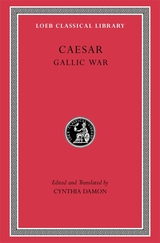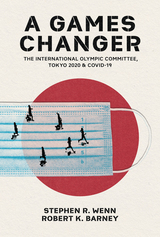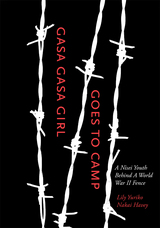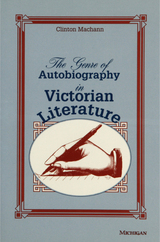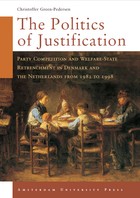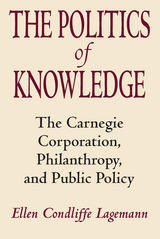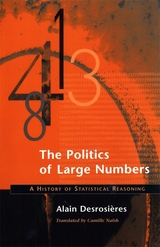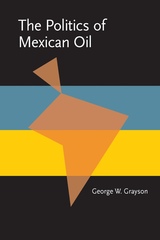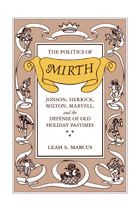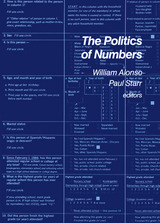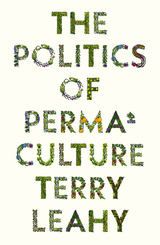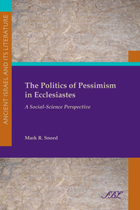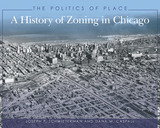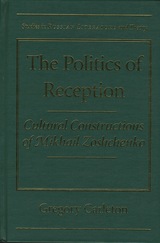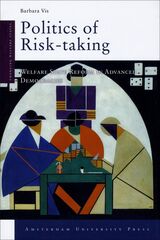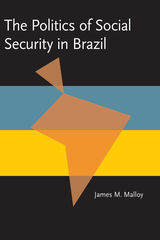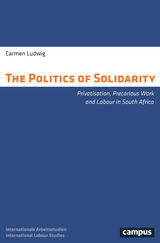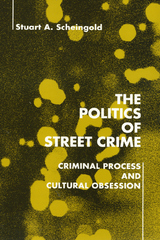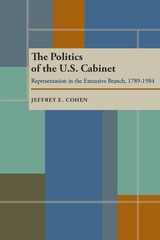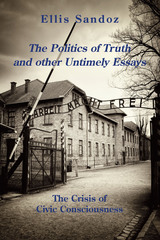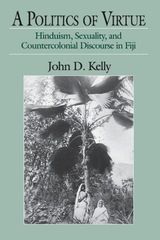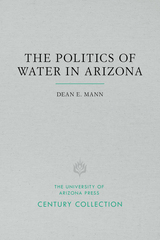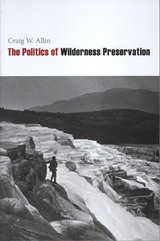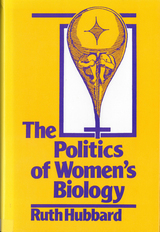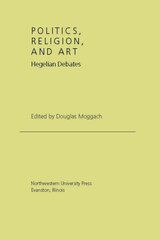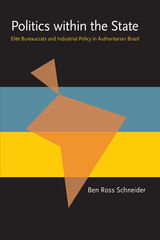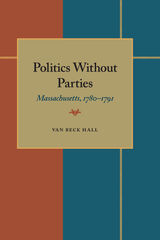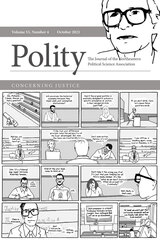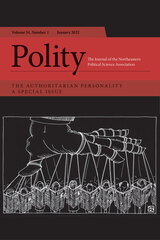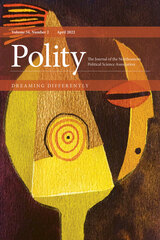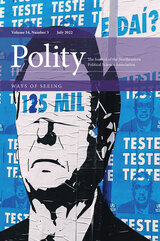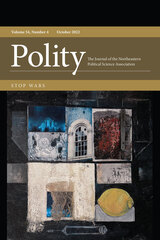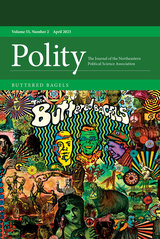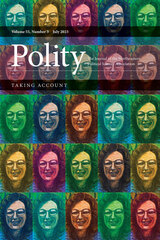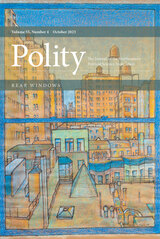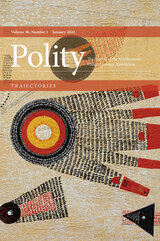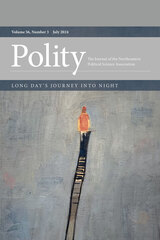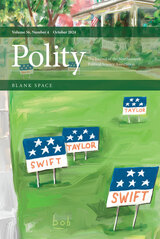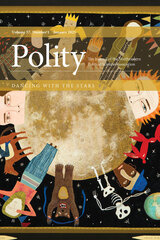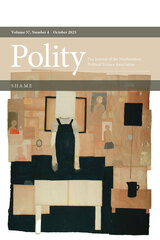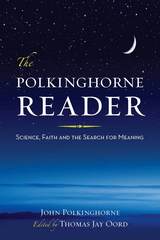 The Politics of Globalization in the United States
Edward S. Cohen
Georgetown University Press, 2001 From the conflicts over the North American Free Trade Agreement (NAFTA) and the World Trade Organization to concern over illegal immigration and debates over the official status of the English language, politicians and citizens have been reconsidering fundamental questions about American society’s role in a changing global arena. Applying concepts derived from the study of international and comparative politics, Edward S. Cohen offers a systematic analysis of the impact of globalization on United States domestic politics. Focusing on the obvious issue of trade and the less obvious areas of immigration and language policy, Cohen demonstrates that globalization is both the cause and result of a new relationship between the government, corporations, and citizens within the United States. Globalization has led to the formation of new political divisions and coalitions and has caused deepening conflicts over the purposes and goals of American politics. The outcome of these conflicts, Cohen argues, will determine the future of American political life. Showing that globalization has transformed the priorities and responsibilities of sovereign states rather than hastening their demise, the book will interest politicians, policymakers, and students looking for a discussion of globalization that is grounded in the recent political history of the United States.
 The Politics of Hallowed Ground: Wounded Knee and the Struggle for Indian Sovereignty
Mario Gonzalez and Elizabeth Cook-Lynn
University of Illinois Press, 1999 Inside the Sioux Nation's pursuit of recognition and justice This book is the powerful story of the ongoing struggle of indigenous Americans in the twentieth century United States and of its shift in focus from traditional battlefield and massacre sites to federal courtrooms and the halls of Congress. The Politics of Hallowed Ground includes excerpts from the diary kept by Mario Gonzalez, the attorney for the Sioux Nation in its struggle for recognition of the Wounded Knee Massacre site as a national monument. Gonzalez's personal record of the struggle is coupled with commentary by Elizabeth Cook-Lynn, a Native American writer who places the work in its historical context. Together, the two voices will draw the reader into far more than the continuing struggle of the Sioux people to achieve justice. The book covers Sioux history from before the Wounded Knee tragedy to modern times, through the Sioux Nation's long and often rancorous dialogue with the U.S. government over control of South Dakota's Black Hills, traditional Sioux lands recognized by treaty in 1877 and never forfeited or sold. After reading a 13-year-old survivor's narrative of what happened at Wounded Knee and the list of the dead and wounded, readers will find it difficult not to share the Sioux perspective.
 The Politics of Hate: How the Christian Right Darkened America's Political Soul
Angelia R. Wilson
Temple University Press, 2025 Christian Right organizations have darkened America’s political soul by strategically constructing a theological justification for hate. Angelia Wilson supports this claim in The Politics of Hate by detailing how Christian Right organizations have pushed voters toward polarization and primed religious conservatives to support Donald Trump.
Based on original research, participant observation at events, and data collection, Wilson follows the money to provide a meticulous analysis of how Christian Right political elites operate. She traces the evolutionary development of the Christian Right’s political professionalism and their allegiance to a grand vision that articulates a grammar of war to fulfill their Biblical worldview.
The Politics of Hate demonstrates how Christian Right organizations educate and train networks of soldiers to tactically engage the enemy in local, state, and national legal and political battles. Wilson carefully documents their history of co-belligerency, their strategies of political warfare, and, importantly, the impact of this war that has, over the past fifty years, forever changed American politics.
The Politics of Hazardous Waste Management
James P. Lester and Ann O M. Bowman, eds.
Duke University Press, 1983 One of the most critical areas of environmental controls is the regulation and management of hazardous wastes. This book examines the political context in which policy and management decisions in this are are made (state and federal, public and private), discusses implementation of the current policy mandate (the Resource Conservation and Recovery Act), and its financing (the Superfund). The contributors analyze specific cases and assess the evolution of hazardous waste regulation at federal, state, and local levels.
 The Politics of Health Care Reform: Lessons from the Past, Prospects for the Future
James A. Morone and Gary S. Belkin, eds.
Duke University Press, 1994 This distinguished collection stands out from the recent flurry of books on health reform by its sustained and sophisticated analysis of the political dimension. In The Politics of Health Care Reform, some of America’s best-known political scientists, historians, and legal scholars make sense of our most turbulent policy issue. They dig below the jargon and minutiae to explore the enduring questions of American politics, government reform, and health care. The Politics of Health Care Reform explains how successful reforms occur in the United States and shows what is unique about health care issues. Theoretically informed, politically astute, historically nuanced, this volume takes an inventory of our health policy infrastructure. Here is an account of the institutions, ideas, and interests that shape health policy in the 1990s: Congress, the federal courts, interest groups, state governments, the public bureaucracy, business (large and small), the insurance industry, the medical profession. The volume offers a fresh look at such critical matters as public opinion, the politics of race and gender, and the lessons we can draw from other nations. The Politics of Health Care Reform is the definitive collection of political science essays about health care. Expanded from two special issues of the Journal of Health Politics, Policy and Law, the most prominent scholarly journal in the field it helped create, this collection will enliven the present debate over health reform and instruct everyone who is concerned about the future of American health care. Contributors. Lawrence Brown, Robert Evans, William Glaser, Colleen Grogan, Robert Hackey, Lawrence Jacobs, Nancy Jecker, Taeku Lee, Joan Lehman, David McBride, Ted Marmor, Cathie Jo Martin, James A. Morone, Mark Peterson, David Rochefort, Rand Rosenblatt, David Rothman, Joan Ruttenberg, Mark Schlesinger, Theda Skocpol, Michael Sparer, Deborah Stone, Kenneth Thorpe
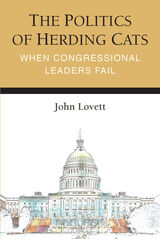 The Politics of Herding Cats: When Congressional Leaders Fail
John Lovett
University of Michigan Press, 2021 In The Politics of Herding Cats, John Lovett looks at the relationship between media, Congress, and public policy, showing that leaders in Congress under normal circumstances control public policy on issue areas due to their status both within Congress and in the media by and large. When issue coverage on topics increases in media, however, other members seize on the opportunities to engage in the issue and shift public policy away from leader desires. As more members engage and more groups become involved, leaders lose the ability to control the process and are more likely to have problems actually getting public policy enacted. Lovett look at this phenomenon using newspaper coverage in the Washington Post over a 40-year period, both in terms of general analysis as well as individual case studies exploring agricultural subsidies (a low coverage topic), immigration (a changing coverage topic), and health care (a high coverage topic). As coverage increases, the amount leaders can control in the process decreases. Only under extreme circumstances, as seen in the Affordable Care Act, can leaders get anything done at all. The Politics of Herding Cats would be useful for those who wish to better understand the relationship between the media and Congress. It will also be useful to those who want to understand the relationship between actors in government and how the media has influenced American politics, as well as how individual members of Congress can go against party leaders on major issues.
The Politics of Ideas and the Spread of Enterprise Zones
Karen Mossberger
Georgetown University Press, 2000 This book explores how policy ideas are spread—or diffused—in an age in which policymaking has become increasingly complex and specialized. Using the concept of enterprise zones as a case study in policy diffusion, Karen Mossberger compares the process of their adoption in Virginia, Indiana, Michigan, New York, and Massachusetts over a twelve-year period. Enterprise zones were first proposed by the Reagan administration as a supply-side effort to reenergize inner cities, and they were eventually embraced by liberals and conservatives alike. They are a compelling example of a policy idea that spread and evolved rapidly. Mossberger describes the information networks and decisionmaking processes in the five states, assessing whether enterprise zones spread opportunistically, as a mere fad, or whether well-informed deliberation preceded their adoption.
 The Politics of Imagining Asia
Wang Hui
Harvard University Press, 2011 In this bold, provocative collection, Wang Hui confronts some of the major issues concerning modern China and the status quo of contemporary Chinese thought.
The book’s overarching theme is the possibility of an alternative modernity that does not rely on imported conceptions of Chinese history and its legacy. Wang Hui argues that current models, based largely on Western notions of empire and the nation-state, fail to account for the richness and diversity of pre-modern Chinese historical practice. At the same time, he refrains from offering an exclusively Chinese perspective and placing China in an intellectual ghetto. Navigating terrain on regional language and politics, he draws on China’s unique past to expose the inadequacies of European-born standards for assessing modern China’s evolution. He takes issue particularly with the way in which nation-state logic has dominated politically charged concerns like Chinese language standardization and “The Tibetan Question.” His stance is critical—and often controversial—but he locates hope in the kinds of complex, multifaceted arrangements that defined China and much of Asia for centuries.
The Politics of Imagining Asia challenges us not only to re-examine our theories of “Asia” but to reconsider what “Europe” means as well. As Theodore Huters writes in his introduction, “Wang Hui’s concerns extend beyond China and Asia to an ambition to rethink world history as a whole.”
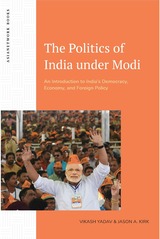 The Politics of India under Modi: An Introduction to India’s Democracy, Economy, and Foreign Policy
Vikash Yadav and Jason A. Kirk
Lever Press, 2023 Since the right-wing, Hindu-nationalist government of Narendra Modi’s Bharatiya Janata Party (BJP) came to power at the national level in 2014, and with its consolidation of power in the 2019 general election, India has witnessed a significant realignment of its national politics and a shift toward the right of the political spectrum. The Politics of India under Modi provides a detailed overview of India’s political trends, economic prospects, and international relations in the twenty-first century. This book is designed as a supplement and update for existing syllabi that trace India’s political economy from the birth of the republic to the quest for economic liberalization and great power status. Undergraduates and scholars interested in India’s foreign policy and political reform will find value in this timely book. “The subject of this book is extremely compelling and important, as well as timely. BJP rule and the Modi regime, it is now clear, represent some critical turning points in Indian politics, which have yet to be analyzed in depth academically by experts. I see this book as a key first step in this process.”
-Rina Verma Williams, School of Public and International Affairs at the University of Cincinnati
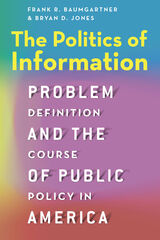 The Politics of Information: Problem Definition and the Course of Public Policy in America
Frank R. Baumgartner and Bryan D. Jones
University of Chicago Press, 2014 How does the government decide what’s a problem and what isn’t? And what are the consequences of that process? Like individuals, Congress is subject to the “paradox of search.” If policy makers don’t look for problems, they won’t find those that need to be addressed. But if they carry out a thorough search, they will almost certainly find new problems—and with the definition of each new problem comes the possibility of creating a government program to address it.
With The Politics of Attention, leading policy scholars Frank R. Baumgartner and Bryan D. Jones demonstrated the central role attention plays in how governments prioritize problems. Now, with The Politics of Information, they turn the focus to the problem-detection process itself, showing how the growth or contraction of government is closely related to how it searches for information and how, as an organization, it analyzes its findings. Better search processes that incorporate more diverse viewpoints lead to more intensive policymaking activity. Similarly, limiting search processes leads to declines in policy making. At the same time, the authors find little evidence that the factors usually thought to be responsible for government expansion—partisan control, changes in presidential leadership, and shifts in public opinion—can be systematically related to the patterns they observe.
Drawing on data tracing the course of American public policy since World War II, Baumgartner and Jones once again deepen our understanding of the dynamics of American policy making.
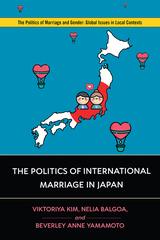 The Politics of International Marriage in Japan
Viktoriya Kim
Rutgers University Press, 2022 This book provides an in-depth exploration and analysis of marriages between Japanese nationals and migrants from three broad ethnic/cultural groups - spouses from the former Soviet Union countries, the Philippines, and Western countries. It reveals how the marriage migrants navigate the intricacies and trajectories of their marriages with Japanese people while living in Japan. Seen from the lens of ‘gendered geographies of power’, the book explores how state-level politics and policies towards marriage, migration, and gender affect the personal power politics in operation within the relationships of these international couples. Overall, the book discusses how ethnic identity intersects with gender in the negotiation of spaces and power relations between and amongst couples; and the role states and structural inequalities play in these processes, resulting in a reconfiguration of our notions of what international marriages are and how powerful gender and the state are in understanding the power relations in these unions.
 The Politics of Intimacy: Rethinking the End-of-Life Controversy
Anna Durnová
University of Michigan Press, 2018 Debates on the end-of-life controversy are complex because they seem to highjack national and cultural traditions. Where previous books have focused on ideological grounds, The Politics of Intimacy explores dying as the site where policies are negotiated and implemented. Intimacy comprises the emotional experience of the end of life and how we acknowledge it—or not—through institutions. This process shows that end-of-life controversy relies on the conflict between the individual and these institutions, a relationship that is the cornerstone of Western liberal democracies.
Through interviews with mourners, stakeholders, and medical professionals, examination of media debates in France and the Czech Republic, Durnová shows that liberal institutions, in their attempts to accommodate the emotional experience at the end of life, ultimately fail. She describes this deadlock as the “politics of intimacy,” revealing that political institutions deploy power through collective acknowledgment of individual emotions but fail to maintain this recognition because of this same experience.
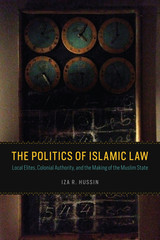 The Politics of Islamic Law: Local Elites, Colonial Authority, and the Making of the Muslim State
Iza R. Hussin
University of Chicago Press, 2016 In The Politics of Islamic Law, Iza Hussin compares India, Malaya, and Egypt during the British colonial period in order to trace the making and transformation of the contemporary category of ‘Islamic law.’ She demonstrates that not only is Islamic law not the shari’ah, its present institutional forms, substantive content, symbolic vocabulary, and relationship to state and society—in short, its politics—are built upon foundations laid during the colonial encounter.
Drawing on extensive archival work in English, Arabic, and Malay—from court records to colonial and local papers to private letters and visual material—Hussin offers a view of politics in the colonial period as an iterative series of negotiations between local and colonial powers in multiple locations. She shows how this resulted in a paradox, centralizing Islamic law at the same time that it limited its reach to family and ritual matters, and produced a transformation in the Muslim state, providing the frame within which Islam is articulated today, setting the agenda for ongoing legislation and policy, and defining the limits of change. Combining a genealogy of law with a political analysis of its institutional dynamics, this book offers an up-close look at the ways in which global transformations are realized at the local level.
The Politics of Islamophobia: Race, Power and Fantasy
David Tyrer
Pluto Press, 2013 Despite its emblematic place within contemporary racism and its increasingly important position in defining relations between states and ethnicised minorities, Islamophobia remains a contested, frequently unrecognised and largely under-theorised form of racism.
The Politics of Islamophobia provides a definitive contribution to these debates, offering a theoretically sophisticated account which draws upon a series of substantive case studies to position Islamophobia as an expression of racialised governmentality.
By taking into account connections across different national contexts, and by moving beyond the limiting framing of the war on terror which has dominated recent debates, this book offers a new perspective on the study of Islamophobia.
Politics of James Connolly
Kieran Allen
Pluto Press, 1990 Born in 1868 and executed by the British in 1916 for his role in the Easter Rising, the work of Irish national hero James Connolly has long been misunderstood. From Fianna Fáil and Sinn Féin, to conservative Irish nationalists and the Church, many groups have claimed Connolly as their own, his ideas and strategies used and distorted to justify particular political positions.
Kieran Allen breaks this mould, assessing the founder of the Irish Marxist movement ideas from a revolutionary socialist perspective. Allen considers the strengths and weaknesses of Connolly’s revolutionary strategy, the effect of his commitment to international socialism on his nationalist loyalties and arguing that, ultimately, Connolly's enduring relevance derives from his anti-imperialism. Any socialist movement today ignores this book at its peril.
The Politics of Justification: Party Competition and Welfare-State Retrenchment in Denmark and the Netherlands from 1982 to 1998
Christoffer Green-Pedersen
Amsterdam University Press, 2003 Christoffer Green-Pedersen's insightful examination of political party strategy in Europe reveals strong links between party consensus and policy retrenchment, arguing that the former allows governments to frame retrenchment in a way that justifies it to the electorate. In the Netherlands, Green-Pedersen shows, such consensus emerged in the mid-1980s, allowing the government to implement a number of welfare retrenchments; in Denmark, consensus did not emerge until the Social Democratic Party re-entered government in 1993, leading to less welfare-state retrenchment than in the Netherlands.
 The Politics of Kinship: Race, Family, Governance
Mark Rifkin
Duke University Press, 2024 What if we understood the idea of family as central to representing alternative forms of governance as expressions of racial deviance? In The Politics of Kinship, Mark Rifkin shows how ideologies of family, including notions of kinship, recast Indigenous and other forms of collective self-organization and self-determination as disruptive racial tendencies in need of state containment and intervention. Centering work in Indigenous studies, Rifkin illustrates how conceptions of family and race work together as part of ongoing efforts to regulate, assault, and efface other political orders. The book examines the history of anthropology and its resonances in contemporary queer scholarship, contemporary Indian policy from the 1970s onward, the legal history of family formation and privacy in the United States, and the association of blackness with criminality across US history. In this way, Rifkin seeks to open new possibilities for envisioning what kinds of relations, networks, and formations can and should be seen as governance on lands claimed by the United States.
The Politics of Knowledge: The Carnegie Corporation, Philanthropy, and Public Policy
Ellen Condliffe Lagemann
University of Chicago Press, 1992 The Carnegie Corporation, among this country's oldest and most important foundations, has underwritten projects ranging from the writings of David Riesman to Sesame Street. Lagemann's lively history focuses on how foundations quietly but effectively use power and private money to influence public policies.
 The Politics of Land Reform in Chile, 1950–1970: Public Policy, Political Institutions, and Social Change
Robert R. Kaufman
Harvard University Press, 1972 Displaced by the growth of cities and left impoverished by the inequities of an archaic land tenure system, peasants throughout Latin America are entering politics and upsetting the balance between social forces that had once been the sole competitors for governmental power. Still the largest occupational grouping in most countries, these peasants provide an important base of potential support for governments willing to undertake rural reform. In the light of this, Robert Kaufman's case study of Chilean land reform warrants careful consideration.
Focusing on the efforts of successive Chilean governments to pass and implement land reform legislation, Kaufman explores the way in which relatively high levels of social modernization and political institutionalization affect the emergence of the land reform issue, the timing and nature of the involvement of conflicting social groups, and the building of coalitions in support of various types of change.
The Politics of Large Numbers: A History of Statistical Reasoning
Alain Desrosières
Harvard University Press, 1998 Statistics-driven thinking is ubiquitous in modern society. In this ambitious and sophisticated study of the history of statistics, which begins with probability theory in the seventeenth century, Alain Desrosières shows how the evolution of modern statistics has been inextricably bound up with the knowledge and power of governments. He traces the complex reciprocity between modern governments and the mathematical artifacts that both dictate the duties of the state and measure its successes.
No other work, in any language, covers such a broad spectrum--probability, mathematical statistics, psychology, economics, sociology, surveys, public health, medical statistics--in accurately synthesizing the history of statistics, with an emphasis on the conceptual development of social statistics, culminating in twentieth-century applied econometrics.
 Politics of Legitimacy: State-Society Relations and Patterns of Chinese Politics
Dingxin Zhao
University of Chicago Press A sweeping work on China that interrogates how states gain, maintain, and lose legitimacy.
The Chinese communist state has survived massive social changes, including the introduction of capitalist markets, an ongoing explosion of technological innovation, and an unprecedented jump in wealth and education, accompanied by a major cultural transformation. How has China managed to maintain its power even as the ground has so profoundly shifted? In Politics of Legitimacy, Dingxin Zhao argues that state power can be legitimized in three ideal-typical ways: a set of values upheld by the state (ideological legitimacy), recognized political processes such as regular competitive elections (procedural legitimacy), and the state’s capacity to provide public goods (performance legitimacy).
Building on this theoretical framework, Zhao analyzes different aspects of Chinese politics, including the tragic ending of the 1989 pro-democracy movement, the weak development of mass-based nationalism in post-Mao China, the reasons behind China’s economic success, the anti-establishment tendency of the Chinese mass media and social media, and the sources of political tension in China, despite a superb economy. Moreover, Zhao’s innovative framework is widely applicable beyond China, shifting our attention from regime-type categories to the tools and relationships that determine their survival or collapse, and illuminating the current global emergence of conservatism and religious nationalism.
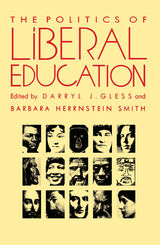 The Politics of Liberal Education
Darryl Gless and Barbara Herrnstein Smith, eds.
Duke University Press, 1992 Controversy over what role “the great books” should play in college curricula and questions about who defines “the literary canon” are at the forefront of debates in higher education. The Politics of Liberal Education enters this discussion with a sophisticated defense of educational reform in response to attacks by academic traditionalists. The authors here—themselves distinguished scholars and educators—share the belief that American schools, colleges, and universities can do a far better job of educating the nation’s increasingly diverse population and that the liberal arts must play a central role in providing students with the resources they need to meet the challenges of a rapidly changing world. Within this area of consensus, however, the contributors display a wide range of approaches, illuminating the issues from the perspectives of their particular disciplines—classics, education, English, history, and philosophy, among others—and their individual experiences as teachers. Among the topics they discuss are canon-formation in the ancient world, the idea of a “common culture,” and the educational implications of such social movements as feminism, technological changes including computers and television, and intellectual developments such as “theory.” Readers interested in the controversies over American education will find this volume an informed alternative to sensationalized treatments of these issues. Contributors. Stanley Fish, Phyllis Franklin, Henry Louis Gates Jr., Henry A. Giroux, Darryl J. Gless, Gerald Graff, Barbara Herrnstein Smith, George A. Kennedy, Bruce Kuklick, Richard A. Lanham, Elizabeth Kamarck Minnich, Alexander Nehamas, Mary Louise Pratt, Richard Rorty, Eve Kosofsky Sedgwick
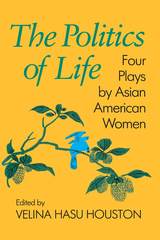 The Politics Of Life
edited by Velina Hasu Houston
Temple University Press, 1993 This anthology of work by three Asian American women playwrights—Wakako Yamauchi, Genny Lim, and Velina Hasu Houston—features pioneering contemporary writers who have made their mark in regional and ethnic theatres throughout the United States. In her introduction, Houston observes that the Asian American woman playwright is compelled "to mine her soul" and express the angst, fear, and rage that oppression has wrought while maintaining her relationship with America as a good citizen. The plays are rich with cultural and political substance and have a feminist concern about women's spirit, intellect, and lives. They portray Asian and Asian American women who challenge the cultural and sexual stereotypes of the Asian female. Yamauchi's two plays deal with how easily a country can dishonor its citizens. In "12-1-A," a Japanese American family is incarcerated during World War II in an Arizona camp where Yamauchi herself was interned. "The Chairman's Wife" dramatizes the life of Madame Mao Tse Tung through the lens of events at Tien An Men Square in 1989. Lim's "Bitter Cane" is about the exploitation of Chinese laborers who were recruited to work the Hawaiian sugar cane plantations. In "Asa Ga Kimashita" ("Morning Has Broken"), Houston explores a Japanese woman's interracial romance in postwar Japan and the influence of traditional patriarchy on the lives of Japanese women. These plays will entertain and enlighten, enrage and profoundly move audiences. With honesty, imagination and courage, each grapples with the politics of life.
In the series Asian American History and Culture, edited by Sucheng Chan, David Palumbo-Liu, Michael Omi, K. Scott Wong, and Linda Trinh Võ.
 The Politics of Linguistics
Frederick J. Newmeyer
University of Chicago Press, 1986 Linguists in the past two centuries have, for the most part, approached language as an autonomous entity; their practice has been to study languages without considering the culture, society, or beliefs of the speakers. "Autonomous linguistics" has been attacked from both the left and the right. Critics on the left (in particular Marxists) argue that the separation of language from its societal context reinforces the status quo by downplaying the role of language as an instrument of ideology and social control. Critics on the right object to the value-free analyses of individual languages required by the autonomous approach and to the idea that all languages merit equal attention. The Politics of Linguistics surveys two centuries of debate over autonomy. The discussion includes the political implications of the birth of the modern field of linguistics in the Romantic movement, the views of Marx and Engels on language, the attack on structural linguistics by both Hitler and Stalin, the role of Christian missionary groups and the military in building the field in the United States, and the relation between Noam Chomsky's linguistic theories and his political views. Frederick J. Newmeyer demonstrates that external political demonstrates that external political currents have often influenced the relative popularity of the autonomous approach to language. He argues that autonomous linguistics, far from being inconsistent with progressive political goals, can be creatively applied to the fulfillment of such goals.
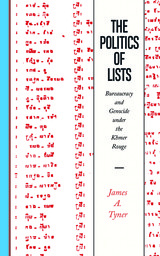 The Politics of Lists: Bureaucracy and Genocide under the Khmer Rouge
James A. Tyner
West Virginia University Press, 2018 2019 Julian Minghi Distinguished Book Award winner Scholars from a number of disciplines have, especially since the advent of the war on terror, developed critical perspectives on a cluster of related topics in contemporary life: militarization, surveillance, policing, biopolitics (the relation between state power and physical bodies), and the like. James A. Tyner, a geographer who has contributed to this literature with several highly regarded books, here turns to the bureaucratic roots of genocide, building on insight from Hannah Arendt, Zygmunt Bauman, and others to better understand the Khmer Rouge and its implications for the broader study of life, death, and power. The Politics of Lists analyzes thousands of newly available Cambodian documents both as sources of information and as objects worthy of study in and of themselves. How, Tyner asks, is recordkeeping implicated in the creation of political authority? What is the relationship between violence and bureaucracy? How can documents, as an anonymous technology capable of conveying great force, be understood in relation to newer technologies like drones? What does data create and what does it destroy? Through a theoretically informed, empirically grounded study of the Khmer Rouge security apparatus, Tyner shows that lists and telegrams have often proved as deadly as bullet and bombs.
 The Politics of Love: Queer Heterosexuality in Nineteenth-Century French Literature
Maxime Foerster
University of New Hampshire Press, 2018 What would love be if heterosexual couples were no longer assigned gender and sexual norms?
Maxime Foerster examines the “heterosexual trouble” between men and women in nineteenth-century French Romantic and Decadent literature. Key works by authors ranging from George Sand to Charles Baudelaire persistently demonstrate that heterosexuality did not work: these authors, and many others, investigated the struggle that men and women alike waged against patriarchal norms. Whereas Romantic fiction dedicated itself to the reinvention of love, Decadence promoted sexual and gender deviance.
In expertly evaluating the discord afflicting fictional heterosexual couples, male and female dandies, and doctors and their female patients, Foerster shows the crucial role that literature played in the fashioning of alternative identities. A concluding look at Proust’s À la recherche du temps perdu traces the legacy of heterosexual trouble in the twentieth century.
Hardcover is un-jacketed.
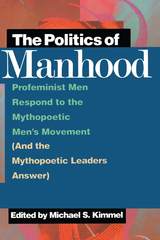 The Politics of Manhood: Profeminist Men Respond to the Mythopoetic Men's Movement (And the Mythopoetic Leaders Answer)
edited by Michael S. Kimmel
Temple University Press, 1995 The concept and reality of revolution continue to pose some of the most challenging and important questions in the world today. What causes revolution? Why do some people participate in revolutionary events while others do not? What is the role of religion and ideology in causing and sustaining revolution? Why do some revolutions succeed and some fail? These questions have preoccupied philosophers and social scientists for centuries. In Revolution, Michael S. Kimmel examines why the study of revolution has attained such importance and he provides a systematic historical analysis of key ideas and theories.
The book surveys the classical perspectives on revolution offered by nineteenth- and early twentieth-century theorists, such as Marx, Weber, Durkheim, Tocqueville, and Freud. Kimmel argues that their perspectives on revolution were affected by the reality of living through the revolutions of 1848 and 1917, a reality that raised crucial issues of class, state, bureaucracy, and motivation.
The author then turns to the interpretations of revolution offered by social scientists in the post-World War II period, especially modernization theory and social psychological theories. Here, he contends that the relative quiescence of the 1950s cast revolutions in a different light, which was poorly suited to explain the revolutionary upheavals that have marked the 1960s, 1970s, and 1980s. With reference to the work of Barrington Moore, Theda Skocpol, Immanuel Wallerstein, and Charles Tilly, among others, Kimmel develops the criteria for a structural theory of revolution. This lucid, accessible account includes contemporary analyses of the Nicaraguan, Iranian, and Angolan revolutions.
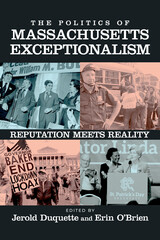 The Politics of Massachusetts Exceptionalism: Reputation Meets Reality
Edited by Jerold Duquette and Erin O'Brien
University of Massachusetts Press, 2022 Are claims of Massachusetts’s special and instructive place in American history and politics justified? Alternately described as a “city upon a hill” and “an organized system of hatreds,” Massachusetts politics has indisputably exerted an outsized pull on the national stage. The Commonwealth’s leaders often argue for the state’s distinct position within the union, citing its proud abolitionist history and its status as a policy leader on health care, gay marriage, and transgender rights, not to mention its fertile soil for budding national politicians. Detractors point to the state’s busing crisis, sky high levels of economic inequality, and mixed support for undocumented immigrants. The Politics of Massachusetts Exceptionalism tackles these tensions, offering a collection of essays from public policy experts that address the state’s noteworthy contributions to the nation’s political history. This is a much-needed volume for Massachusetts policymakers, journalists, and community leaders, as well as those learning about political power at the state level, inside and outside of the classroom. Contributors include the editors as well as Maurice T. Cunningham, Lawrence Friedman, Shannon Jenkins, Luis F. Jiménez, and Peter Ubertaccio.
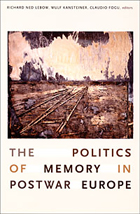 The Politics of Memory in Postwar Europe
Richard Ned Lebow, Wulf Kansteiner and Claudio Fogu, eds.
Duke University Press, 2006 For sixty years, different groups in Europe have put forth interpretations of World War II and their respective countries’ roles in it consistent with their own political and psychological needs. The conflict over the past has played out in diverse arenas, including film, memoirs, court cases, and textbooks. It has had profound implications for democratization and relations between neighboring countries. This collection provides a comparative case study of how memories of World War II have been constructed and revised in seven European nations: France, Germany, Austria, Switzerland, Poland, Italy, and the USSR (Russia). The contributors include scholars of history, literature, political science, psychology, and sociology. Country by country, they bring to the fore the specifics of each nation’s postwar memories in essays commissioned especially for this volume. The use of similar analytical categories facilitates comparisons. An extensive introduction contains reflections on the significance of Europeans’ memories of World War II and a conclusion provides an analysis of the implications of the contributors’ findings for memory studies. These two pieces tease out some of the findings common to all seven countries: for instance, in each nation, the decade and a half between the late 1960s and the mid-1980s was the period of most profound change in the politics of memory. At the same time, the contributors demonstrate that Europeans understand World War II primarily through national frames of reference, which are surprisingly varied. Memories of the war have important ramifications for the democratization of Central and Eastern Europe and the consolidation of the European Union. This volume clarifies how those memories are formed and institutionalized. Contributors. Claudio Fogu, Richard J. Golsan, Wulf Kansteiner, Richard Ned Lebow, Regula Ludi, Annamaria Orla-Bukowska, Heidemarie Uhl, Thomas C. Wolfe
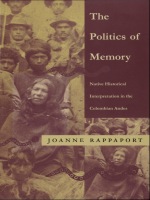 The Politics of Memory: Native Historical Interpretation in the Colombian Andes
Joanne Rappaport
Duke University Press, 1997 How does a culture in which writing is not a prominent feature create historical tradition? In The Politics of Memory, Joanne Rappaport answers this question by tracing the past three centuries of the intellectual history of the Nasa—a community in the Colombian Andes. Focusing on the Nasa historians of the eighteenth through twentieth centuries, Rappaport highlights the differences between "native" history and Eurocentric history and demonstrates how these histories must be examined in relation to the particular circumstances in which they were produced.
Reconsidering the predominantly mythic status of non-Western historical narrative, Rappaport identifies the political realities that influenced the form and content of Andean history, revealing the distinct historical vision of these stories. Because of her examination of the influences of literacy in the creation of history, Rappaport’s analysis makes a special contribution to Latin American and Andean studies, solidly grounding subaltern texts in their sociopolitical contexts.
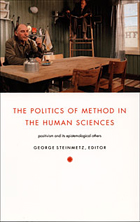 The Politics of Method in the Human Sciences: Positivism and Its Epistemological Others
George Steinmetz, ed.
Duke University Press, 2005 The Politics of Method in the Human Sciences provides a remarkable comparative assessment of the variations of positivism and alternative epistemologies in the contemporary human sciences. Often declared obsolete, positivism is alive and well in a number of the fields; in others, its influence is significantly diminished. The essays in this collection investigate its mutations in form and degree across the social science disciplines. Looking at methodological assumptions field by field, individual essays address anthropology, area studies, economics, history, the philosophy of science, political science and political theory, and sociology. Essayists trace disciplinary developments through the long twentieth century, focusing on the decades since World War II. Contributors explore and contrast some of the major alternatives to positivist epistemologies, including Marxism, psychoanalysis, poststructuralism, narrative theory, and actor-network theory. Almost all the essays are written by well-known practitioners of the fields discussed. Some essayists approach positivism and anti-positivism via close readings of texts influential in their respective disciplines. Some engage in ethnographies of the present-day human sciences; others are more historical in method. All of them critique contemporary social scientific practice. Together, they trace a trajectory of thought and method running from the past through the present and pointing toward possible futures. Contributors. Andrew Abbott, Daniel Breslau, Michael Burawoy, Andrew Collier , Michael Dutton, Geoff Eley, Anthony Elliott, Stephen Engelmann, Sandra Harding, Emily Hauptmann, Webb Keane, Tony Lawson, Sophia Mihic, Philip Mirowski, Timothy Mitchell, William H. Sewell Jr., Margaret R. Somers, George Steinmetz, Elizabeth Wingrove
The Politics of Mexican Oil
George Grayson
University of Pittsburgh Press, 1981 The Mexican oil boom of the 1970s brought great hope and prosperity with it. George Grayson shows the influence of oil and the oil sector both within Mexican society and in its relations with other nations. He traces the development of the oil industry from its beginnings in 1901 up until the 1980s, looking at topics that include the history of expropriation; the creation of the state-run company Petróleos Mexicanos; graft and corruption within the Oil Workers Union; Mexico's relations with OPEC; the political nuances of oil and gas agreements with the United States; and the prospects for the Mexican oil industry and domestic reforms generated from oil revenue.
 The Politics of Migration and Mobility in the Art World: Transnational Baltic Artistic Practices across Europe
Emma Duester
Intellect Books, 2021 This volume studies the movements of visual artists from the Baltic States of Lithuania, Latvia, and Estonia, where a lack of opportunities makes migration necessary for career progression. Faced with such barriers, how do artists from the Baltic States break into the global art market? Emma Duester argues that these artists form an artistic diaspora of practice, forming communities across geographic and ethnic borders.
Offering a fresh perspective on art and the working lives of those who create it, this multidisciplinary work investigates patterns of migration and mobile working practices across Europe and discusses the implications of artists’ movements on conventional notions of home, mobility, and diaspora. Amid a global refugee crisis, a resurgence in negative portrayals of Eastern Europeans in mainstream media, and increasing anti-immigrant sentiment fueled by Brexit and the rise of protectionism, this is a vital work that shines important new light on diaspora, displacement, and what it means to belong.
 The Politics of Military Force: Antimilitarism, Ideational Change, and Post-Cold War German Security Discourse
Frank A. Stengel
University of Michigan Press, 2020 The Politics of Military Force examines the dynamics of discursive change that made participation in military operations possible against the background of German antimilitarist culture. Once considered a strict taboo, so-called out-of-area operations have now become widely considered by German policymakers to be without alternative. The book argues that an understanding of how certain policies are made possible (in this case, military operations abroad and force transformation), one needs to focus on processes of discursive change that result in different policy options appearing rational, appropriate, feasible, or even self-evident. Drawing on Essex School discourse theory, the book develops a theoretical framework to understand how discursive change works, and elaborates on how discursive change makes once unthinkable policy options not only acceptable but even without alternative. Based on a detailed discourse analysis of more than 25 years of German parliamentary debates, The Politics of Military Force provides an explanation for: (1) the emergence of a new hegemonic discourse in German security policy after the end of the Cold War (discursive change), (2) the rearticulation of German antimilitarism in the process (ideational change/norm erosion) and (3) the resulting making-possible of military operations and force transformation (policy change). In doing so, the book also demonstrates the added value of a poststructuralist approach compared to the naive realism and linear conceptions of norm change so prominent in the study of German foreign policy and International Relations more generally.
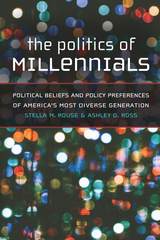 The Politics of Millennials: Political Beliefs and Policy Preferences of America's Most Diverse Generation
Stella M. Rouse and Ashley D. Ross
University of Michigan Press, 2018 Today the Millennial generation, the cohort born from the early 1980s to the late 1990s, is the largest generation in the United States. It exceeds one-quarter of the population and is the most diverse generation in U.S. history. Millennials grew up experiencing September 11, the global proliferation of the Internet and of smart phones, and the worst economic recession since the Great Depression of the 1930s. Their young adulthood has been marked by rates of unemployment and underemployment surpassing those of their parents and grandparents, making them the first generation in the modern era to have higher rates of poverty than their predecessors at the same age. The Politics of Millennials explores the factors that shape the Millennial generation’s unique political identity, how this identity conditions political choices, and how this cohort’s diversity informs political attitudes and beliefs. Few scholars have empirically identified and studied the political attitudes and policy preferences of Millennials, despite the size and influence of this generation. This book explores politics from a generational perspective, first, and then combines this with other group identities that include race and ethnicity to bring a new perspective to how we examine identity politics.
The Politics of Mirth: Jonson, Herrick, Milton, Marvell, and the Defense of Old Holiday Pastimes
Leah S. Marcus
University of Chicago Press, 1989 "Leah Marcus's The Politics of Mirth: Jonson, Herrick, Milton, Marvell, and the Defense of Old Holiday Pastimes is a fascinating study of why James and Charles promoted some types of rural sport and festival and of how certain literary texts participated in promoting or critiquing royal policy. . . . Marcus provocatively links texts not often studied in conjunction with one another, and she provides strong and detailed readings of those texts."—Jean E. Howard
 The Politics of Money: Towards Sustainability and Economic Democracy
Frances Hutchinson, Mary Mellor, and Wendy Olsen
Pluto Press, 2002 On the whole, classical and radical economists have marginalised the role of money, most particularly the role of credit, in driving the machinery of accumulation and exclusion. Although critiques of capitalism from Marxist, feminist, ecological and many other perspectives abound, The Politics of Money is unique in gathering the strengths of these differing critiques into a coherent whole. The authors have drawn upon their varied expertise in economics and the social sciences to produce the foundations of a new political economy that will enable communities to reconstruct their socio-economic fabric through social and political control of money systems.
The book opens with a review of the role of money in current society, an overview of the history of money creation and a critique of the main theoretical developments in economic thought. Alternative perspectives on money are then presented through a review of a number of radical perspectives but focusing mainly on the work of Marx, Veblen and the social credit perspective of Douglas and the guild socialists. In the final part of the book contemporary monetary theories and experiments are analysed within the theoretical and historical perspectives provided in the earlier chapters. The main argument of the book is that it is necessary to understand the crucial role of finance in driving the 'free market' economy if a democratic and sustainable economy is to be achieved.
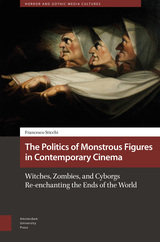 The Politics of Monstrous Figures in Contemporary Cinema: Witches, Zombies, and Cyborgs Re-enchanting the Ends of the World
Francesco Sticchi
Amsterdam University Press, 2025 The book addresses the role of particular monstrous figures and apocalyptic scenarios in contemporary cinema and television and evaluates the political potential of horror and sci-fi narratives in our age of never-ending crises. The purpose of the book is to demonstrate how witches, zombies, and cyborgs (among other figures) present the spectre of new people to come, of new possibilities to inhabit the Earth against the apocalyptic fates of Capitalism.
Written in an ‘acid communist’ spirit, the book shows how it is possible to politicise contemporary popular culture tropes and figures, mapping the anxieties they express and also their undisclosed potential and resources. Balancing personal commentary and academic analyses, the book expresses Deleuzian trust in the power of moving images as instruments that allow us to inhabit the present and believe in this world notwithstanding alleged ends of all worlds.
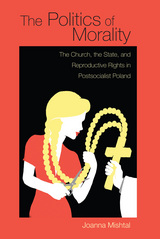 The Politics of Morality: The Church, the State, and Reproductive Rights in Postsocialist Poland
Joanna Mishtal
Ohio University Press, 2015 After the fall of the state socialist regime and the end of martial law in 1989, Polish society experienced both a sense of relief from the tyranny of Soviet control and an expectation that democracy would bring freedom. After this initial wave of enthusiasm, however, political forces that had lain concealed during the state socialist era began to emerge and establish a new religious-nationalist orthodoxy. While Solidarity garnered most of the credit for democratization in Poland, it had worked quietly with the Catholic Church, to which a large majority of Poles at least nominally adhered. As the church emerged as a political force in the Polish Sejm and Senate, it precipitated a rapid erosion of women’s reproductive rights, especially the right to abortion, which had been relatively well established under the former regime. The Politics of Morality is an anthropological study of this expansion of power by the religious right and its effects on individual rights and social mores. It explores the contradictions of postsocialist democratization in Poland: an emerging democracy on one hand, and a declining tolerance for reproductive rights, women’s rights, and political and religious pluralism on the other. Yet, as this thoroughly researched study shows, women resist these strictures by pursuing abortion illegally, defying religious prohibitions on contraception, and organizing into advocacy groups. As struggles around reproductive rights continue in Poland, these resistances and unofficial practices reveal the sharp limits of religious form of governance.
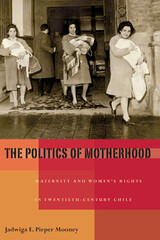 The Politics of Motherhood: Maternity and Women’s Rights in Twentieth-Century Chile
Jadwiga E. Pieper Mooney
University of Pittsburgh Press, 2009 With the 2006 election of Michelle Bachelet as the first female president and women claiming fifty percent of her cabinet seats, the political influence of Chilean women has taken a major step forward. Despite a seemingly liberal political climate, Chile has a murky history on women's rights, and progress has been slow, tenuous, and in many cases, non-existent.
Chronicling an era of unprecedented modernization and political transformation, Jadwiga E. Pieper Mooney examines the negotiations over women's rights and the politics of gender in Chile throughout the twentieth century. Centering her study on motherhood, Pieper Mooney explores dramatic changes in health policy, population paradigms, and understandings of human rights, and reveals that motherhood is hardly a private matter defined only by individual women or couples. Instead, it is intimately tied to public policies and political competitions on nation-state and international levels.
The increased legitimacy of women's demands for rights, both locally and globally, has led to some improvements in gender equity. Yet feminists in contemporary Chile continue to face strong opposition from neoconservatism in the Catholic Church and a mixture of public apathy and legal wrangling over reproductive rights and health.
 The Politics of Mourning: Death and Honor in Arlington National Cemetery
Micki McElya
Harvard University Press, 2016 Pulitzer Prize Finalist
Winner of the John Brinckerhoff Jackson Book Prize
Winner of the Sharon Harris Book Award
Finalist, Jefferson Davis Award of the American Civil War Museum
Arlington National Cemetery is one of America’s most sacred shrines, a destination for millions who tour its grounds to honor the men and women of the armed forces who serve and sacrifice. It commemorates their heroism, yet it has always been a place of struggle over the meaning of honor and love of country. Once a showcase plantation, Arlington was transformed by the Civil War, first into a settlement for the once enslaved, and then into a memorial for Union dead. Later wars broadened its significance, as did the creation of its iconic monument to universal military sacrifice: the Tomb of the Unknown Soldier.
As Arlington took its place at the center of the American story, inclusion within its gates became a prerequisite for claims to national belonging. This deeply moving book reminds us that many brave patriots who fought for America abroad struggled to be recognized at home, and that remembering the past and reckoning with it do not always go hand in hand.
“Perhaps it is cliché to observe that in the cities of the dead we find meaning for the living. But, as McElya has so gracefully shown, such a cliché is certainly fitting of Arlington.”
—American Historical Review
“A wonderful history of Arlington National Cemetery, detailing the political and emotional background to this high-profile burial ground.”
—Choice
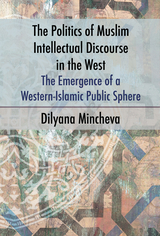 The Politics of Muslim Intellectual Discourse in the West: The Emergence of a Western-Islamic Public Sphere
Dilyana Mincheva
Sussex Academic Press, 2022 Now available in paperback! This case study in the literary, psychoanalytic, and theological encounters between diasporic Muslim intellectuals and secular western modernity focuses on the simultaneous search for the possibility of both a reformation of Islamic fundamentalism and a transformation of the exclusionary limitations of western public institutions. With roots in original research in the fields of comparative religion and cultural studies, and drawing on sources in English, French, and Arabic, the author introduces and elaborates on the concept of "Western-Islamic public sphere." This concept defines what is at stake in the formative play of public representations where traditionalist foundations and modernist adaptations meet, clash, and produce discourse around their common disequilibrium. The Western-Islamic public sphere (which is secular but not secularist and which is Islamic but not Islamist), within which a critical Islamic intellectual universe can unfold, deals hermeneutically with texts and politically with lived practices. It emerges from within the arc of two alternative, conflicting, yet equally dismissive suspicions defined by a view that critical Islam is the new imperial rhetoric of hegemonic orientalism, and the opposite view that critical Islam is just fundamentalism camouflaged in liberal rhetoric. This innovative and original scholarly apparatus offers a third view-one that arises in its practice from ethical commitment to intellectual engagement, creativity, and imagination as a portal to the open horizons of conflictual history. [Subject: Islamic Studies, Theology, Literary Criticism, Sociology]
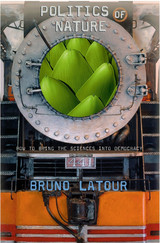 Politics of Nature: How to Bring the Sciences into Democracy
Bruno Latour
Harvard University Press, 2004 A major work by one of the more innovative thinkers of our time, Politics of Nature does nothing less than establish the conceptual context for political ecology—transplanting the terms of ecology into more fertile philosophical soil than its proponents have thus far envisioned. Bruno Latour announces his project dramatically: “Political ecology has nothing whatsoever to do with nature, this jumble of Greek philosophy, French Cartesianism and American parks.” Nature, he asserts, far from being an obvious domain of reality, is a way of assembling political order without due process. Thus, his book proposes an end to the old dichotomy between nature and society—and the constitution, in its place, of a collective, a community incorporating humans and nonhumans and building on the experiences of the sciences as they are actually practiced.
In a critique of the distinction between fact and value, Latour suggests a redescription of the type of political philosophy implicated in such a “commonsense” division—which here reveals itself as distinctly uncommonsensical and in fact fatal to democracy and to a healthy development of the sciences. Moving beyond the modernist institutions of “mononaturalism” and “multiculturalism,” Latour develops the idea of “multinaturalism,” a complex collectivity determined not by outside experts claiming absolute reason but by “diplomats” who are flexible and open to experimentation.
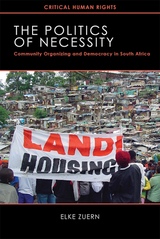 The Politics of Necessity: Community Organizing and Democracy in South Africa
Elke Zuern
University of Wisconsin Press, 2011 The end of apartheid in South Africa broke down political barriers, extending to all races the formal rights of citizenship, including the right to participate in free elections and parliamentary democracy. But South Africa remains one of the most economically polarized nations in the world. In The Politics of Necessity Elke Zuern forcefully argues that working toward greater socio-economic equality—access to food, housing, land, jobs—is crucial to achieving a successful and sustainable democracy.
Drawing on interviews with local residents and activists in South Africa’s impoverished townships during more than a decade of dramatic political change, Zuern tracks the development of community organizing and reveals the shifting challenges faced by poor citizens. Under apartheid, township residents began organizing to press the government to address the basic material necessities of the poor and expanded their demands to include full civil and political rights. While the movement succeeded in gaining formal political rights, democratization led to a new government that instituted neo-liberal economic reforms and sought to minimize protest. In discouraging dissent and failing to reduce economic inequality, South Africa’s new democracy has continued to disempower the poor.
By comparing movements in South Africa to those in other African and Latin American states, this book identifies profound challenges to democratization. Zuern asserts the fundamental indivisibility of all human rights, showing how protest movements that call attention to socio-economic demands, though often labeled a threat to democracy, offer significant opportunities for modern democracies to evolve into systems of rule that empower all citizens.
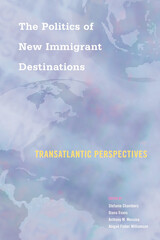 The Politics of New Immigrant Destinations: Transatlantic Perspectives
Stefanie Chambers
Temple University Press, 2017 Migration to new destinations in Europe and the United States has expanded dramatically over the past few decades. Within these destinations, there is a corresponding greater variety of ethnic, cultural, and/or religious diversity. This timely volume, The Politics of New Immigrant Destinations, considers the challenges posed by this proliferation of diversity for governments, majority populations, and immigrants. The contributors assess the effectiveness of the policy and political responses that have been spawned by increasing diversity in four types of new immigrant destinations: “intermediate” destination countries—Ireland and Italy; culturally distinct regions experiencing new migration such as Catalonia in Spain or the American South; new destinations within traditional destination countries like the state of Utah and rural towns in England; and “early migration cycle” countries including Latvia and Poland. The Politics of New Immigrant Destinations examines how these new destinations for immigrants compare to traditional destinations, with respect to their policy responses and success at integrating immigrants, offering perspectives from both immigrants and natives. Contributors include: Dace Akule, Amado Alarcón, Rhys Andrews, Francesca Campomori, Tiziana Caponio, Scott Decker, Erica Dobbs, Melissa M. Goldsmith, Aleksandra Grzymała-Kazłowska, Claudio A. Holzner, Magdalena Lesińska, Paul Lewis, Helen B. Marrow, Laura Morales, Katia Pilati, Marie Provine, Monica Varsanyi, and the editors.
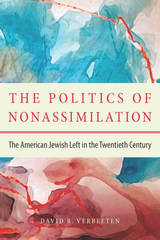 The Politics of Nonassimilation: The American Jewish Left in the Twentieth Century
David Verbeeten
Northern Illinois University Press, 2017 Over the course of the twentieth century, Eastern European Jews in the United States developed a left-wing political tradition. Their political preferences went against a fairly broad correlation between upward mobility and increased conservatism or Republican partisanship. Many scholars have sought to explain this phenomenon by invoking antisemitism, an early working-class experience, or a desire to integrate into a universal social order. In this original study, David Verbeeten instead focuses on the ways in which left-wing ideologies and movements helped to mediate and preserve Jewish identity in the context of modern tendencies toward bourgeois assimilation and ethnic dissolution.
Verbeeten pursues this line of inquiry through case studies that highlight the political activities and aspirations of three “generations” of American Jews. The life of Alexander Bittelman provides a lens to examine the first generation. Born in Ukraine in 1892, Bittelman moved to New York City in 1912 and went on to become a founder of the American Communist Party after World War I. Verbeeten explores the second generation by way of the American Jewish Congress, which came together in 1918 and launched significant campaigns against discrimination within civil society before, during, and especially after World War II. Finally, he considers the third generation in relation to the activist group New Jewish Agenda, which operated from 1980 to 1992 and was known for its advocacy of progressive causes and its criticism of particular Israeli governments and policies. By focusing on individuals and organizations that have not previously been subjects of extensive investigation, Verbeeten contributes original research to the fields of American, Jewish, intellectual, and radical history. His insightful study will appeal to specialists and general readers interested in those areas.
The Politics of Numbers
William Alonso
Russell Sage Foundation, 1987 The Politics of Numbers is the first major study of the social and political forces behind the nation's statistics. In more than a dozen essays, its editors and authors look at the controversies and choices embodied in key decisions about how we count—in measuring the state of the economy, for example, or enumerating ethnic groups. They also examine the implications of an expanding system of official data collection, of new computer technology, and of the shift of information resources into the private sector. A Volume in the Russell Sage Foundation Census Series
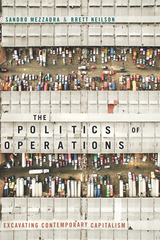 The Politics of Operations: Excavating Contemporary Capitalism
Sandro Mezzadra and Brett Neilson
Duke University Press, 2019 In The Politics of Operations Sandro Mezzadra and Brett Neilson investigate how capital reshapes its relation with politics through operations that enable the extraction and exploitation of mineral resources, labor, data, and cultures. They show how capital—which they theorize as a direct political actor—operates through the logistical organization of relations between people, property, and objects as well as through the penetration of financialization into all realms of economic life. Mezzadra and Neilson present a capacious analysis of a wide range of issues, from racial capitalism, the convergence of neoliberalism and nationalism, and Marx's concept of aggregate capital to the financial crisis of 2008 and how colonialism, empire, and globalization have shaped the modern state since World War II. In so doing, they illustrate the distinctive rationality and logics of contemporary capitalism while calling for a politics based on collective institutions that exist outside the state.
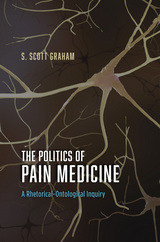 The Politics of Pain Medicine: A Rhetorical-Ontological Inquiry
S. Scott Graham
University of Chicago Press, 2015 Chronic pain is a medical mystery, debilitating to patients and a source of frustration for practitioners. It often eludes both cause and cure and serves as a reminder of how much further we have to go in unlocking the secrets of the body. A new field of pain medicine has evolved from this landscape, one that intersects with dozens of disciplines and subspecialties ranging from psychology and physiology to anesthesia and chiropractic medicine. Over the past three decades, researchers, policy makers, and practitioners have struggled to define this complex and often contentious field as they work to establish standards while navigating some of the most challenging philosophical issues of Western science.
In The Politics of Pain Medicine: A Rhetorical-Ontological Inquiry, S. Scott Graham offers a rich and detailed exploration of the medical rhetoric surrounding pain medicine. Graham chronicles the work of interdisciplinary pain management specialists to found a new science of pain and a new approach to pain medicine grounded in a more comprehensive biospychosocial model. His insightful analysis demonstrates how these materials ultimately shape the healthcare community’s understanding of what pain medicine is, how the medicine should be practiced and regulated, and how practitioner-patient relationships are best managed. It is a fascinating, novel examination of one of the most vexing issues in contemporary medicine.
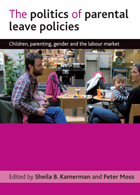 The Politics of Parental Leave Policies: Children, Parenting, Gender and the Labour Market
Edited by Sheila B. Kamerman and Peter Moss
Bristol University Press, 2011 With the growth of parental employment, leave policy is at the centre of welfare state development and at the heart of countries' child and family policies. It is widely recognised as an essential element for attaining important demographic, social and economic goals and is the point where many different policy areas intersect: child well-being, family, gender equality, employment and labour markets, and demography. Leave policy, therefore, gives a unique insight into a country's values, interests and priorities. International comparisons of leave policy are widely available, but far less attention has been paid to understanding the factors that bring about these variations. "The politics of parental leave policies" makes good this omission. Looking at parental leave policy within a wider work/family context, it addresses how and why, and by whom, particular policies are created and subsequently developed in particular countries. Chapters covering 15 countries in Europe and beyond and the European Union bring together leading academic experts to provide a unique insight into the past, present and future state of this key policy area. "The politics of parental leave policies" is essential reading for students, teachers and researchers in social policy, child and family policy, welfare states, gender relations and equality, and employment and labour markets, providing an opportunity to study in depth the creation of social policy. It will also be of interest to policy makers in national governments and international organisations.
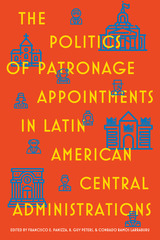 The Politics of Patronage Appointments in Latin American Central Administrations
Francisco Panizza, B. Guy Peters, and Conrado Ramos Larraburu
University of Pittsburgh Press, 2022 Although merit system selection and management of public personnel is thought of as the standard for good governance, public employees frequently are appointed by political officials rather than being members of a career civil service. In fact, there has been an increase in the level of patronage appointments and politicization of public administration over the past several decades as political leaders attempt to impose their control over the public bureaucracy. Although widespread, patronage appointments in the public sector are particularly important in Latin America, where there is a tradition of extensive patronage. The Politics of Patronage Appointments in Latin American Central Administrations seeks to understand the motivations of patrons when they make appointments, the roles appointees play, the skills required to play these roles, and what accounts for different modalities of patronage. It moves beyond the conventional condemnation of patronage to examine the multiple uses of political appointments, which can be crucial for obtaining the services of highly qualified individuals who otherwise might not be willing to work in the public sector.
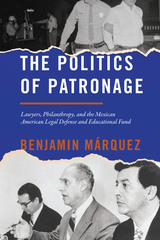 The Politics of Patronage: Lawyers, Philanthropy, and the Mexican American Legal Defense and Educational Fund
By Benjamin Márquez
University of Texas Press, 2021 Co-winner, Latino Politics Best Book Award, American Political Science Association The first book about the Mexican American Legal Defense and Educational Fund, the influential work it has done for the Latina/o community, and the issues stemming from its dependence on large philanthropic organizations. Founded in 1968, the Mexican American Legal Defense and Educational Fund (MALDEF) is the Latino equivalent to the NAACP: a source of legal defense for the Latina/o community in cases centered on education, state immigration laws, redistricting, employment discrimination, and immigrant rights. Unlike the NAACP, however, MALDEF was founded by Mexican American activists in conjunction with the larger philanthropic structure of the Ford Foundation—a relationship that has opened it up to controversy and criticism. In the first book to examine this little-known but highly influential organization, Benjamin Márquez explores MALDEF’s history and shows how it has thrived and served as a voice for the Latina/o community throughout its six decades of operation. But he also looks closely at large-scale investments of the Ford Foundation, Rockefeller Foundation, and others, considering how their ties to MALDEF have influenced Mexican American and Latinx politics. Its story crafted from copious research into MALDEF and its benefactors, this book brings to light the influence of outside funding on the articulation of minority identities and the problems that come with creating change through institutional means.
The Politics of Permaculture
Terry Leahy
Pluto Press, 2021 Permaculture is an environmental movement that makes us revaluate what it means to be sustainable. Through innovative agriculture and settlement design, the movement creates new communities that are harmonious with nature. It has grown from humble origins on a farm in 1970s Australia and flourished into a worldwide movement that confronts industrial capitalism.
The Politics of Permaculture is one of the first books to unpack the theory and practice of this social movement that looks to challenge the status quo. Drawing upon the rich seam of publications and online communities from the movement as well as extensive interviews with permaculture practitioners and organizations from around the world, Leahy explains the ways permaculture is understood and practiced in different contexts.
In the face of extreme environmental degradation and catastrophic climate change, we urgently need a new way of living.
The Politics of Permaculture
Terry Leahy
Pluto Press, 2021 Permaculture is an environmental movement that makes us revaluate what it means to be sustainable. Through innovative agriculture and settlement design, the movement creates new communities that are harmonious with nature. It has grown from humble origins on a farm in 1970s Australia and flourished into a worldwide movement that confronts industrial capitalism.
The Politics of Permaculture is one of the first books to unpack the theory and practice of this social movement that looks to challenge the status quo. Drawing upon the rich seam of publications and online communities from the movement as well as extensive interviews with permaculture practitioners and organizations from around the world, Leahy explains the ways permaculture is understood and practiced in different contexts.
In the face of extreme environmental degradation and catastrophic climate change, we urgently need a new way of living.
The Politics of Pessimism in Ecclesiastes: A Social-Science Perspective
Mark R. Sneed
SBL Press, 2012 Scholars attempt to resolve the problem of the book of Ecclesiastes’ heterodox character in one of two ways, either explaining away the book’s disturbing qualities or radicalizing and championing it as a precursor of modern existentialism. This volume offers an interpretation of Ecclesiastes that both acknowledges the unorthodox nature of Qoheleth’s words and accounts for its acceptance among the canonical books of the Hebrew Bible. It argues that, instead of being the most secular and modern of biblical books, Ecclesiastes is perhaps one of the most religious and primitive. Bringing a Weberian approach to Ecclesiastes, it represents a paradigm of the application of a social-science methodology.
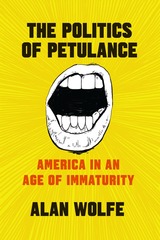 The Politics of Petulance: America in an Age of Immaturity
Alan Wolfe
University of Chicago Press, 2018 How did we get into this mess? Every morning, many Americans ask this as, with a cringe, they pick up their phones and look to see what terrible thing President Trump has just said or done. Regardless of what he’s complaining about or whom he’s attacking, a second question comes hard on the heels of the first: How on earth do we get out of this?
Alan Wolfe has an answer. In The Politics of Petulance he argues that the core of our problem isn’t Trump himself—it’s that we are mired in an age of political immaturity. That immaturity is not grounded in any one ideology, nor is it a function of age or education. It’s in an abdication of valuing the character of would-be leaders; it’s in a failure to acknowledge, even welcome the complexity of government and society; and it’s in a loss of the ability to be skeptical without being suspicious. In 2016, many Americans were offered tantalizingly simple answers to complicated problems, and, like children being offered a lunch of Pop Rocks and Coke, they reflexively—and mindlessly—accepted.
The good news, such as it is, is that we’ve been here before. Wolfe reminds us that we know how to grow up and face down Trump and other demagogues. Wolfe reinvigorates the tradition of public engagement exemplified by midcentury intellectuals such as Richard Hofstadter, Reinhold Niebuhr, and Lionel Trilling—and he draws lessons from their battles with McCarthyism and conspiratorial paranoia. Wolfe mounts a powerful case that we can learn from them to forge a new path for political intervention today.
Wolfe has been thinking and writing about American life and politics for decades. He sees this moment as one of real risk. But he’s not throwing up his hands; he’s bracing us. We’ve faced demagogues before. We can find the intellectual maturity to fight back. Yes we can.
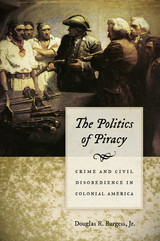 The Politics of Piracy: Crime and Civil Disobedience in Colonial America
Douglas R. Burgess
University Press of New England, 2014 The seventeenth-century war on piracy is remembered as a triumph for the English state and her Atlantic colonies. Yet it was piracy and illicit trade that drove a wedge between them, imperiling the American enterprise and bringing the colonies to the verge of rebellion. In The Politics of Piracy, competing criminalities become a lens to examine England’s legal relationship with America. In contrast to the rough, unlettered stereotypes associated with them, pirates and illicit traders moved easily in colonial society, attaining respectability and even political office. The goods they provided became a cornerstone of colonial trade, transforming port cities from barren outposts into rich and extravagant capitals. This transformation reached the political sphere as well, as colonial governors furnished local mariners with privateering commissions, presided over prize courts that validated stolen wares, and fiercely defended their prerogatives as vice-admirals. By the end of the century, the social and political structures erected in the colonies to protect illicit trade came to represent a new and potent force: nothing less than an independent American legal system. Tensions between Crown and colonies presage, and may predestine, the ultimate dissolution of their relationship in 1776. Exhaustively researched and rich with anecdotes about the pirates and their pursuers, The Politics of Piracy will be a fascinating read for scholars, enthusiasts, and anyone with an interest in the wild and tumultuous world of the Atlantic buccaneers.
The Politics of Place: A History of Zoning in Chicago
Joseph P. Schwieterman and Dana M. Caspall
Southern Illinois University Press, 2006 Chicago is renowned for its distinctive skyline, its bustling Loop business district, and its diverse neighborhoods. How the face of Chicago came to be is a story of enterprise, ingenuity, opportunity—and zoning. The Politics of Place reviews the interplay among development, planning, and zoning in the growth of the Gold Coast, the central area, and massive planned developments, such as Marina City, Illinois Center, and Dearborn Park. It tells the story of the bold visions compromised by political realities, battles between residents and developers, and occasional misfires from the city council and city hall. What emerges is a fascinating, behind-the-scenes exploration of the evolving character of the city’s landscape.
 The Politics of Place: Contentious Urban Redevlopment in Pittsburgh
Gregory J. Crowley
University of Pittsburgh Press, 2005
In urban America, large-scale redevelopment is a frequent news item. Many proposals for such redevelopment are challenged—sometimes successfully, and other times to no avail. The Politics of Place considers the reasons for these outcomes by examining five cases of contentious redevelopment in Pittsburgh, Pennsylvania, between 1949 and 2000.
In four of these cases, the challengers to redevelopment failed to create the conditions necessary for strong democratic participation. In the fifth case—the proposed reconstruction of Pittsburgh’s downtown retail district (1997–2000)—challengers succeeded, and Crowley describes the crucial role of independent nonprofit organizations in bringing about this result.
At the heart of Crowley’s discussion are questions central to any urban redevelopment debate: Who participates in urban redevelopment, what motivates them to do so, and what structures in the political process open or close a democratic dialogue among the stakeholders? Through his astute analysis, Crowley answers these questions and posits a framework through which to view future contention in urban redevelopment.
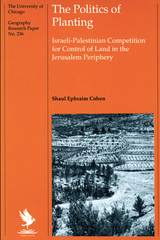 The Politics of Planting: Israeli-Palestinian Competition for Control of Land in the Jerusalem Periphery
Shaul Ephraim Cohen
University of Chicago Press, 1993 On the open landscape of Israel and the West Bank, where pine and cypress forests grow alongside olive groves, tree planting has become symbolic of conflicting claims to the land. Palestinians cultivate olive groves as a vital agricultural resource, while the Israeli government has made restoration of mixed-growth forests a national priority. Although both sides plant for a variety of purposes, both have used tree planting to assert their presence on—and claim to—disputed land.
Shaul Ephraim Cohen has conducted an unprecedented study of planting in the region and the control of land it signifies. In The Politics of Planting, he provides historical background and examines both the politics behind Israel's afforestation policy its consequences. Focusing on the open land surrounding Jerusalem and four Palestinian villages outside the city, this study offers a new perspective on the conflict over land use in a region where planting has become a political tool.
For the valuable data it presents—collected from field work, previously unpublished documents, and interviews—and the insight it provides into this political struggle, this will be an important book for anyone studying the Israeli-Palestinian conflict.
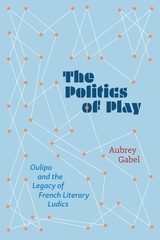 The Politics of Play: Oulipo and the Legacy of French Literary Ludics
Aubrey Gabel
Northwestern University Press, 2026 Showing the political importance of play in postwar French literature
In postwar France, authors approached writing ludically, placing rules and conditions on language and on the context of composition itself. They eliminated “e’s” and feminized texts; they traveled according to strict rules and invented outright silly public personas. The Politics of Play: Oulipo and the Legacy of French Literary Ludics is a comprehensive examination of how and why French authors turned to these ludic methods to grapple with their political moment.
These writers were responding to a range of historical upheavals, from the rise and fall of French feminist and Third-Worldist groups to the aftermath of international socialism both at home, in the former Parisian Belt and in France more broadly, and abroad, in post-Yugoslavia Balkan states and elsewhere. Juxtaposing an array of case studies and drawing on cross-disciplinary methodologies, Aubrey Gabel reads three generations of the formalist literary group Oulipo, including Raymond Queneau, Georges Perec, and Jacques Jouet, alongside writers not traditionally deemed ludic—or sometimes not even conventionally known as novelists—such as the lesbian activist-writer Monique Wittig and the editor François Maspero. Gabel argues that literary ludics serve as both an authorial strategy and a political form: playful methods allow writers not only to represent history in code but also to intervene creatively—as political actors—in the fraught social fields of midcentury France and beyond.
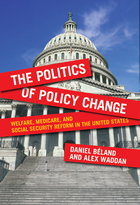 The Politics of Policy Change: Welfare, Medicare, and Social Security Reform in the United States
Daniel Béland
Georgetown University Press, 2012 For generations, debating the expansion or contraction of the American welfare state has produced some of the nation's most heated legislative battles. Attempting social policy reform is both risky and complicated, especially when it involves dealing with powerful vested interests, sharp ideological disagreements, and a nervous public. The Politics of Policy Change compares and contrasts recent developments in three major federal policy areas in the United States: welfare, Medicare, and Social Security. Daniel Béland and Alex Waddan argue that we should pay close attention to the role of ideas when explaining the motivations for, and obstacles to, policy change. This insightful book concentrates on three cases of social policy reform (or attempted reform) that took place during the presidencies of Bill Clinton and George W. Bush. Béland and Waddan further employ their framework to help explain the meaning of the 2010 health insurance reform and other developments that have taken place during the Obama presidency. The result is a book that will improve our understanding of the politics of policy change in contemporary federal politics.
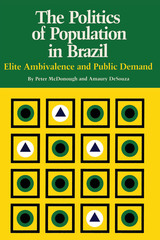 The Politics of Population in Brazil: Elite Ambivalence and Public Demand
By Peter McDonough and Amaury DeSouza
University of Texas Press, 1981 The population of Brazil increased tenfold, from 10 to over 100 million, between 1880 and 1980, nearly half of this increase occurring since the end of World War II. The Politics of Population in Brazil examines the attitudes toward population planning of Brazilian government officials and other elites—bishops, politicians, labor leaders, and business owners—in comparison with mass public opinion. The authors' findings that elites seriously underestimate the desire for family planning services, while the public views birth control as a basic issue, represent an important contribution on a timely issue. A major reason for this disparity is that the elites tend to define the issue as a matter of national power and collective growth, and the public sees it as a bread-and-butter question affecting the daily lives of families. McDonough and DeSouza document not only the real gulf between elite and mass opinion but also the propensity of the elites to exaggerate this gap through their stereotyping of public opinion as conservative and disinterested in family planning. Despite these differences, the authors demonstrate that population planning is less conflict ridden than many other controversies in Brazilian politics and probably more amenable to piecemeal bargaining than some earlier studies suggest. In part, this is because attitudes on the issue are not closely identified with opinions regarding left-versus-right disputes. In addition, for the public in general, religious sentiment affects attitudes toward family planning only indirectly. This separation, which reflects the historical lack of penetration of Brazilian society on the part of the church, further attenuates the issue's potential for galvanizing deep-seated antagonisms. As the authors note, this situation stands in contrast to the fierce debates that moral issues have generated in Spain and Ireland. The study is noteworthy not only for its original approach—the incorporation of mass and elite data and the departure from the standard concerns with fertility determinants in population—but also for its sophisticated methodology and lucid presentation.
 The Politics of Possibility: Risk and Security Beyond Probability
Louise Amoore
Duke University Press, 2013 Since September 11, 2001, the imagination of "low probability, high consequence" events has become a distinctive feature of contemporary politics. Uncertain futures—devastation by terrorist attack, cyber crime, flood, financial market collapse—must be discerned and responded to as possibilities, however improbable they may be. In The Politics of Possibility, Louise Amoore examines this development, tracing its genealogy through the diverse worlds of risk management consulting, computer science, commercial logistics, and data visualization. She focuses on the increasingly symbiotic relationship between commercial opportunities and state security threats, a relation that turns the trusted, iris-scanned traveler into "a person of national security interest," and the designer of risk algorithms for casino and insurance fraud into a homeland security resource. Juxtaposing new readings of Agamben, Foucault, Derrida, Massumi, and Connolly with interpretations of post–9/11 novels and artworks, Amoore analyzes the "politics of possibility" and its far-reaching implications for society, associative life, and political accountability.
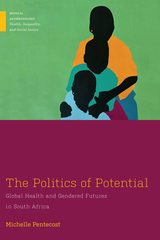 The Politics of Potential: Global Health and Gendered Futures in South Africa
Michelle Pentecost
Rutgers University Press, 2024 The first one thousand days of human life, or the period between conception and age two, is one of the most pivotal periods of human development. Optimizing nutrition during this time not only prevents childhood malnutrition but also determines future health and potential. The Politics of Potential examines early life interventions in the first one thousand days of life in South Africa, drawing on fieldwork from international conferences, government offices, health-care facilities, and the everyday lives of fifteen women and their families in Cape Town. Michelle Pentecost explores various aspects of a politics of potential, a term that underlines the first one thousand days concept and its effects on clinical care and the lives of childbearing women in South Africa. Why was the First One Thousand Days project so readily adopted by South Africa and many other countries? Pentecost not only explores this question but also discusses the science of intergenerational transmissions of health, disease, and human capital and how this constitutes new forms of intergenerational responsibility. The women who are the target of first one thousdand days interventions are cast as both vulnerable and responsible for the health of future generations, such that, despite its history, intergenerational responsibility in South Africa remains entrenched in powerfully gendered and racialized ways.
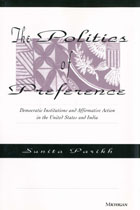 The Politics of Preference: Democratic Institutions and Affirmative Action in the United States and India
Sunita Parikh
University of Michigan Press, 1997 Sunita Parikh examines the history and fate of affirmative action programs in two ethnically heterogeneous democracies, the United States and India. Affirmative action programs in the United States represent a controversial policy about which the American public feel at best ambivalence and at worst hostility, while in India the expansion of reservation policies in recent years has led to riots and contributed to the fall of governments. And yet these policies were not particularly controversial when they were introduced. How the policy traveled from these auspicious beginnings to its current predicament can best be understood, according to Parikh, by exploring the changing political conditions under which it was introduced, expanded, and then challenged.
Although they are in many respects very different countries, India and the United States are important countries in which to study the implementation of ascriptive policies like affirmative action, according to Parikh. They are both large, heterogeneous societies with democratic political systems in which previously excluded groups were granted benefits by the majorities that had historically oppressed them. Parikh argues that these policies were the product of democratic politics--which required political parties to mobilize existing groups as voters--and the ethnically heterogeneous nature of Indian and U.S. society--where ethnic markers are particularly salient sources of identification as groups. Affirmative action in both countries was introduced because it could be used to solidify and expand electoral coalitions by giving benefits to defined minority groups, according to Parikh. As the policy became better known, it became more disliked by non-targeted groups, and it was no longer an appeal which was cost free for politicians.
This book will be of interest to social scientists concerned with race and ethnic relations and with the comparative study of political and social systems.
Sunita Parikh is Assistant Professor of Political Science, Columbia University.
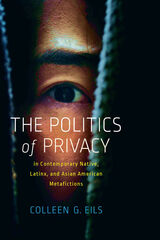 The Politics of Privacy in Contemporary Native, Latinx, and Asian American Metafictions
Colleen G. Eils
Ohio State University Press, 2020 The Politics of Privacy in Contemporary Native, Latinx, and Asian American Metafictions is the first book-length study to approach contemporary issues of racialized visibility and privacy through narrative form. Using a formal maneuver, narrative privacy, Colleen G. Eils analyzes how writers of contemporary metafictions explicitly withhold stories from readers to illuminate and theorize the politics of privacy in a post–9/11 US context. As a formal device and reading strategy, narrative privacy has two primary critical interests: affirming the historically political nature of visibility, particularly for people of color and indigenous people, and theorizing privacy as a political assertion of power over representation and material vulnerability.
Eils breaks strict disciplinary silos by putting visibility/surveillance studies, ethnic studies, and narrative studies in conversation with one another. Eils also puts texts in the Native, Latinx, and Asian American literary canon in conversation with each other. She focuses on texts by Viet Thanh Nguyen, David Treuer, Monique Truong, Rigoberto González, Nam Le, and Stephen Graham Jones that call into question our positions as readers and critics. In deliberately and self-consciously evading readers through the form of their fiction, these writers seize privacy as a political tool for claiming and wielding power in both representational and material registers.
 The Politics of Progressive Education: The Odenwaldschule in Nazi Germany
Dennis Shirley
Harvard University Press, 1992 In March 1933, Nazi storm troopers seized control of the Odenwaldschule, a small German boarding school near Heidelberg. Founded in 1910 by educational reformer Paul Geheeb, the Odenwaldschule was a crown jewel of the progressive education movement, renowned for its emancipatory pedagogical innovations and sweeping curricular reforms. In the tumultuous year that followed that fateful spring, Geheeb moved from an initial effort to accommodate Nazi reforms to an active opposition to the Third Reich’s transformation of the school. Convinced at last that humanistic education was all but impossible under the new regime, he emigrated to Switzerland in March 1934. There he opened a new school, the Ecole d’Humanité, which became a haven for children escaping the horrors of World War II.
In this intimate chronicle of the collision between a progressive educator and fascist ideology during Hitler’s rise to power, Dennis Shirley explores how Nazi school reforms catalyzed Geheeb’s alienation from the regime and galvanized his determination to close the school and leave Germany. Drawing on a wealth of unpublished documents, such as Geheeb’s exhaustive correspondence with government officials and transcripts of combative faculty meetings, Shirley is able to reconstruct in detail the entire drama as it unfolded. Others have examined the intellectual antecedents of Nazism and the regime’s success at developing themes from popular culture for its political purposes; Shirley goes further by analyzing the many ways in which German educators could and did respond to Nazi reforms. In the process he identifies the myriad forces that led individuals to accept or resist the regime’s transformation of education.
The Politics of Progressive Education offers a richly rewarding examination of how education in general, and progressive education in particular, fared in the turbulent political currents of Nazi Germany. It brings to light a remarkable story, hitherto untold, of one individual’s successful attempt to uphold humanistic values in the darkest of circumstances.
 The Politics of Public Health
Turshen, Meredeth
Rutgers University Press, 1989 In the progressive public health tradition, Meredeth Turshen criticizes conventional approaches to disease and offers an alternative framework based on the concept that health and illness are socially produced throughout the world. Using contemporary and historical accounts of great moments and great debates in public health, Turshen exposes the failure to improve health even when a specific program like smallpox vaccination succeeds. Her analyses incorporate theoretical contributions from Marxism and feminism.
The book is divided into four parts. Part 1 outlines current and alternative approaches to health, theories of disease causation, the policies and practices that follow from these theories, and issues of equity and access to health care. A chapter of women's health in three African countries illustrates these concepts. Part 2 describes limits to conventional public health, using case histories of plague control, dioxin decontamination, sanitary reform, and smallpox and malaria eradication. In Part 3, Turshen presents case histories of preventive medicine, nutrition and agribusiness, mental health, and AIDS in Africa to suggest new approaches based on an alternative model of social production. Part 4 looks to the future of public health. It examines basic issues in integrating public health research, training, and services, and concludes with an agenda for action.
 The Politics of Public Health
Turshen, Meredeth
Rutgers University Press, 1989 In the progressive public health tradition, Meredeth Turshen criticizes conventional approaches to disease and offers an alternative framework based on the concept that health and illness are socially produced throughout the world. Using contemporary and historical accounts of great moments and great debates in public health, Turshen exposes the failure to improve health even when a specific program like smallpox vaccination succeeds. Her analyses incorporate theoretical contributions from Marxism and feminism.
The book is divided into four parts. Part 1 outlines current and alternative approaches to health, theories of disease causation, the policies and practices that follow from these theories, and issues of equity and access to health care. A chapter of women's health in three African countries illustrates these concepts. Part 2 describes limits to conventional public health, using case histories of plague control, dioxin decontamination, sanitary reform, and smallpox and malaria eradication. In Part 3, Turshen presents case histories of preventive medicine, nutrition and agribusiness, mental health, and AIDS in Africa to suggest new approaches based on an alternative model of social production. Part 4 looks to the future of public health. It examines basic issues in integrating public health research, training, and services, and concludes with an agenda for action.
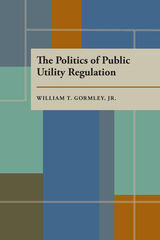 The Politics of Public Utility Regulation
William T. Gormley Jr.
University of Pittsburgh Press, 1983
The Politics of Public Utility Regulation focuses on the important and increasingly controversial issues of utility regulation by combining a sophisticated understanding of these issues with a rigorous examination of various regulatory arrangements across the American states. It draws on interviews with participants in twelve states: public utility commissioners, commission staff members, utility company executives, governmental consumer advocates, and citizen activists. In addition to offering an up-to-date, comprehensive survey of regulatory politics at the state level, Gormley makes specific proposals for regulatory reform and emphasizes the importance (and difficulty) of assuring both expertise and accountability. Students of politics and public policy will find the state-level approach useful in examining the strategies of the “New Federalism” that transfer more and more formerly federal responsibilities to the states.
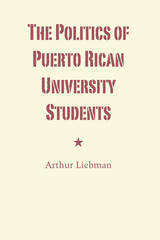 The Politics of Puerto Rican University Students
By Arthur Liebman
University of Texas Press, 1970 In the 1960s, when students everywhere were coming alive politically, and when the Latin American student activist in particular became as archetypal of radicalism as the Latin American dictator was of repression, Puerto Rican students remained strangely silent. With the exception of FUPI, a radical student group with only a small following, student political behavior conformed to that of Puerto Rican society in general—center to conservative. Historically, Puerto Rico has been economically and politically dominated first by Spain and then by the United States. But unlike other colonial dependencies in Latin America, Puerto Rico has never rebelled. Puerto Rican politics centers on the status issue—independence, statehood, or association for the island. But no legendary victories, no heroic defeats offer a battle cry for nationalists, leftists, and independistas. Overwhelming foreign influence in the Church, the schools, the economy, and eventually the mass media deprived the island of any strong indigenous institutions that might foster nationalism. Militancy lies outside the mainstream of Puerto Rican tradition. Against this historical and cultural backdrop, Arthur Liebman closely examines the social background and political activity of students at the Rio Piedras campus of the University of Puerto Rico. Based on personal interviews with students, faculty, and administrators, as well as on a survey of the student body, his study reveals the strength of political inheritance among university students in Puerto Rico. The student left is small and weak largely because the left of the parents’ generation is small and weak. To date, Puerto Rican students have been the children of their parents and of their society. Within a university that emphasizes practicality, the nonmilitant majority of the students study education, business, engineering, and medicine, being trained to participate in and to reap the rewards of the status quo. Student leftists, in the minority, generally study history, economics, sociology, and law—fields that open wider perspectives on their society and its problems and offer no immediate guarantee of its benefits. Brighter, less religious, and more dissatisfied with their role as a student, the student leftists stand apart from their cohort at the University of Puerto Rico. Like their adult counterparts, they are an anomaly in an acquisitive, relatively conservative society.
 The Politics of Pure Science
Daniel S. Greenberg
University of Chicago Press, 1999 The Politics of Pure Science, a pioneering and controversial work, set a new standard for the realistic examination of the place of science in American politics and society. Dispelling the myth of scientific purity and detachment, Daniel S. Greenberg documents in revealing detail the political processes that underpinned government funding of science from the 1940s to the 1970s.
While the book's hard-hitting approach earned praise from a broad audience, it drew harsh fire from many scientists, who did not relish their turn under the microscope. The fact that this dispute is so reminiscent of today's acrimonious "Science Wars" demonstrates that although science has changed a great deal since The Politics of Pure Science first appeared, the politics of science has not—which is why this book retains its importance.
For this new edition, John Maddox (Nature editor emeritus) and Steven Shapin have provided introductory essays that situate the book in broad social and historical context, and Greenberg has written a new afterword taking account of recent developments in the politics of science.
"[A] book of consequence about science as one of the more consequential social institutions in the modern world. It is one that could be understood and should be read by the President, legislators, scientists and the rest of us ordinary folk. . . . Informative and perceptive."—Robert K. Merton, New York Times Book Review
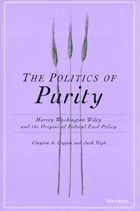 The Politics of Purity: Harvey Washington Wiley and the Origins of Federal Food Policy
Clayton A. Coppin and Jack High
University of Michigan Press, 1999 Spearheaded by Harvey Washington Wiley, the Pure Food and Drugs Act of 1906 launched the federal regulation of food and drugs in the United States. Wiley is often lauded as a champion of public interest for bringing about a law that required healthful ingredients and honest labeling. Clayton Coppin and Jack High demonstrate, however, that Wiley was in fact surreptitiously allied with business firms that would benefit from regulation and moreover, that the law would help him build his government agency, the Federal Bureau of Chemistry.
Coppin and High discuss such issues as Wiley's efforts to assign the law's enforcement to his own bureau. They go on to expose the selectivity of Wiley's enforcement of the law, in which he manipulated commercial competition in order to reward firms that supported him and penalize those that opposed him. By examining the history of the law's movement, the authors show that, rather than acting in the public interest, Wiley used the Pure Food and Drugs Act to further his own power and success. Finally, they analyze government regulation itself as the outcome of two distinct competitive processes, one that takes place in the market, the other in the polity.
The book will interest scholars concerned with government regulation, including those in economics, political science, history, and business.
Clayton Coppin is a management consultant and historian, Koch Industries, Wichita. Jack High is Professor of Economics, George Mason University.
 The Politics of Railroad Coordination, 1933–1936
Earl Latham
Harvard University Press The prudent administrator clearly recognizes the differences between authority and power. The first is the right to wield power and the second is the actual exercise of power. Joseph B. Eastman, as federal coordinator of transportation, had the authority to require acts of railroad coordination but lacked the power. When he tried to exercise authority as though it were power, the railroads combined with the unions and deprived him of his authority.
Earl Latham, in this analysis of the politics of administration, makes use of hitherto unpublished letters and memoranda written by Eastman. Coming at a time when the railroad industry is suffering acutely from its chronic problem of excessive separatism, The Politics of Railroad Coordination is a thought-provoking application of power group analysis to a major problem of administration. It will be of particular interest to persons concerned with problems of the regulation of industry, public administration, the transportation industry, and the method of power group analysis.
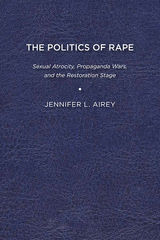 The Politics of Rape: Sexual Atrocity, Propaganda Wars, and the Restoration Stage
Jennifer L. Airey
University of Delaware Press, 2013 The Politics of Rape: Sexual Atrocity, Propaganda Wars, and the Restoration Stage is the first full-length study to examine representations of sexual violence on the Restoration stage. By reading theatrical depictions of sexual violence alongside political tracts, propaganda pamphlets, and circulating broadsides, this study argues that authors used dramatic representations of rape to respond to and engage with late-century upheavals in British political culture. Beginning with an examination of rape scenes in English Civil War propaganda, The Politics of Rape argues that Roundhead authors described acts of rape and atrocity to demonize their enemies, the Irish, the Catholics, and the Cavaliers. After the Restoration, propagandists and playwrights on each side of every political conflict would follow suit, altering the rhetoric of sexual violence in response to each new moment of political upheaval: The Restoration of Charles II, the Second and Third Anglo-Dutch Wars, the Popish Plot, the Exclusion Crisis, the Glorious Revolution, and the accession of William and Mary. The study offers an intensive look at British propaganda culture, gathering together a wealth of understudied pamphlet texts, and identifying a series of stock figures that recur throughout the century: The demonic Irishman, sexually violent villain of the 1641 Irish Rebellion tracts; the debauched Cavalier, the secretly Catholic royalist rapist; the poisonous Catholic bride, the malignant consort who encourages the rapes of Protestant women; the cannibal father, the evil patriarch who rapes his daughters-in-laws before ingesting his own sons as a symbol of monarchical overreach; and the ravished monarch, the male rape victim whose sexual violation protests his political disenfranchisement. The study also traces the appearance of these figures on the British stage, examining well-known works by Dryden, Rochester, Behn, Lee, and Shadwell, alongside lesser-known plays by Orrery, Howard, Settle, Crowne, Ravenscroft, Pix, Cibber, and Brady. The Politics of Rape thus offers a new method for understanding of the geo-political implications of theatrical sexual violence.
Published by University of Delaware Press. Distributed worldwide by Rutgers University Press.
The Politics of Reception: Critical Constructions of Mikhail Zoshchenko
Greg Carleton
Northwestern University Press, 1998 Mikhail Zoshchenko was one of the most popular and contentious Russian writers in the period from 1920 to 1950. Scholars and critics have long enlisted Zoshchenko to fight the cultural battles of early Soviet history, the Cold War, and even the glasnost era. In The Politics of Reception, Gregory Carleton analyzes how and why Zoshchenko's legacy has become a battleground for competing ideological interests.
 The Politics of Religion in an Age of Revival: Studies in Nineteenth-century Europe and Latin America
Edited by Austen Ivereigh
University of London Press, 2010 The nineteenth century saw a lengthy and unusually intense conflict between religion and national politics over public space. The disputes inevitably coloured the politics of the nineteenth century, and defined to a large extent the boundaries of political division. But why were they so ferocious? And what were the battles really about? Is it true that society and state became less religious? Who spoke for the people? What effect did the liberal-Catholic conflict have on the transition to democracy? Using case-studies of nations in both Europe and Latin America the contributors to this unusual comparative volume attempt to answer these and other questions from a revisionist and empirical viewpoint incorporating the latest research and recasting the debate in the light of recent discussions about modernity. A substantial introduction sketches the vital issues and the major conclusions and takes stock of the debate and where it is leading.
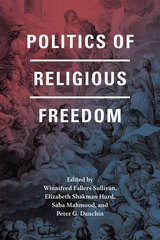 Politics of Religious Freedom
Edited by Winnifred Fallers Sullivan, Elizabeth Shakman Hurd, Saba Mahmood, and Peter G. Danchin
University of Chicago Press, 2015 In a remarkably short period of time, the realization of religious freedom has achieved broad consensus as an indispensable condition for peace. Faced with widespread reports of religious persecution, public and private actors around the world have responded with laws and policies designed to promote freedom of religion. But what precisely is being promoted? What are the cultural and epistemological assumptions underlying this response, and what forms of politics are enabled in the process?
The fruits of the three-year Politics of Religious Freedom research project, the contributions to this volume unsettle the assumption—ubiquitous in policy circles—that religious freedom is a singular achievement, an easily understood state of affairs, and that the problem lies in its incomplete accomplishment. Taking a global perspective, the more than two dozen contributors delineate the different conceptions of religious freedom predominant in the world today, as well as their histories and social and political contexts. Together, the contributions make clear that the reasons for persecution are more varied and complex than is widely acknowledged, and that the indiscriminate promotion of a single legal and cultural tool meant to address conflict across a wide variety of cultures can have the perverse effect of exacerbating the problems that plague the communities cited as falling short.
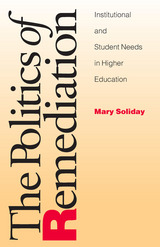 Politics Of Remediation: Institutional And Student Needs In Higher Education
Mary Soliday
University of Pittsburgh Press, 2002
While some students need more writing instruction than others, The Politics of Remediation reveals how that need also pertains to the institutions themselves. Mary Soliday argues that universities may need remedial English to alleviate their own crises in admissions standards, enrollment, mission, and curriculum, and English departments may use remedial programs to mediate their crises in enrollment, electives, and relationships to the liberal arts and professional schools.
Following a brief history of remedial English and the political uses of remediation at CCNY before, during, and after the open admissions policy, Soliday questions the ways in which students’ need for remedial writing instruction has become widely associated with the need to acculturate minorities to the university. In disentangling identity politics from remediation, she challenges a powerful assumption of post-structuralist work: that a politics of language use is equivalent to the politics of access to institutions.
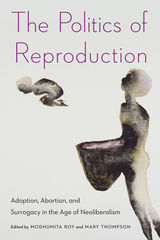 The Politics of Reproduction: Adoption, Abortion, and Surrogacy in the Age of Neoliberalism
Edited by Modhumita Roy and Mary Thompson
Ohio State University Press, 2019 The Politics of Reproduction: Adoption, Abortion and Surrogacy in the Age of Neoliberalism uniquely brings together three sites of reproduction and reproductive politics to demonstrate their entanglement in creating or restricting options for family-making. The original essays in this collection—which draw from a wide range of disciplinary and theoretical perspectives—are attentive to neoliberalism’s reshaping of economies and intimacies to better understand the politics of reproduction. By looking at particular instances (surrogacy in Mexico, forced sterilization in Peru, and racialized biopolitics in post-Katrina Mississippi, among other sites), The Politics of Reproduction focuses on the effects of a radically altered economic landscape on individual choice-making. As a whole, the volume critically engages the question of choice to better understand the costs of a political and ideological climate that encourages, even demands, individual solutions to intractable social problems. Whose choices are amplified in the use of new biomedical technologies and assisted reproduction? Why and how are we discouraged from understanding the economic motivations behind the “choice” to surrender a baby for adoption or to become a surrogate or to seek an abortion? Attentive to the historical, cultural, and ideological conjunctures of reproductive politics, The Politics of Reproduction makes a distinctive contribution to feminist analyses of the specific challenges posed by neoliberalism to reproductive possibilities, politics, and justice in the contemporary moment.
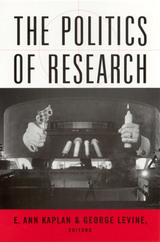 The Politics of Research
Edited by E. Ann Kaplan and George Levine
Rutgers University Press, 1997 "Eloquent, provocative, and timely, these essays provide a thoughtful, undoctrinaire defense of the centrality of the humanities to higher education--and society--at the millennium."--Cora Kaplan, University of Southampton The crisis in the humanities and higher education intensifies daily. The partisan din drowns out the voices of those thinkers who have resisted the seductions of strong ideology. Against the tendencies of the extreme attacks on higher education from the right and the counterattacks from the left, many academics would prefer to get beyond critical fashions and easy slogans. In this collection, leading scholars demonstrate how the current furor threatens the critical analysis of culture, so vital to a healthy society. They explore the historical sources of the crisis, the relations between politics and research, the responsibilities and possibilities of the academic intellectual, the structure of the institution of the university, the functions and achievements of the humanities, and the development of interdisciplinarity as a catalyst for change. This volume is a necessary resource for understanding the current crisis and for transforming the academy as we approach the twenty-first century. The contributors are Jonathan Arac, Lauren Berlant, Peter Brooks, Roman de la Campa, Myra Jehlen, Stanley Katz, Richard Kramer, Dominick LaCapra, George Levine, Ellen Messer-Davidow, Helene Moglen, Bill Readings, and Bruce Robbins. E. Ann Kaplan is the director of The Humanities Institute at the State University of New York at Stony Brook
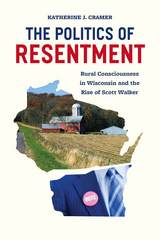 The Politics of Resentment: Rural Consciousness in Wisconsin and the Rise of Scott Walker
Katherine J. Cramer
University of Chicago Press, 2016 Since the election of Scott Walker, Wisconsin has been seen as ground zero for debates about the appropriate role of government in the wake of the Great Recession. In a time of rising inequality, Walker not only survived a bitterly contested recall that brought thousands of protesters to Capitol Square, he was subsequently reelected. How could this happen? How is it that the very people who stand to benefit from strong government services not only vote against the candidates who support those services but are vehemently against the very idea of big government?
With The Politics of Resentment, Katherine J. Cramer uncovers an oft-overlooked piece of the puzzle: rural political consciousness and the resentment of the “liberal elite.” Rural voters are distrustful that politicians will respect the distinct values of their communities and allocate a fair share of resources. What can look like disagreements about basic political principles are therefore actually rooted in something even more fundamental: who we are as people and how closely a candidate’s social identity matches our own. Using Scott Walker and Wisconsin’s prominent and protracted debate about the appropriate role of government, Cramer illuminates the contours of rural consciousness, showing how place-based identities profoundly influence how people understand politics, regardless of whether urban politicians and their supporters really do shortchange or look down on those living in the country.
The Politics of Resentment shows that rural resentment—no less than partisanship, race, or class—plays a major role in dividing America against itself.
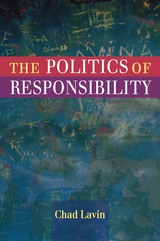 The Politics of Responsibility
Chad Lavin
University of Illinois Press, 2007 Politics cannot function without responsibility, but there have been serious disagreements about how responsibility is to be understood and huge controversies about how it is to be distributed, rewarded, legislated, and enforced. The liberal notions of personal responsibility that have dominated political thinking in the West for more than a century are rooted in the familiar territory of individual will and causal blame, but these theories have been assailed as no longer adequate to explain or address the political demands of a global social structure. Informed by Marx, Foucault, and Butler, Chad Lavin argues for a "postliberal" theory of responsibility, formulating responsibility as a process that is anchored in a persistent ability to respond, not reproach. Lavin works this formulation through discussions of contemporary political issues such as globalization, police brutality, and abortion. Rather than assigning individual blame, postliberal responsibility challenges the supposed autonomy of individual subjects by taking structural arguments into account. Lavin concludes that a liberal concept of responsibility gives rise to a moralistic and oppressive approach to social problems, while a postliberal approach highlights a shared responsibility for developing collective solutions to systemic problems. Postliberal responsibility not only suggests more generous and democratic responses to social ills, it also allows us to theorize a greater range of issues that demand political response.
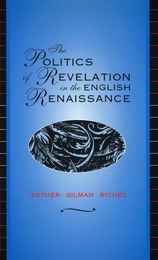 The Politics of Revelation in the English Renaissance
Ester Gilman Richey
University of Missouri Press, 1998
Recognizing that the seventeenth century's volatile debate over apocalyptic interpretation has since become a one-sided discussion, Esther Gilman Richey develops a context that recovers the dynamism so inherent in the writings of the period and provides illuminating details that enhance the prophetic continuum. The Politics of Revelation in the English Renaissance does not ignore the familiar prophetic verse of Spenser and Milton, but it significantly expands the scope of study by examining the interpretations of both men and women who represent a range of ecclesiastical and political perspectives.
Richey rejects Barbara Lewalski's claim that the radical, prophetic writers and metaphysical poets of the seventeenth century drew inspiration from distinct biblical models, the former from the Apocalypse and the latter from the Psalms. Instead she contends that even writers such as Donne and Herbert, whom we have long considered "literary," were in reality using their poetry to participate in the hottest debates of the time.
While the radical writers, such as Spenser and Milton, were immediately responsive to ecclesiastical and political controversies, the conservative, metaphysical poets—Donne, Herbert, and Vaughan—were posing equally politically charged questions: Is the pope Antichrist? Is the Bride of Christ pure? Is the Temple a model of ecclesiastical reform? The writers of the period did not move in divided and distinguished worlds, but in fact constantly responded to one another through poetic and politically charged dialogue.
By drawing from the writings of various individuals, both radical and conformist, male and female, Richey traces the shifting representations of the apocalyptic Bride and Temple over time. Organized chronologically, the chapters of The Politics of Revelation in the English Renaissance reveal the escalating debate among the pacifists, conformists, militants, and feminists. Not only does Richey uncover the prophetic dimension of conformist writers usually described as apolitical and devotional, but she also explores the writings of lesser-known women prophets: Aemilia Lanyer, Mary Cary, Anna Trapnel, and Margaret Fell. In such biblical passages as the apocalyptic "woman clothed with the sun," these early feminists find the authority for their own prophetic speech.
This provocative analysis—at once far-reaching and tightly focused—reveals the complexity of the apocalyptic discourse that transpired among Renaissance writers and poets.
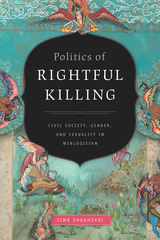 Politics of Rightful Killing: Civil Society, Gender, and Sexuality in Weblogistan
Sima Shakhsari
Duke University Press, 2020 In the early 2000s, mainstream international news outlets celebrated the growth of Weblogistan—the online and real-life transnational network of Iranian bloggers—and depicted it as a liberatory site that gave voice to Iranians. As Sima Shakhsari argues in Politics of Rightful Killing, the common assumptions of Weblogistan as a site of civil society consensus and resistance to state oppression belie its deep internal conflicts. While Weblogistan was an effective venue for some Iranians to “practice democracy,” it served as a valuable site for the United States to surveil bloggers and express anti-Iranian sentiment and policies. At the same time, bloggers used the network to self-police and enforce gender and sexuality norms based on Western liberal values in ways that unwittingly undermined Weblogistan's claims of democratic participation. In this way, Weblogistan became a site of cybergovernmentality, where biopolitical security regimes disciplined and regulated populations. Analyzing online and off-line ethnography, Shakhsari provides an account of digital citizenship that raises questions about the internet's relationship to political engagement, militarism, and democracy.
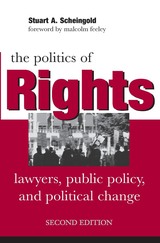 The Politics of Rights: Lawyers, Public Policy, and Political Change
Stuart A. Scheingold
University of Michigan Press, 2004 Stuart A. Scheingold's landmark work introduced a new understanding of the contribution of rights to progressive social movements, and thirty years later it still stands as a pioneering and provocative work, bridging political science and sociolegal studies. In the preface to this new edition, the author provides a cogent analysis of the burgeoning scholarship that has been built on the foundations laid in his original volume. A new foreword from Malcolm Feeley of Berkeley's Boalt Hall School of Law traces the intellectual roots of The Politics of Rights to the classic texts of social theory and sociolegal studies. "Scheingold presents a clear, thoughtful discussion of the ways in which rights can both empower and constrain those seeking change in American society. While much of the writing on rights is abstract and obscure, The Politics of Rights stands out as an accessible and engaging discussion." -Gerald N. Rosenberg, University of Chicago "This book has already exerted an enormous influence on two generations of scholars. It has had an enormous influence on political scientists, sociologists, and anthropologists, as well as historians and legal scholars. With this new edition, this influence is likely to continue for still more generations. The Politics of Rights has, I believe, become an American classic." -Malcolm Feeley, Boalt Hall School of Law, University of California, Berkeley, from the foreword Stuart A. Scheingold is Professor Emeritus of Political Science at the University of Washington.
Politics of Risk-Taking: Welfare State Reform in Advanced Democracies
Barbara Vis
Amsterdam University Press, 2010
How much and in which direction have the welfare states among the Western democracies changed over the past decades? Moreover, under what conditions have governments enacted these changes? Based on insights from prospect theory, Barbara Vis demonstrates how socioeconomic or political setbacks affect a government’s view of risk—and thereby the degree and type of reform they pursue. This study’s new theoretical stance and innovative methodological approach make it a must read for those policymakers, scholars, and students interested in the politics of welfare state reform.
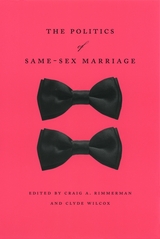 The Politics of Same-Sex Marriage
Edited by Craig A. Rimmerman and Clyde Wilcox
University of Chicago Press, 2007 Same-sex marriage emerged in 2004 as one of the hottest issues of the campaign season. But in a severe blow to gay rights advocates, all eleven states that had the issue on the ballot passed amendments banning the practice, and the subject soon dropped off the media’s radar. This pattern of waxing and waning in the public eye has characterized the debate over same-sex marriage since 1996 and the passing of the Defense of Marriage Act. Since then, court rulings and local legislatures have kept the issue alive in the political sphere, and conservatives and gay rights advocates have made the issue a key battlefield in the culture wars.
The Politics of Same-Sex Marriage brings together an esteemed list of scholars to explore all facets of this heated issue, including the ideologies and strategies on both sides of the argument, the public’s response, the use of the issue in political campaigns, and how same-sex marriage fits into the broad context of policy cycles and windows of political opportunity. With comprehensive coverage from a variety of different approaches, this volume will be a vital sourcebook for activists, politicians, and scholars alike.
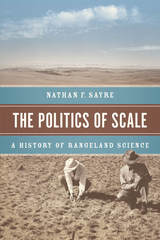 The Politics of Scale: A History of Rangeland Science
Nathan F. Sayre
University of Chicago Press, 2017 Rangelands are vast, making up one quarter of the United States and forty percent of the Earth’s ice-free land. And while contemporary science has revealed a great deal about the environmental impacts associated with intensive livestock production—from greenhouse gas emissions to land and water degradation—far less is known about the historic role science has played in rangeland management and politics. Steeped in US soil, this first history of rangeland science looks to the origins of rangeland ecology in the late nineteenth-century American West, exploring the larger political and economic forces that—together with scientific study—produced legacies focused on immediate economic success rather than long-term ecological well being.
During the late 1880s and early 1890s, a variety of forces—from the Homestead Act of 1862 to the extermination of bison, foreign investment, and lack of government regulation—promoted free-for-all access to and development of the western range, with disastrous environmental consequences. To address the crisis, government agencies turned to scientists, but as Nathan F. Sayre shows, range science grew in a politically fraught landscape. Neither the scientists nor the public agencies could escape the influences of bureaucrats and ranchers who demanded results, and the ideas that became scientific orthodoxy—from fire suppression and predator control to fencing and carrying capacities—contained flaws and blind spots that plague public debates about rangelands to this day. Looking at the global history of rangeland science through the Cold War and beyond, The Politics of Scale identifies the sources of past conflicts and mistakes and helps us to see a more promising path forward, one in which rangeland science is guided less by capital and the state and more by communities working in collaboration with scientists.
 The Politics of School Reform, 1870 - 1940
Paul E. Peterson
University of Chicago Press, 1985 Was school reform in the decades following the Civil War an upper-middle-class effort to maintain control of the schools? Was public education simply a vehicle used by Protestant elites to impose their cultural ideas upon recalcitrant immigrants? In The Politics of School Reform, 1870-1940, Paul E. Peterson challenges such standard, revisionist interpretations of American educational history. Urban public schools, he argues, were part of a politically pluralistic society. Their growth—both in political power and in sheer numbers—had as much to do with the demands and influence of trade unions, immigrant groups, and the public more generally as it did with the actions of social and economic elites.
Drawing upon rarely examined archival data, Peterson demonstrates that widespread public backing for the common school existed in Atlanta, Chicago, and San Francisco. He finds little evidence of systematic discrimination against white immigrants, at least with respect to classroom crowding and teaching assignments. Instead, his research uncovers solid trade union and other working-class support for compulsory education, adequate school financing, and curricular modernization.
Urban reformers campaigned assiduously for fiscally sound, politically strong public schools. Often they had at least as much support from trade unionists as from business elites. In fact it was the business-backed machine politicians—from San Francisco's William Buckley to Chicago's Edward Kelly—who deprived the schools of funds. At a time when public schools are being subjected to searching criticism and when new educational ideas are gaining political support, The Politics of School Reform, 1870-1940 is a timely reminder of the strength and breadth of those groups that have always supported "free" public schools.
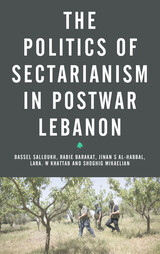 The Politics of Sectarianism in Postwar Lebanon
Bassel Salloukh, Rabie Barakat, Jinan S. Al-Habbal, Lara W. Khattab and Shoghig Mikaelian
Pluto Press, 2015 The Arab Spring unsettled regimes across North Africa and the Middle East, from Morocco to Oman. Lebanon, however, proved immune. How can that be explained? What features of Lebanese politics and governance could account for the system’s ability to withstand the domestic and regional pressures unleashed by the Arab Spring?
The Politics of Sectarianism in Postwar Lebanon builds on extensive field work to find the answers to those questions and more. Bassel Salloukh, Lebanon’s leading political scientist, analyses the mix of institutional, clientelist, and discursive practices that sustain the sectarian nature of Lebanon, revealing an expanding sectarian web that occupies ever-more-substantial areas of everyday life in Lebanon. It also highlights the struggles waged by opponents of the system, including women, public sector employees, teachers, students, and NGO-based coalitions, and how their efforts often fail to bear fruit because of sabotage by various systematic forces.
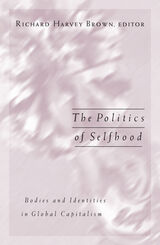 Politics Of Selfhood: Bodies And Identities In Global Capitalism
Richard Harvey Brown
University of Minnesota Press, 2003 Looks at the ways social change is expressed through debates over identities and bodies In bodies and selves, we can see politics, economics, and culture play out, and the tensions and crises of society made visible. The women’s movement, lobbies for the elderly, pro-choice and pro-life movements, AIDS research and education, pedophilia and repressed memory, global sports spectacles, organ donor networks, campaigns for safe sex, chastity, or preventive medicine—all are aspects of the contemporary politics of bodies and identities touched on in this book. Three broad themes run through the collection: how the body is constructed in various ways for different purposes, how the electronic media and its uses shape selves and sensualities and contribute to civic discourse, and how global capitalism acts as a direct force in these processes. By taking a distinctly cross-cultural and comparative approach, this volume explores more fully than ever the political, economic, institutional, and cultural settings of corporeality, identity, and representation. Contributors: Antonella Fabri, John Jay College and New York Academy of Medicine; Eva Illouz, Hebrew U of Jerusalem; Philip W. Jenks, Portland State U; Lauren Langman, Loyola U; Timothy W. Luke, Virginia Polytechnic Institute and State U; Timothy McGettigan, Colorado State U, Pueblo; Margaret J. Tally, SUNY, Empire State College.
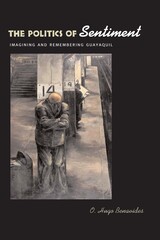 The Politics of Sentiment: Imagining and Remembering Guayaquil
By O. Hugo Benavides
University of Texas Press, 2006 Between 1890 and 1930, the port city of Guayaquil, Ecuador, experienced a liberal revolution and a worker's movement—key elements in shaping the Ecuadorian national identity. In this book, O. Hugo Benavides examines these and other pivotal features in shaping Guayaquilean identity and immigrant identity formation in general in transnational communities such as those found in New York City. Turn-of-the-century Ecuador witnessed an intriguing combination of transformations: the formation of a national citizenship; extension of the popular vote to members of a traditional underclass of Indians and those of African descent; provisions for union organizing while entering into world market capitalist relations; and a separation of church and state that led to the legalization of secular divorces. Assessing how these phenomena created a unique cultural history for Guayaquileans, Benavides reveals not only a specific cultural history but also a process of developing ethnic attachment in general. He also incorporates a study of works by Medardo Angel Silva, the Afro-Ecuadorian poet whose singular literature embodies the effects of Modernism's arrival in a locale steeped in contradictions of race, class, and sexuality. Also comprising one of the first case studies of Raymond Williams's hypothesis on the relationship between structures of feeling and hegemony, this is an illuminating illustration of the powerful relationships between historically informed memories and contemporary national life.
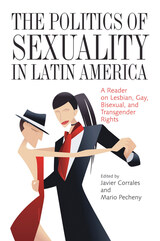 The Politics of Sexuality in Latin America: A Reader on Lesbian, Gay, Bisexual, and Transgender Rights
Javier Corrales
University of Pittsburgh Press, 2010 The city of Buenos Aires has guaranteed all couples, regardless of gender, the right to register civil unions. Mexico City has approved the Cohabitation Law, which grants same-sex couples marital rights identical to those of common-law relationships between men and women. Yet, a gay man was murdered every two days in Latin America in 2005, and Brazil recently led the world in homophobic murders. These facts illustrate the wide disparity in the treatment and rights of lesbian, gay, bisexual, and transgender (LGBT) populations across the region.
The Politics of Sexuality in Latin America presents the first English-language reader on LGBT politics in Latin America. Representing a range of contemporary works by scholars, activists, analysts, and politicians, the chapters address LGBT issues in nations from Cuba to Argentina. In their many findings, two main themes emerge: the struggle for LGBT rights has made significant inroads in the first decade of the twenty-first century (though not in every domain or every region); and the advances made were slow in coming compared to other social movements.
The articles uncover the many obstacles that LGBT activists face in establishing new laws and breaking down societal barriers. They identify perhaps the greatest roadblock in Latin American culture as an omnipresent system of “heteronormativity,” wherein heterosexuality, patriarchalism, gender hierarchies, and economic structures are deeply rooted in nearly every level of society. Along these lines, the texts explore specific impediments including family dependence, lack of public spaces, job opportunities, religious dictums, personal security, the complicated relationship between leftist political parties and LGBT movements in the region, and the ever-present “closets,” which keep LGBT issues out of the public eye.
The volume also looks to the future of LGBT activism in Latin America in areas such as globalization, changing demographics, the role of NGOs, and the rise of economic levels and education across societies, which may aid in a greater awareness of LGBT politics and issues. As the editors posit, to be democratic in the truest sense of the word, nations must recognize and address all segments of their populations.
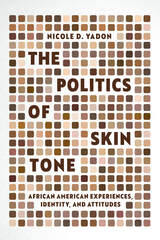 The Politics of Skin Tone: African American Experiences, Identity, and Attitudes
Nicole D. Yadon
University of Chicago Press, 2025 A nuanced examination of the salience of skin tone within African American politics. Research shows that skin tone is associated with significant differences in life experiences. On average, African Americans with darker skin earn lower wages, suffer worse health outcomes, and endure more negative criminal justice experiences than lighter-skinned African Americans. Nicole D. Yadon conceptualizes skin tone as one facet of the multidimensional construct of race that powerfully influences racialized experiences which, in turn, can influence political identities and attitudes. Drawing on evidence from one hundred in-depth interviews, multiple surveys, and a survey experiment, The Politics of Skin Tone investigates the political associations of skin tone. Yadon finds that skin tone correlates with political attitudes, particularly on issues where color-based disparities are especially pronounced such as criminal justice. Moreover, a sizable number of African Americans adopt a skin tone-based identity. In an era of shifting racial boundaries and growing color-based discrimination, The Politics of Skin Tone examines the implications for both scholars and policymakers.
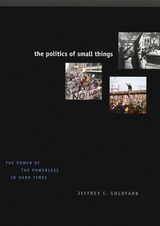 The Politics of Small Things: The Power of the Powerless in Dark Times
Jeffrey C. Goldfarb
University of Chicago Press, 2006 Political change doesn’t always begin with a bang; it often starts with just a whisper. From the discussions around kitchen tables that led to the dismantling of the Soviet bloc to the more recent emergence of Internet initiatives like MoveOn.org and Redeem the Vote that are revolutionizing the American political landscape, consequential political life develops in small spaces where dialogue generates political power.
In The Politics of Small Things, Jeffrey Goldfarb provides an innovative way for understanding politics, a way of appreciating the significance of politics at the micro level by comparatively analyzing key turning points and institutions in recent history. He presents a sociology of human interactions that lead from small to large: dissent around the old Soviet bloc; life on the streets in Warsaw, Prague, and Bucharest in 1989; the network of terror that spawned 9/11; and the religious and Internet mobilizations that transformed the 2004 presidential election, to name a few. In such pivotal moments, he masterfully shows, political autonomy can be generated, presenting alternatives to the big politics of the global stage and the dominant narratives of terrorism, antiterrorism, and globalization.
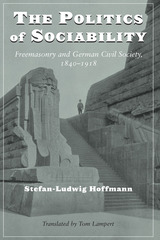 The Politics of Sociability: Freemasonry and German Civil Society, 1840-1918
Stefan-Ludwig Hoffmann
University of Michigan Press, 2007 An ambitious, original work, The Politics of Sociability is Stefan-Ludwig Hoffmann's exploration of the social and political significance of Freemasonry in German history. Drawing on de Tocqueville's theory that without civic virtue there is no civil society, and that civic virtue unfolds only through the social interaction between citizens, Hoffmann examines the critical link between Freemasonry and the evolution of German civil society in the late nineteenth century. The practice of Masonic sociability reflected an enlightened belief in the political significance of moral virtue for civil society, indeed, for humanity. Freemasons' self-image as civilizing agents, acting in good faith and with the unimpeachable idea of universal brotherhood, was contradicted not only by their heightened sense of exclusivity; Freemasons unintentionally exacerbated nineteenth-century political conflicts---for example, between liberals and Catholics, or Germans and French---by employing a universalist language. Using a wealth of archival sources previously unavailable, Stefan-Ludwig Hoffmann shows how Freemasonry became a social refuge for elevated and liberal-minded bourgeois men who felt attracted to its secret rituals and moral teachings. German Freemasons sought to reform self and society but, Hoffmann argues, ultimately failed to balance modern politics with a cosmopolitan ethos. Hoffmann illuminates a capacious history of the political effects of Enlightenment concepts and practices in a century marked by nationalism, social discord, and religious conflict. Stefan-Ludwig Hoffmann is Assistant Professor of Modern History at Ruhr-University Bochum. The German edition of this book, Die Politik der Geselligkeit: Freimaurerlogen in der deutschen Bürgergesellschaft, 1840-1918 (Vandenhoeck & Ruprecht, 2000), won the Association of German Historians' 2002 Hedwig Hintze Prize for Best First Book. Tom Lampert was born in Boston in 1962 and grew up in northern California. He received a BA in political science from Stanford University (1986) and a PhD in government from Cornell (1998). His book, Ein einziges Leben (Hanser Verlag 2001) was published as One Life by Harcourt in 2004, which he translated himself. Lampert has worked as a freelance translator since 1998. He currently lives in Bad Kreuznach, Germany. Cover Image: Monument of the Battle of the Nations in Leipzig, erected between 1898 and 1913 by German Freemasons, Barbarossa-Head by Christian Behrens, located next to the stairs leading to the monument. The German mythical figure of the Kaiser Barbarossa is depicted as a sphinx, which in Masonic symbolism protects the Masonic secret from profanation. Courtesy of the Deutsche Bücherei, Leipzig. "This is an exemplary study of the role of Freemasonry in the German Bürgergesellschaft (civil society) of the nineteenth and early twentieth centuries, concise, comprehensive, and well written. It combines social profiling with a careful examination of contemporary concepts in a long-term diachronic study, based on an impressive amount of primary material. . . . Hoffmann's empirically and methodologically convincing study is not only a major contribution to our understanding of Freemasonry in the German Bürgergesellschaft. It also reflects the complex social and political transformation of German society in the nineteenth century and the difficulties contemporaries faced in responding to it."
---German History "Hoffmann's arguments are theoretically informed, supported by a wealth of archival sources. . . . Indeed, in many ways this is the best combination of painstaking social history and well-argued Begriffsgeschichte (conceptual history). . . . One of the great virtues of this book is that Hoffmann does not shy away from the contradictions in the Freemasons' rhetoric and actions. Such contradictions, in fact, are key to the Mason's importance, because they force us to rethink some of our assumptions about Imperial Germany. . . . This is an important book that encourages us to rethink many of our characterizations of the German Kaiserreich and our assumptions about civil society."
---Central European History "Based on a rich variety of sources. . . . Hoffmann explores the evolving relationship between Freemasonry and the monarchy, state, and church, and he also scrutinizes the internal practices and discourse of these notoriously secretive and cosmopolitan societies. . . . Hoffmann engages fruitfully with a wide historiography covering themes such as masculinity and racism, he dissects the complex attitude of Freemasonry to Jews and Catholics, and he scrutinizes the attacks of its conservative, clerical, and antisemitic critics."
---Journal of Modern History
 The Politics of Social Change: From the Sixties to the Present Through the Eyes of a Generation
Larry M. Bartels and Katherine J. Cramer
University of Chicago Press How did we get to this point in American politics? Drawing on insights from an unprecedented decades-long study of ordinary Americans’ political lives, this book tells the story of how, why, and when our politics fractured. Few time periods have been as defined by waves of monumental social change as the United States during the 1960s. Even today, almost sixty years later, the era is often depicted as a triumph of social progress. Yet, as Larry M. Bartels and Katherine J. Cramer show in The Politics of Social Change, it was Americans’ diverse reactions to the milestone events of the time—from the welcoming, to the fiercely resistant, to the largely oblivious—that planted the seeds of our current political turmoil. Their masterful analysis draws on a unique historical resource: the longest-running systematic tracking of individual Americans’ political attitudes and behavior ever attempted. The study began in 1965 when researchers interviewed hundreds of high school students across the country and then periodically reinterviewed them over the next three decades. Bartels and Cramer supplement this historical record with in-depth interviews with dozens of the original students, painting a detailed picture of the generation’s individual and collective political development. By tracing the responses of the Class of ’65 to major events of their political lifetimes—including the Civil Rights and Women’s Rights movements, the Vietnam War, the shifting role of religion, escalating economic inequality, immigration, and the rise of Donald Trump—Bartels and Cramer shed new light on the evolution of public opinion and the unsteady progress of American democracy.
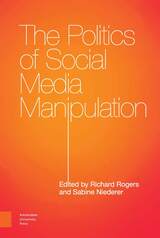 The Politics of Social Media Manipulation
Richard Rogers
Amsterdam University Press, 2020 Disinformation and so-called fake news are contemporary phenomena with rich histories. Disinformation, or the willful introduction of false information for the purposes of causing harm, recalls infamous foreign interference operations in national media systems. Outcries over fake news, or dubious stories with the trappings of news, have coincided with the introduction of new media technologies that disrupt the publication, distribution and consumption of news -- from the so-called rumour-mongering broadsheets centuries ago to the blogosphere recently. Designating a news organization as fake, or der Lügenpresse, has a darker history, associated with authoritarian regimes or populist bombast diminishing the reputation of 'elite media' and the value of inconvenient truths. In a series of empirical studies, using digital methods and data journalism, the authors inquire into the extent to which social media have enabled the penetration of foreign disinformation operations, the widespread publication and spread of dubious content as well as extreme commentators with considerable followings attacking mainstream media as fake.
 The Politics of Social Protest: Comparative Perspectives on States and Social Movements
J. Craig Jenkins and Bert Klandermans, Editors
University of Minnesota Press, 1995 The Politics of Social Protest was first published in 1995. Minnesota Archive Editions uses digital technology to make long-unavailable books once again accessible, and are published unaltered from the original University of Minnesota Press editions. Bringing together celebrated scholars from diverse traditions and backgrounds, The Politics of Social Protest focuses on the reciprocal relationships among social movements, states, and political parties. The volume is organized around three key questions: Why do citizens resort to the often risky and demanding strategy of using disruptive protest when other channels of political intervention appear to be available? What is the relationship between social protest movements and systems of political representation? And what is the impact of the structure and development of the state on social movements themselves? Contributors include Ronald Aminzade, University of Minnesota; Paul Burstein, University of Washington; Russell J. Dalton, University of California, Irvine; Donatella della Porta, University of Florence; Henry Dietz, University of Texas, Austin; Rachel L. Einwohner, University of Washington; Steven E. Finkel, University of Virginia; Jerrold D. Green, University of Arizona; Jocelyn Hollander, University of Washington; Hanspeter Kriesi, University of Geneva; Diarmuid Maguire, University of Sydney; Bronislaw Misztal, Indiana University, Fort Wayne; Edward N. Muller, University of Arizona; Michael Nollert, University of Trier; Karl-Dieter Opp, University of Hamburg; Dieter Rucht, Wissenschaftszentrum Berlin; Michael Wallace, Indiana University; and Gadi Wolfsfeld, Hebrew University of Jerusalem. J. Craig Jenkins is professor of sociology at The Ohio State University. He is the author of The Politics of Insurgency: The Farm Worker Movement of the 1960's (1985). Bert Klandermans is professor of applied social psychology at Free University in Amsterdam, the Netherlands. He has published widely on social movements in journals such as the American Sociological Review, Sociological Forum, and the European Journal of Social Psychology. He is the editor of the Social Movements, Protest, and Contention series for the University of Minnesota Press. Copublished with UCL Press, London.
The Politics of Social Security in Brazil
James Malloy
University of Pittsburgh Press, 1979 Brazil has one of the most elaborate social security systems in Latin America. This study follows the progressive evolution of social insurance policy from 1889 to 1979, through four alternating periods of democratic and authoritarian governments: oligarchic democracy, organic authoritarianism, populist democracy, and bureaucratic authoritarianism.
The Politics of Solidarity: Privatisation, Precarious Work and Labour in South Africa
Carmen Ludwig
Campus Verlag, 2019 Politics of Solidarity explores the transformation of public services in post-apartheid South Africa and the effects of privatization in three cities: Johannesburg, Ekurhuleni, and Cape Town. Drawing on extensive qualitative fieldwork, Carmen Ludwig sheds light on local conflicts on the provision of public services and on trade union strategies that cope with rising public-private partnerships. In the face of persistent social inequality and the rise of precarious work, Ludwig asks how trade unions can create solidarity in fragmented workforces and bridge the gap between permanent workers and those on the margins in the workplace and society. Politics of Solidarity offers insights into the changing world of municipal work, the struggles of precarious workers and more broadly, on the labor dynamics of contemporary South Africa.
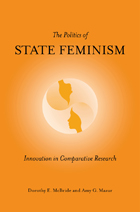 The Politics of State Feminism: Innovation in Comparative Research
Authored by Dorothy E. McBride and Amy G. Mazur
Temple University Press, 2012 The Politics of State Feminism addresses essential questions of women's movement activism and political change in western democracies. The authors—top gender and politics scholars—provide a comparative analysis of the effectiveness of government agencies and women's movements regarding women’s policy issues—if, how, and why they form a kind of state feminism. The central research questions are examined across five issue areas in thirteen postindustrial democracies in Europe and North America from the 1960s through the early 2000s. The authors explore a range of topics drawn from contemporary theory, interactions between descriptive and substantive representation, and the place of institutions in democratic change. Using the innovative qualitative and quantitative methods employed by the Research Network on Gender Politics and the State, the authors have developed a new body of theories about the role of state feminism and how it can help further women’s rights.
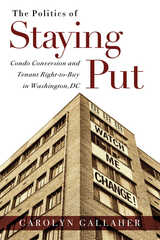 The Politics of Staying Put: Condo Conversion and Tenant Right-to-Buy in Washington, DC
Carolyn Gallaher
Temple University Press, 2016 When cities gentrify, it can be hard for working-class and low-income residents to stay put. Rising rents and property taxes make buildings unaffordable, or landlords may sell buildings to investors interested in redeveloping them into luxury condos. In her engaging study The Politics of Staying Put, Carolyn Gallaher focuses on a formal, city-sponsored initiative—The Tenant Opportunity to Purchase Act (TOPA)—that helps people keep their homes. This law, unique to the District of Columbia, allows tenants in apartment buildings contracted for sale the right to refuse the sale and purchase the building instead. In the hands of tenants, a process that would usually hurt them—conversion to a condominium or cooperative—can instead help them. Taking a broad, city-wide assessment of TOPA, Gallaher follows seven buildings through the program’s process. She measures the law’s level of success and its constraints. Her findingshave relevance for debates in urban affairs about condo conversion, urban local autonomy, and displacement.
The Politics of Street Crime: Criminal Process and Cultural Obsession
Stuart A. Scheingold
Temple University Press, 1992 Americans find street crime terrifying and repellent. Yet we vicariously seek it out in virtually all of our media: books, newspapers, television, films, and the theatre. Stuart Scheingold confronts this cultural contradiction and asks why street crime is generally regarded in the trivializing and punitive images of cops and robbers that attribute crime to the willful acts of flawed individuals rather than to the structural shortcomings of a flawed society. In his case study of the police and criminal courts in the community he calls "Cedar City," a medium-sized city in the Western United States, Scheingold examines the effects of this cultural contradiction and these punitive predispositions on politics and policy making.
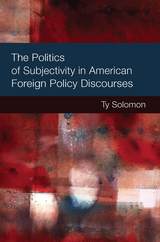 The Politics of Subjectivity in American Foreign Policy Discourses
Ty Solomon
University of Michigan Press, 2015 Why are some discourses more politically efficacious than others? Seeking answers to this question, Ty Solomon develops a new theoretical approach to the study of affect, identity, and discourse—core phenomena whose mutual interweaving have yet to be fully analyzed in International Relations. Drawing upon Jacques Lacan’s psychoanalytic theory and Ernesto Laclau’s approach to hegemonic politics, Solomon argues that prevailing discourses offer subtle but powerfully appealing opportunities for affective investment on the part of audiences. Through empirical case studies of the affective resonances of the war on terror and the rise and fall of neoconservative influence in American foreign policy, Solomon offers a unique way to think about the politics of identity as the construction of “common sense” powerfully underpinned by affective investments. He provides both a fuller understanding of the emotional appeal of political rhetoric in general and, specifically, a provocative explanation of the reasons for the reception of particular U.S. foreign policy rhetoric that shifted Americans’ attitudes toward neoconservative foreign policy in the 1990s and shaped the post-9/11 “war on terror.”
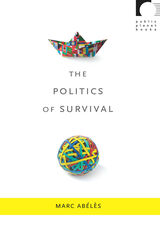 The Politics of Survival
Marc Abélès
Duke University Press, 2010 In this provocative analysis of global politics, the anthropologist Marc Abélès argues that the meaning and aims of political action have radically changed in the era of globalization. As dangers such as terrorism and global warming have moved to the fore of global consciousness, foreboding has replaced the belief that tomorrow will be better than today. Survival, outlasting the uncertainties and threats of a precarious future, has supplanted harmonious coexistence as the primary goal of politics. Abélès contends that this political reorientation has changed our priorities and modes of political action, and generated new debates and initiatives. The proliferation of supranational and transnational organizations—from the European Union to the World Trade Organization (WTO) to Oxfam—is the visible effect of this radical transformation in our relationship to the political realm. Areas of governance as diverse as the economy, the environment, and human rights have been partially taken over by such agencies. Non-governmental organizations in particular have become linked with the mindset of risk and uncertainty; they both reflect and help produce the politics of survival. Abélès examines the new global politics, which assumes many forms and is enacted by diverse figures with varied sympathies: the officials at meetings of the WTO and the demonstrators outside them, celebrity activists, and online contributors to international charities. He makes an impassioned case that our accounts of globalization need to reckon with the preoccupations and affiliations now driving global politics. The Politics of Survival was first published in France in 2006. This English-language edition has been revised and includes a new preface.
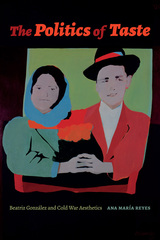 The Politics of Taste: Beatriz González and Cold War Aesthetics
Ana María Reyes
Duke University Press, 2019 In The Politics of Taste Ana María Reyes examines the works of Colombian artist Beatriz González and Argentine-born art critic, Marta Traba, who championed González's art during Colombia's National Front coalition government (1958–74). During this critical period in Latin American art, artistic practice, art criticism, and institutional objectives came into strenuous yet productive tension. While González’s triumphant debut excited critics who wanted to cast Colombian art as modern, sophisticated, and universal, her turn to urban lowbrow culture proved deeply unsettling. Traba praised González's cursi (tacky) recycling aesthetic as daringly subversive and her strategic localism as resistant to U.S. cultural imperialism. Reyes reads González's and Traba's complex visual and textual production and their intertwined careers against Cold War modernization programs that were deeply embedded in the elite's fear of the masses and designed to avert Cuban-inspired revolution. In so doing, Reyes provides fresh insights into Colombia's social anxieties and frustrations while highlighting how interrogations of taste became vital expressions of the growing discontent with the Colombian state.
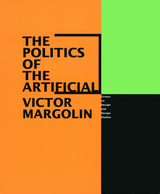 The Politics of the Artificial: Essays on Design and Design Studies
Victor Margolin
University of Chicago Press, 2002 Emerging from the world of commercial art and product styling, design has now become completely integrated into human life. Its marks are all around us, from the chairs we sit on to the Web sites on our computer screens.
One of the pioneers of design studies and still one of its most distinguished practitioners, Victor Margolin here offers a timely meditation on design and its study at the turn of the millennium and charts new directions for the future development of both fields. Divided into sections on the practice and study of design, the essays in The Politics of the Artificial cover such topics as design history, design research, design as a political tool, sustainable design, and the problems of design's relation to advanced technologies. Margolin also examines the work of key practitioners such as the matrix designer Ken Isaacs. Throughout the book Margolin demonstrates the underlying connections between the many ways of reflecting on and practicing design. He argues for the creation of an international, interdisciplinary field of design research and proposes a new ethical agenda for designers and researchers that encompasses the responsibility to users, the problems of sustainability, and the complicated questions of how to set boundaries for applying advanced technology to solve the problems of human life.
Opinionated and erudite, Victor Margolin's The Politics of the Artificial breaks fresh ground in its call for a new approach to design research and practice. Designers, engineers, architects, anthropologists, sociologists, and historians will all benefit from its insights.
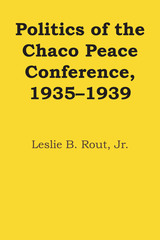 Politics of the Chaco Peace Conference, 1935–1939
By Leslie B. Rout, Jr.
University of Texas Press, 1970 After three years of indecisive but bloody war, guns lay silent in the Chaco Boreal in June 1935. Fifty years of bickering between Bolivia, a landlocked country seeking a river exit to the sea, and Paraguay, a land-hungry country seeking territorial aggrandizement and supposed mineral wealth, had culminated in open warfare in June 1932. By 1935 the antagonists, near exhaustion, finally agreed to discuss their differences. Leslie B. Rout, Jr., examines three facets of the dispute and the inter-American peace conference that settled it. He analyzes the futile diplomatic efforts to prevent the outbreak of hostilities, discusses the diplomatic initiatives that culminated in the June cease-fire, and describes the frustrating but ultimately successful diplomatic struggle that produced a definitive settlement. By enumerating the problems and progress of the peace conference, Rout demonstrates that, despite occasions of open diplomacy, it was through secret negotiation that agreement was finally attained. He concludes that, although the negotiators betrayed unabashed cynicism, violated stated Pan-American ideals, and disregarded the "troublesome" terms of the June 1935 cease-fire, they deserve praise. Had the mediators failed to produce a viable solution in July 1938, the peace conference would have collapsed, renewed warfare would have resulted—and the neighboring powers inevitably would have become involved. Given this potential catastrophe, the mediators had to solve the diplomatic problems by the means available.
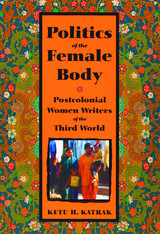 The Politics of the Female Body: Postcolonial Women Writers
Ketu H. Katrak
Rutgers University Press, 2006 Is it possible to simultaneously belong to and be exiled from a community? In Politics of the Female Body, Ketu H. Katrak argues that it is not only possible, but common, especially for women who have been subjects of colonial empires.
Through her careful analysis of postcolonial literary texts, Katrak uncovers the ways that the female body becomes a site of both oppression and resistance. She examines writers working in the English language, including Anita Desai from India, Ama Ata Aidoo from Ghana, and Merle Hodge from Trinidad, among others. The writers share colonial histories, a sense of solidarity, and resistance strategies in the on-going struggles of decolonization that center on the body. Bringing together a rich selection of primary texts, Katrak examines published novels, poems, stories, and essays, as well as activist materials, oral histories, and pamphlets—forms that push against the boundaries of what is considered strictly literary. In these varied materials, she reveals common political and feminist alliances across geographic boundaries. A unique comparative look at women’s literary work and its relationship to the body in third world societies, this text will be of interest to literary scholars and to those working in the fields of postcolonial studies and women’s studies.
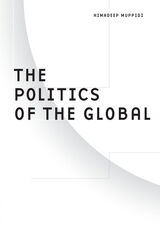 Politics Of The Global
Himadeep Muppidi
University of Minnesota Press, 2004 Examines globalism as a social production, opening up new paths of resistance Though presented often as an objective process, globalization is frequently analyzed from subjective perspectives that are closed to their own historical and geographical specificity. Refusing the false choice between objectivity and subjectivity, Himadeep Muppidi considers the production of the global as an intersubjective process involving the interplay of meanings, identities, and practices from historically different locations. Muppidi illustrates how the politics of globalization are played out in two multicultural democracies, India and the United States—particularly rich examples given the increasing interactions between them in the areas of global economy and security. Software experts and skilled professionals flow from India to the United States; the United States outsources service sector jobs to India. Although they differ in their approaches to worldwide regulation of weapons of mass destruction, India and the United States cooperate in opposing terrorism. Treating globalization as an intersubjective process reveals the different political possibilities (e.g., colonial coercion, postcolonial ambivalence, and postcolonial co-option) that are opened by global relays of meanings, identities, and power. Muppidi concludes by exploring a variety of spaces and strategies for resisting the colonization of the global.
 The Politics of the Malayan Communist Party from 1930 to 1948
David Lockwood
National University of Singapore Press, 2024 A new evaluation of the history of the Malayan Communist Party.
By 1946, the Malayan Communist Party (MCP) had become one of the most successful communist parties in Asia. From its foundation in 1930, it had built up a membership in the thousands, mainly among Chinese and Indian workers in Malaya. When the Japanese arrived, the MCP organized the Malayan People’s Anti-Japanese Army (MPAJA), the only effective resistance force. After the War, when the British returned, the Party launched a legal campaign for independence, but by 1948, the MCP had surrendered its achievements and taken many members underground to launch a disastrous, failed insurrection against the British.
To understand these momentous turns of history, a fresh view is required of the Malayan Communist Party as a political actor. The Politics of the Malayan Communist Party from 1930 to 1948 gives a political history of the Party and explains why the MCP self-destructed in 1948. In particular, David Lockwood questions assumptions that post-war politics led inevitably to armed struggle and questions the accepted narrative of Party Chairman Lai Tek's treachery. This is a revisionist history of a period, and political force, that has left a lasting mark on the politics of Malaya and Singapore.
 The Politics of the Minimum Wage
Jerold Waltman
University of Illinois Press, 2000 The minimum wage as a value of civic republicanism The minimum wage appears to be a standard economic regulatory measure, yet a politics of symbolism more than anything else defines the political contests that periodically erupt over it. Detractors abhor its corruption of market principles, while supporters see it as a measure of society's symbolic commitment to the poor. Tracing the history of the minimum wage and exposing its inherent contradictions as a political issue, Jerold Waltman proposes an alternative to the economic arguments that now dominate debates over it. Citing overwhelming public support for the minimum wage as evidence of an enduring civic consciousness and humanitarianism, Waltman advocates recasting the discussion in terms of a political economy of citizenship. Such a perspective would focus on the communal value of work, the need for citizens to have a stake in the community, and the effects of economic inequality on the bonds of common citizenship. Positioning the minimum wage as a fulcrum for the most basic conflict underlying America's unique combination of democracy and a market economy, The Politics of the Minimum Wage shows how a defense of the minimum wage built on a communal sense of responsibility rests on a strong tradition of civic republicanism and strengthens the hope for a truly democratic society.
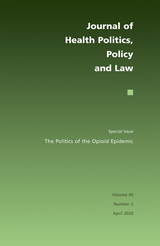 The Politics of the Opioid Epidemic
Susan L. Moffitt and Eric M. Patashnik, special issue editors
Duke University Press In “The Politics of the Opioid Epidemic,” leading political scientists from diverse theoretical traditions provide new insights into the enduring features of American policy and practice that have influenced state-level and national responses to the ongoing opioid crisis. Key among these features is the persistent power of race in shaping public opinion of the opioid crisis, influencing the development of punitive and treatment-oriented legislation, and impacting media portrayal of opioids and the communities they affect. Other factors include the development of the conservative welfare state and the challenges of delivering information and services to affected communities through existing, dysfunctional systems. Analyzing the manifold politics that have contributed to the current situation, contributors explain the depth of the current opioid epidemic and highlight the need for structural change to produce durable, effective policies.
Contributors. Amanda Abraham, Christina M. Andrews, Clifford S. Bersamira, Andrea Louise Campbell, Sarah E. Gollust, Colleen M. Grogan, Gali Katznelson, Jin Woo Kim, Miriam Laugesen, Joanne M. Miller, Susan L. Moffitt, Evan Morgan, Brendan Nyhan, Eric M. Patashnik, Elizabeth Peréz-Chiqués, Harold A. Pollack, Marie Schenk, Carmel Shachar, Phillip M. Singer, Bikki Tran Smith, Patricia Strach, Paul Testa, Tess Wise, Katie Zuber
The Politics of the Peace Corps and VISTA
T. Zane Reeves
University of Alabama Press, 1988 The author has taken the concept of organizational culture from corporate literature and applied it to two unique government programs the Peace Corps and VISTA. The book traces the ongoing conflict between partisan ideology and the organizational culture formulated during the Kennedy and Johnson years. It follows an often intense struggle between political appointees on one side and career employees, volunteers, and returned volunteers on the other. Political ideologies may vary depending upon which political party controls the presidency, but the contest for control of the agencies continues.
 Politics of the Person as the Politics of Being
David Walsh
University of Notre Dame Press, 2015 Readers expecting a traditional philosophical work will be surprised and delighted by David Walsh’s Politics of the Person as the Politics of Being, his highly original reflection on the transcendental nature of the person. A specialist in political theory, Walsh breaks new ground in this volume, arguing, as he says in the introduction, “that the person is transcendence, not only as an aspiration, but as his or her very reality. Nothing is higher. That is what Politics of the Person as the Politics of Being strives to acknowledge.” The analysis of the person is the foundation for thinking about political community and human dignity and rights.
Walsh establishes his notion of the person in the first four chapters. He begins with the question as to whether science can in any sense talk about persons. He then examines the person’s core activities, free choice and knowledge, and reassesses the claims of the natural sciences. He considers the ground of the person and of interpersonal relationships, including our relationship with God. The final three chapters explore the unfolding of the person, imaginatively in art, in the personal “time” of history, and in the “space” of politics.
Politics of the Person as the Politics of Being is a new way of philosophizing that is neither subjective nor objective but derived from the persons who can consider such perspectives. The book will interest students and scholars in contemporary political philosophy, philosophy of religion, and any groups interested in the person, personalism, and metaphysics.
"Politics of the Person as the Politics of Being is a brilliant, eloquent, and luminous meditative study, filled necessarily with paradox, owing to the limitations of analysis and of language, of which Walsh is fully cognizant, on the meaning of the person. This is an outstanding piece of work by one of the foremost scholars of his generation." —Barry Cooper, University of Calgary
"Politics of the Person as the Politics of Being is a magisterial book in the line of Gilson’s Unity of Philosophical Experience, that is, it is a book that sees where ideas go in the light of the being in which all things are grounded. Walsh brings his previous searching reflections on the direction and content of philosophy to a brilliant conclusion in these memorable pages. This is a work of original intellect that serves to illuminate what a person is, how it is grounded in reality, how it relates to both God and to the political order." —James V. Schall, S.J., emeritus, Georgetown University
"Rare, indeed, is the book that discusses the human soul in all its amplitude with grace, discernment, and penetration. David Walsh’s new book allows us to see that the relational human person is the alpha and omega of all philosophical and political reflection. David Walsh’s post-metaphysical reflection, a luminous exercise in philosophical Christianity, has nothing to do with fashionable academic nihilism. And his treatments of art and 'God as the seal of the personal' are alone worth the price of admission." —Daniel J. Mahoney, Augustine Chair in Distinguished Scholarship, Assumption College
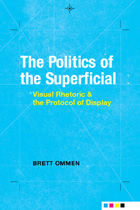 The Politics of the Superficial: Visual Rhetoric and the Protocol of Display
Brett Ommen
University of Alabama Press, 2016 In The Politics of the Superficial: Visual Rhetoric and the Protocol of Display, Brett Ommen explores the increasing reliance on images as a mode of communication in contemporary life. He shows that graphic design is a layered experience of images and space. Before images, viewers engage in the personal experience of aesthetics and individual identity. In space, viewers engage in the negotiation of meaning and collective belonging. Graphic design, then, fits the consumerist present precisely because it prompts viewers to differentiate between our collective commitments and individual sense of self.
Ommen argues, for example, that on viewing a billboard, a driver isn’t merely being exposed to a set of commercial messages or exhortations, but rather responding in a self-aware way that differentiates her from her collective associations like Democrat, Republican, rich, poor, Catholic, or Jewish.
By examining graphic design—as a profession, practice, and academic field—as the nexus for understanding visual display in public culture, The Politics of the Superficial develops two arguments about contemporary visual communication practices: first, that the study of visual communication privileges visual content at the expense of other dynamics, such as context; and second, that interpretations focusing on content conceal the most persuasive and subversive dimensions of the visual.
Wide-ranging and stimulating, The Politics of the Superficial ultimately posits that, far from serving as a communal oasis for public imagination, contemporary visual culture offers the possibility for politically engaged communication and persuasion while simultaneously threatening the health of public discourse by atomizing its constituent parts. It will serve as a vital contribution to the field of visual rhetoric.
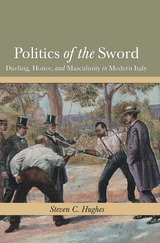 Politics of the Sword: Dueling, Honor, and Masculinity in Modern Italy
Steven C. Hughes
Ohio State University Press, 2007 Following its creation as a country in 1861, Italy experienced a wave of dueling that led commentators to bemoan a national “duellomania” evidenced by the sad spectacle of a duel a day. Pamphlets with titles like “Down with the Duel” and “The Shame of the Duel” all communicated the passion of those who could not believe that a people supposedly just returned to the path of progress and civilization had wholeheartedly embraced such a “barbaric” custom. Yet these critics were consistently countered by sober-minded men of rank and influence who felt that the duel was necessary for the very health of the new nation. Steven C. Hughes argues that this extraordinary increase in chivalric combat occurred because the duel played an important role in the formation, consolidation, and functioning of united Italy. The code of honor that lay at the heart of the dueling ethic offered a common model and bond of masculine identity for those patriotic elites who, having created a country of great variety and contrast for often contradictory motives, had to then deal with the consequences. Thus dueling became an iconic weapon of struggle during the Risorgimento, and, as Italy performed poorly on the stage of great power politics, it continued to offer images of martial valor and manly discipline. It also enhanced the social and political power of the new national elites, whose monopoly over chivalric honor helped reinforce the disenfranchisement of the masses. Eventually, the duel fed into the hypermasculinity and cult of violence that marked the early fascist movement, but in the end it would prove too individualistic in its definition of honor to stand up to the emerging totalitarian state. Although Mussolini would himself fight five duels at the start of his career, the duel would disappear along with the liberal regime that had embraced it.
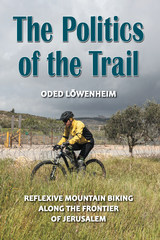 The Politics of the Trail: Reflexive Mountain Biking along the Frontier of Jerusalem
Oded Löwenheim
University of Michigan Press, 2014 Each day, as Oded Löwenheim commutes by mountain bike along dirt trails and wadis in the hills of Jerusalem to Hebrew University, he feels a strong emotional connection to his surroundings. But for him this connection also generates, paradoxically, feelings and emotions of confusion and estrangement. In The Politics of the Trail, Löwenheim confronts this tension by focusing on his encounters with three places along the trail: the separation fence between Israel and the Palestinians; the ruins of the Palestinian village Qalunya, demolished in 1948; and the trail connecting the largest 9/11 memorial site outside of the U.S. with a top-secret nuclear-proof bunker for the Israeli cabinet. He shares the stories of the people he meets along the way and considers how his own subjectivity is shaped by the landscape and culture of conflict. Moreover, he deconstructs, challenges, and resists the concepts and institutions that constitute such a culture and invites conversation about the idea of conflict as a culture.
The Politics of the U.S. Cabinet: Representation in the Executive Branch, 1789-1984
Jeffrey E. Cohen
University of Pittsburgh Press, 1988
Jeffrey E. Cohen presents a detailed, quantitative study of the characteristics of presidential cabinets from the days of George Washington through the first Reagan administration. Dividing U.S. history into five party eras, he examines cabinet members' age, education, region, occupation, recruitment patterns, party affiliations, and relations with other branches and institutions of government. This study also addresses major theoretical issues: the Constitution never provided for a cabinet, although George Washington established it. Questions soon arose as to its functions, relation to Congress, and the rules and precedents guiding its activities. Cohen examines how the cabinet balanced representation and capability, and how, despite a lack of institutional authority, it has managed to survive through every administration.
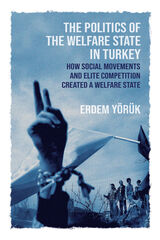 The Politics of the Welfare State in Turkey: How Social Movements and Elite Competition Created a Welfare State
Erdem Yörük
University of Michigan Press, 2022 In The Politics of the Welfare State in Turkey, author Erdem Yörük provides a politics-based explanation for the post-1980 transformation of the Turkish welfare system, in which poor relief policies have replaced employment-based social security. This book is one of the results of Yörük’s European Research Council-funded project, which compares the political dynamics in several emerging markets in order to develop a new political theory of welfare in the global south. As such, this book is an ambitious analytical and empirical contribution to understanding the causes of a sweeping shift in the nature of state welfare provision in Turkey during the recent decades—part of a global trend that extends far beyond Turkey. Most scholarship about Turkey and similar countries has explained this shift toward poor relief as a response to demographic and structural changes including aging populations, the decline in the economic weight of industry, and the informalization of labor, while ignoring the effect of grassroots politics. In order to overcome these theoretical shortages in the literature, the book revisits concepts of political containment and political mobilization from the earlier literature on the mid-twentieth-century welfare state development and incorporates the effects of grassroots politics in order to understand the recent welfare system shift as it materialized in Turkey, where a new matrix of political dynamics has produced new large-scale social assistance programs.
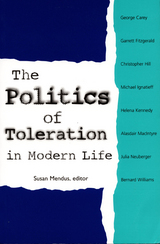 The Politics of Toleration in Modern Life
Susan Mendus, ed.
Duke University Press, 1999 In The Politics of Toleration in Modern Life Susan Mendus gathers a group of distinguished public figures—philosophers, historians, lawyers, and religious leaders—to reflect on a core issue within contemporary political debate. At the close of a century that will be remembered for its two world wars and its eruptions of genocide, the contributors examine the importance of an insistence on tolerance and the dangers of its lack, both historically and in the present day. How can toleration be fostered in a contentious and tightly populated world? What situations and fears have historically fed attitudes of intolerance? When and how should states intervene? The authors of these essays seek answers to such questions and examine topics such as why certain national groups are especially vulnerable to intolerance and narcissistic fantasies and how the colonial view of intolerant exploitation as an acceptable norm of behavior has been replaced by a drive toward international solidarity. The essays address religious tolerance, the role of toleration in legal contexts, the philosophical justification of tolerance, and the concept of solidarity. Ethnic identity, nationalism, the “goods of conflict,” and the treatment of refugees seeking asylum are discussed as well. While one contributor argues that a moment of genuine tolerance is achieved only when there is a cost involved in the act of tolerating another person’s way of living, another stresses that rational, communal dialogue can only take place if the state is excluded from the discussion, if conflict is recognized as valuable, and if local communities come to consensus about what behavior and discourse is intolerable. Offering an accessible and engaging commentary on the concept of tolerance, The Politics of Toleration in Modern Life will interest a wide range of readers of philosophy, political science, religion, sociology, and history.
Contributors. George Carey, Christopher Hill, Michael Ignatieff, Helena Kennedy, Alasdair MacIntyre, Susan Mendus, Julia Neuberger, Bernard Williams
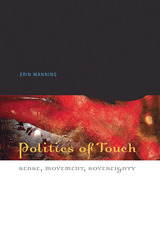 Politics of Touch: Sense, Movement, Sovereignty
Erin Manning
University of Minnesota Press, 2006 Political philosophy has long been bound by traditional thinking about the body and the senses. Through an engagement with the state-centered vocabulary of this discipline, Politics of Touch explores the ways in which sensing bodies continually run up against existing political structures. In this groundbreaking work, Erin Manning reconsiders how new politics can arise that challenge the national body politic.
In Politics of Touch, Manning develops a new way to conceive the role of the senses, and of touch in particular. Exploring concepts of violence, gender, sexuality, security, democracy, and identity, she traces the ways in which touch informs and reforms the body. Specifically considering tango-a tactile, rhythmic, and improvisational dance- she foregrounds movement as the sensing body's intervention into the political. With a fresh vision and an original theoretical basis, Manning shows the ontogenetic potential of the body, and in doing so, redefines our understanding of the sense of touch in philosophical and political terms.
Erin Manning is assistant professor of fine arts at Concordia University and the author of Ephemeral Territories (Minnesota, 2003).
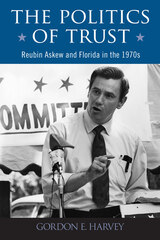 The Politics of Trust: Reubin Askew and Florida in the 1970s
Gordon E. Harvey
University of Alabama Press, 2015 Florida governor Reubin Askew memorably characterized a leader as “someone who cares enough to tell the people not merely what they want to hear, but what they need to know.” It was a surprising statement for a contemporary politician to make, and, more surprising still, it worked. In The Politics of Trust: Reubin Askew and Florida in the 1970s, Gordon E. Harvey traces the life and career of the man whose public service many still recall as “the Golden Age” of Florida politics.
Askew rose to power on a wave of “New South” leadership that hoped to advance the Democratic Party beyond the intransigent torpor of southern politics since the Civil War. He hoped to replace appeals to white supremacy with a vision of a more diverse and inclusive party. Following his election in Florida, other New South leaders such as Georgia’s Jimmy Carter, Arkansas’s Dale Bumpers, and South Carolina’s John C. West all came to power.
Audacious and gifted, Askew was one of six children raised by a single mother in Pensacola. As he worked his way up through the ranks of the state legislature, few in Florida except his constituents knew his name when he challenged Republic incumbent Claude R. Kirk Jr. on a populist platform promising higher corporate taxes. When he won, he inaugurated a series of reforms, including a new 5 percent corporate income tax; lower consumer, property, and school taxes; a review of penal statutes; environmental protections; higher welfare benefits; and workers’ compensation to previously uncovered migrant laborers.
Touting honesty, candor, and transparency, Askew dubbed his administration “government in the sunshine.” Harvey demonstrates that Askew’s success was not in spite of his penchant for bold, sometimes unpopular stances, but rather because his mix of unvarnished candor, sober ethics, and religious faith won the trust of the diverse peoples of his state.
 The Politics of Truth and Other Untimely Essays: The Crisis of Civic Consciousness
Ellis Sandoz
University of Missouri Press, 1999
A fascinating collection of studies, The Politics of Truth and Other Untimely Essays explores the historical and theoretical underpinnings of personal liberty and free government and provides a trenchant analysis of the crisis of civic consciousness endangering both of them today. The book addresses a range of issues in contemporary political philosophy and constitutional theory. These are seen to be all the more urgent in importance because of the surging aspirations for liberty in the wake of the collapse of the Soviet empire and the post-Cold War anomaly of crisis, malaise, and disarray in free government itself in America and in other bastions of modern democracy.
While each essay can stand alone, there is an underlying thematic unity to the collection. The fundamental problem considered throughout is whether and to what extent the fall of communism may mark an epoch in world history. These questions are applied to the East Central European nations struggling to achieve free government and personal liberty. The elements required to identify the preconditions of liberty are addressed and specific attention is given to the terms of institutionalization in the American founding.
Several essays focus on American political thought, with emphasis on the Declaration of Independence and the Constitution. Two elements, in particular, are treated: the jurisprudential and common law background to the American political tradition and the centrality of religion within the unfolding of the American political experiment. Sandoz explores the uncommon alliance of philosophers, statesmen, and evangelists during the nation's founding. This alliance, nurturing communities of persons bound together by their faith and a mutual regard for one another, played a vital role in the establishment of the system of freedom under law.
Sandoz sees the tension between religion and natural law as a constant in the human struggle for freedom. That the preservation of liberty under law is no easy task is acknowledged and addressed as it can be seen in the American founding, in the post-communist struggle of East Central Europe, and in the deepening contemporary crisis of American society. Anyone interested in the "politics" of "truth" will appreciate this volume.
The Politics of Unfunded Mandates: Whither Federalism?
Paul L. Posner
Georgetown University Press, 1998 This book is the first comprehensive analysis of the politics behind the use of mandates requiring state and local governments to implement federal policy. Over the last twenty-five years, during both liberal and conservative eras, federal mandates have emerged as a resilient tool for advancing the interests of both political parties. Revealing the politics that led to the policies, Paul L. Posner explores the origins of these congressional mandates, what interests and needs they satisfy, whether mandate reform initiatives can be expected to alter their use, and their implications for federalism. This book reveals how mandates have changed the way policy is formed in the United States and the fundamental relationship between the federal government and the state and local governments.
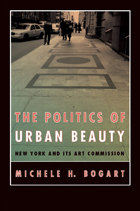 The Politics of Urban Beauty: New York and Its Art Commission
Michele H. Bogart
University of Chicago Press, 2006 Since its founding in 1898, the Art Commission of the City of New York (ACNY) has served as the city’s aesthetic gatekeeper, evaluating all works of art intended for display on city property. And over the years, the commission’s domain has expanded dramatically to include everything from parks and courthouses to trash cans and sidewalks. In ThePolitics of Urban Beauty, Michele H. Bogart argues that this unprecedented authority has made the commission host to some complex negotiations—involving artists, architects, business leaders, activists, and politicians—about not only the role of art in urban design, but also the shape and meaning of the city and its public spaces.
A former vice president of the ACNY, Bogart tells its story here from an insider’s perspective, tracing the commission’s history from its origins as an outgrowth of progressive reform to its role in New York’s reconstruction after 9/11. Drawing on archival correspondence, drawings, and photographs from commission collections, Bogart presents bracing examples of works—ranging from New Deal murals to Louis Kahn’s unbuilt Memorial to Six Million Jewish Martyrs—that illuminate the ACNY’s subtle yet powerful role in shaping New York’s identity.
The Politics of Urban Beauty is thus a fascinating history of a New York art world that paralleled—and sometimes unpredictably intersected with—the more familiar realm of prominent architects, painters, galleries, and museums. Bogart’s fresh view adds a critical dimension to our understanding of “the city beautiful” and makes an important and lively contribution to the study of art history, urban design, and New York City itself.
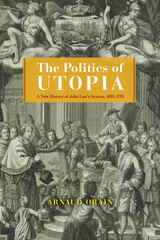 The Politics of Utopia: A New History of John Law's System, 1695–1795
Arnaud Orain
University of Chicago Press, 2024 A fascinating retelling of the first banking and financial collapse in eighteenth-century France.
The Scottish economist John Law has been described as the architect of modern central banking. His “System,” established in Regency France between 1716 and 1720, saw the founding of a bank issuing paper money and the establishment of state commercial and colonial enterprises aimed at consolidating public debt. What at first seemed like financial wizardry, however, resulted in rampant speculation and, ultimately, economic collapse. In The Politics of Utopia, historian Arnaud Orain offers a provocative rereading of this well-known episode.
Starting his story in the seventeenth century, Orain reconstructs the figures and ideas, long predating Law, that anticipated and laid the groundwork for the System, which, he argues, is best understood as a failed social utopia aimed at the total transformation of society. Overturning familiar narratives of this seismic event, this book rewrites a stunning chapter in economic history by dealing with the cultural, colonial, religious, and political dimensions of the (in)famous System up to the French Revolution, revealing new lessons for today’s fraught financial landscape.
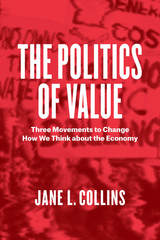 The Politics of Value: Three Movements to Change How We Think about the Economy
Jane L. Collins
University of Chicago Press, 2017 The Great Recession not only shook Americans’ economic faith but also prompted powerful critiques of economic institutions. This timely book explores three movements that gathered force after 2008: the rise of the benefit corporation, which requires social responsibility and eschews share price as the best metric for success; the emergence of a new group, Slow Money, that fosters peer-to-peer investing; and the 2011 Wisconsin protests against a bill restricting the union rights of state workers.
Each case shows how the concrete actions of a group of citizens can prompt us to reflect on what is needed for a just and sustainable economic system. In one case, activists raised questions about the responsibilities of business, in the second about the significance of local economies, and in the third about the contributions of the public sector. Through these movements, Jane L. Collins maps a set of cultural conversations about the types of investments and activities that contribute to the health of the economy. Compelling and persuasive, The Politics of Value offers a new framework for viewing economic value, one grounded in thoughtful assessment of the social division of labor and the relationship of the state and the market to civil society.
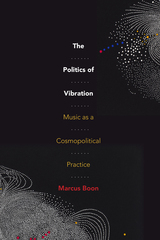 The Politics of Vibration: Music as a Cosmopolitical Practice
Marcus Boon
Duke University Press, 2022 In The Politics of Vibration Marcus Boon explores music as a material practice of vibration. Focusing on the work of three contemporary musicians—Hindustani classical vocalist Pandit Pran Nath, Swedish drone composer and philosopher Catherine Christer Hennix, and Houston-based hip-hop musician DJ Screw—Boon outlines how music constructs a vibrational space of individual and collective transformation. Contributing to a new interdisciplinary field of vibration studies, he understands vibration as a mathematical and a physical concept, as a religious or ontological force, and as a psychological determinant of subjectivity. Boon contends that music, as a shaping of vibration, needs to be recognized as a cosmopolitical practice—in the sense introduced by Isabelle Stengers—in which what music is within a society depends on what kinds of access to vibration are permitted, and to whom. This politics of vibration constitutes the hidden ontology of contemporary music because the organization of vibration shapes individual music scenes as well as the ethical choices that participants in these scenes make about how they want to live in the world.
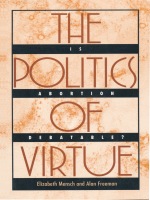 The Politics of Virtue: Is Abortion Debatable?
Elizabeth Mensch and Alan Freeman
Duke University Press, 1993 Fiercely committed to the separation of church and state, thoroughly pluralistic, largely secular: Where does a society like ours find common terms for conducting a moral debate? In view of the crises surrounding the issue of abortion, it is tempting to answer: nowhere. In this timely and provocative book, Elizabeth Mensch and Alan Freeman urge that we challenge the extremes of both the "pro-life" and "pro-choice" views of the abortion issue and affirm the moral integrity of compromise. Attempting to restore a level of complexity to the discussion and to enrich public debate so that we may move beyond our current impasse, the authors argue that it is essential to understand how issues of legal "rights" and theological concerns interact in American public debate.
Returning to the years leading up to Roe v. Wade, Mensch and Freeman detail the role of religion and its relationship to the emerging politics of abortion. Discussing primarily the natural law tradition associated with Catholicism and the Protestant ethical tradition, the authors focus most sharply on the 1960s in which the present terms of the abortion debate were set. In a skillful analysis, they identify a variety of factors that directed and shaped the debate--including, among others, the haunting legacy of Nazism, the moral challenge of the civil rights movement, the "God is dead" discourse, school prayer and Bible reading, Harvey Cox's The Secular City, the Berrigans and Vietnam, the animal rights movement, and the movement of the church-going population away from mainstream Protestant tradition toward evangelical fundamentalism. By criticizing the rhetoric employed by both the "pro-choice" and "pro-life" camps, Mensch and Freeman reveal the extent to which forces on either side of the issue have failed to respond to relevant concerns. Since Roe v. Wade, the authors charge, public debate has seemed to concede the moral high ground to the "pro-life" position, while the "pro-choice" rhetoric has appeared to defend an individual's legal right to do moral wrong. Originally published as a special issue of The Georgia Law Review (Spring 1991), this revised and expanded edition will be welcomed by all those frustrated by the impasse of debates so central to our nation's moral life.
The Politics of Water in Arizona
Dean E. Mann
University of Arizona Press, 1963 “Mann’s book is timely, and its central theme, the role of legal, political, and scientific institutions in the utilization of water in Arizona, is appropriate. It is appropriate, moreover, for the greater region of California and the Southwest, where exist similar problems. . . . The Politics of Water in Arizona ranks along with Richard Cooley’s prize winning Politics and Conservation: The Decline of the Alaska Salmon as an outstanding contribution of a political science to the field of conservation and resource utilization.”—California Historical Society Quarterly
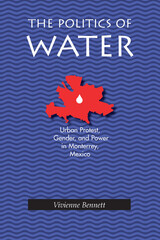 The Politics of Water: Urban Protest, Gender, and Power in Monterrey, Mexico
Vivienne Bennett
University of Pittsburgh Press, 1996
Monterrey is Mexico’s second most important industrial city, emerging in this era of free trade as a cornerstone of Mexico’s economic development. But development has been uneven and has taken a toll: As recently as the early 1980s, nearly a quarter of the city’s almost three million inhabitants did not have running water in their homes. At the same time, heavy industry - especially steel, iron, chemical, and paper works - were major users of water in their production processes.
Extensive industrialization coupled with a lack of infrastructure development astonishing in a major industrial city raises serious questions about the process of planning urban services in Mexico. Bennett uses the water crisis of the 1980s as a lens through which to reveal this planning process and the provision of public services in Monterrey. She finds three groups who were central to the evolution of the city’s water system: federal and state government leaders, the regional private sector elite (the Grupo Monterrey), and women living in the low-income neighborhoods of the city.
Bennett unravels the politics of water in Monterrey by following three threads of inquiry. First, she examines the water services themselves - what was built, when, why, and who paid for them. She then reveals the response of poor women to the water crisis, analyzing who participated in protests, the strategies they used, and how the government responded. And, finally, she considers the dynamics of planning water services for the private sector and the government in investment and management. In the end, Monterrey’s water services improved because power relations shifted and because poor women in Monterrey used protests to make national news out of the city’s water crisis.
The Politics of Water makes a significant contribution to the emerging scholarship on regional politics in Mexico and to a deeper understanding of the Monterrey region in particular. Until recently, most scholarly writing on Mexico spoke of the national political system as a monolithic whole. Scholars such as Vivienne Bennett are now recognizing the power of local citizens and the significant differences among regions when it comes to politics, policy making, and governmental investment decisions.
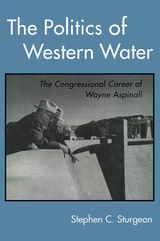 The Politics of Western Water: The Congressional Career of Wayne Aspinall
Stephen C. Sturgeon
University of Arizona Press, 2002 As the Democratic congressman from Colorado's Fourth District from 1949 to 1973, Wayne Aspinall was an advocate of natural resource development in general and reclamation projects in particular. A political loner, considered crusty and abrasive, he carved a national reputation by helping secure the passage of key water legislation—in the process clashing with colleagues and environmentalists alike. Fiercely protective of western Colorado's water supply, Aspinall sought to secure prosperity for his district by protecting its share of Colorado River water through federal reclamation projects, and he made this goal the centerpiece of his congressional career. He became chair of the House Interior Committee in 1959 and ruled it with an iron fist for more than a dozen years—a role that placed him in a key position to shape the nation's natural resource legislation at a time when the growing environmental movement was calling for a sharp change in policy. This full-length study of Aspinall's importance to reclamation in the West clarifies his role in influencing western water policy. By focusing on Aspinall's congressional career, Stephen Sturgeon provides a detailed account of the political machinations and personal foibles that shaped Aspinall's efforts to implement water reclamation legislation in support of Colorado's Western Slope, along the way shedding new light on familiar water controversies. Sturgeon meticulously traces the influences on Aspinall's thinking and the arc of his career, examining the congressman's involvement in the Colorado River Storage Project bill and his clash with conservationists over the proposed Echo Park Dam; recounting the fight over the Frying Pan-Arkansas Project and his decision to support diverting water out of his own district; and exploring the battles over the Central Arizona Project, in which Aspinall fought not only environmentalists but also other members of Congress. Finally he assesses the Aspinall legacy, including the still-disputed Animas-La Plata Project, and shows how his vision of progress shaped the history of western water development. The Politics of Western Water portrays Aspinall in human terms, not as a pork-barrel politician but as a representative who believed he was protecting his constituents' interests. It is an insightful account of the political, financial, and personal variables that affect the course by which water resource legislation is conceived, supported, and implemented—a book that is essential to understanding the history and future of water in the West.
The Politics of Wilderness Preservation
Craig W. Allin
University of Alaska Press, 2008 Craig Allin explores here the history of wilderness preservation politics in the United States. American pioneers originally viewed the wilderness as an enemy to destroy, Allin recounts, but with the rapid decline in natural resources in the nineteenth century, citizens realized their error and began to enact revolutionary environmental policies. Allin explores the far-reaching political and economic impact of these policies, as well as their status today and their uncertain future. With its timely, cutting-edge analysis, The Politics of Wilderness Protection is must-read for environmentalists and policymakers alike.
The Politics of Women's Biology
Hubbard, Ruth
Rutgers University Press, 1990 For a range of historical and contemporary issues in eugenics, human evolution, and procreative technology, Ruth Hubbard explains why scientific descriptions and choices should not generalize human, or female, attributes without acknowledging the realities of people's lives. Sophisticated in its analysis, yet not at all technical in its exposition, this book will find a wide readership among feminists, the general public, and the scientific community.
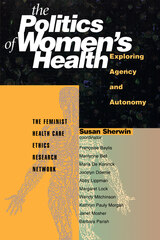 Politics Of Women's Health
Susan Sherwin
Temple University Press, 1998 For four years this interdisciplinary group of scholars and practitioners, including physicians, lawyers, philosophers, and social scientists, collaborated closely on te development of these essays. The result is an examination of both the real world of women's health status and health care delivery in different countries, and the assumptions behind the dominant medical model of solving problems without regard to social conditions. The writing is also informed by some of the authors' own experiences with women's health issues: birth, menopause, major surgery, and providing care for mothers and grandmothers.
Rather than focusing on types of medical interventions, The Politics of Women's Health asks what feminist health care ethics looks like if we start with women's experiences and concerns. It begins to unravel two key concepts of women's empowerment -- agency and autonomy -- that apply to all areas of concern to women.
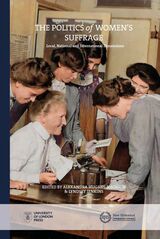 The Politics of Women's Suffrage: Local, National and International Dimensions
Edited by Alexandra Hughes-Johnson and Lyndsey Jenkins
University of London Press, 2021 A history of the early twentieth-century movement for women’s suffrage in the United Kingdom and the Commonwealth.
In the United Kingdom, the question of women’s suffrage represented the most substantial challenge to the constitution since 1832, seeking not only to expand but to redefine definitions of citizenship and power. At the same time, it was inseparable from other urgent contemporary political debates—the Irish question, the decline of the British Empire, the Great War, and the increasing demand for workers’ rights.
This collection positions women’s suffrage as central to, rather than separate from, these broader political discussions, demonstrating how they intersected and were mutually constitutive. In particular, this collection pays close attention to the issues of class and Empire which shaped this era. It demonstrates how campaigns for women’s rights were consciously and unconsciously played out, impacting attitudes to motherhood, spurring the radical “birth-strike” movement, and burgeoning communist sympathies in working-class communities around Britain and beyond.
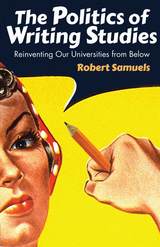 The Politics of Writing Studies: Reinventing Our Universities from Below
Robert Samuels
Utah State University Press, 2017 A friendly critique of the field, The Politics of Writing Studies examines a set of recent pivotal texts in composition to show how writing scholarship, in an effort to improve disciplinary prestige and garner institutional resources, inadvertently reproduces structures of inequality within American higher education. Not only does this enable the exploitation of contingent faculty, but it also puts writing studies—a field that inherently challenges many institutional hierarchies—in a debased institutional position and at odds with itself. Instead of aligning with the dominant paradigm of research universities, where research is privileged over teaching, theory over practice, the sciences over the humanities, and graduate education over undergraduate, writing studies should conceive itself in terms more often associated with labor. By identifying more profoundly as workers, as a collective in solidarity with contingent faculty, writing professionals can achieve solutions to the material problems that the field, in its best moments, wants to address. Ultimately, the change compositionists want to see in the university will not come from high theory or the social science research agenda; it must come from below. Offering new insight into a complex issue, The Politics of Writing Studies will be of great interest to writing studies professionals, university administrators, and anyone interested in the political economy of education and the reform of institutions of higher education in America.
 Politics on the Endless Frontier: Postwar Research Policy in the United States
Daniel Lee Kleinman
Duke University Press, 1995 Toward what end does the U.S. government support science and technology? How do the legacies and institutions of the past constrain current efforts to restructure federal research policy? Not since the end of World War II have these questions been so pressing, as scientists and policymakers debate anew the desirability and purpose of a federal agenda for funding research. Probing the values that have become embodied in the postwar federal research establishment, Politics on the Endless Frontier clarifies the terms of these debates and reveals what is at stake in attempts to reorganize that establishment.
Although it ended up as only one among a host of federal research policymaking agencies, the National Science Foundation was originally conceived as central to the federal research policymaking system. Kleinman’s historical examination of the National Science Foundation exposes the sociological and political workings of the system, particularly the way in which a small group of elite scientists shaped the policymaking process and defined the foundation’s structure and future. Beginning with Vannevar Bush’s 1945 manifesto The Endless Frontier, Kleinman explores elite and populist visions for a postwar research policy agency and shows how the structure of the American state led to the establishment of a fragmented and uncoordinated system for federal research policymaking. His book concludes with an analysis of recent efforts to reorient research policy and to remake federal policymaking institutions in light of the current "crisis" of economic competitiveness.
A particularly timely study, Politics on the Endless Frontier will be of interest to historians and sociologists of science and technology and to science policy analysts.
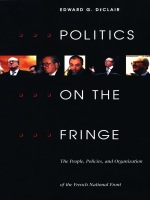 Politics on the Fringe: The People, Policies, and Organization of the French National Front
Edward G. DeClair
Duke University Press, 1999 Once a marginal political coalition, the French National Front has become the most high-profile far-right organization in Europe. In Politics on the Fringe Edward G. DeClair provides the first extensive analysis of the Front’s history, from its creation in 1972 and outcast status in the early 1980s to its achievement of broad-based support and show of political strength in the 1997 elections. Using rare, in-depth interviews with twenty-nine members of the Front elite, as well as public opinion survey data and electoral results, DeClair examines the internal structure of the Front, its political agenda, and its growing influence in France. DeClair shows how the party has dramatically expanded its traditionally narrow core constituency by capitalizing upon anxieties about national identity, immigration, European unification, and rising unemployment. In illustrating how the rhetoric surrounding such topics is key to the Front’s success, DeClair examines the Front’s legacy by detailing the links between the French far-right and similar movements in such countries as Germany, Belgium, Austria, Italy, and the United States. Finally, Politics on the Fringe offers not only a complete picture of the Front’s increasingly influential role in French partisan politics but also further insight into the resurgence of right-wing extremism throughout western societies in the late twentieth century. This volume will be of primary importance to political scientists and those engaged with European politics, culture, and history. It will also appeal to those concerned with right-wing populism and political movements.
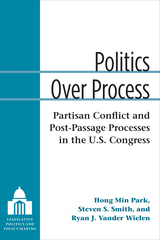 Politics Over Process: Partisan Conflict and Post-Passage Processes in the U.S. Congress
Hong Min Park, Steven S. Smith, and Ryan J. Vander Wielen
University of Michigan Press, 2018 Although the U.S. Constitution requires that the House of Representatives and the Senate pass legislation in identical form before it can be sent to the president for final approval, the process of resolving differences between the chambers has received surprisingly little scholarly attention. Hong Min Park, Steven S. Smith, and Ryan J. Vander Wielen document the dramatic changes in intercameral resolution that have occurred over recent decades, and examine the various considerations made by the chambers when determining the manner in which the House and Senate pursue conciliation. Politics Over Process demonstrates that partisan competition, increasing party polarization, and institutional reforms have encouraged the majority party to more creatively restructure post-passage processes, often avoiding the traditional standing committee and conference processes altogether.
Politics, Personality, and Social Science in the Twentieth Century: Essays in Honor of Harold D. Lasswell
Edited by Arnold A. Rogow
University of Chicago Press, 1969 Harold Lasswell is one of America's most distinguished political scientists, a man whose work has had enormous impact both in the United States and abroad upon not only his own field but also those of sociology, psychology and psychiatry, economics, law, anthropology, and communications.
This collection of essays is the first full-scale effort to deal with the voluminous writings of Lasswell and explore his at once charming and baffling personality which is perhaps inseparable from the inventiveness, unconventionality, and unusual scope of his work.
The authors of these essays, many of whom are former students or collaborators, view their subject from a variety of perspectives. What emerges is a full assessment of Lasswell's many-faceted contribution to the social scholarship of his time.
 Politics, Persuasion, and Educational Testing
Lorraine M. McDonnell
Harvard University Press, 2004 In a story of reform and backlash, Lorraine McDonnell reveals the power and the dangers of policies based on appeals to voters' values. Exploring the political struggles inspired by mass educational tests, she analyzes the design and implementation of statewide testing in California, Kentucky, and North Carolina in the 1990s.
Educational reformers and political elites sought to use test results to influence teachers, students, and the public by appealing to their values about what schools should teach and offering apparently objective evidence about whether the schools were succeeding. But mass testing mobilized parents who opposed and mistrusted the use of tests, and left educators trying to mediate between angry citizens and policies the educators may not have fully supported. In the end, some testing programs were significantly altered. Yet despite the risks inherent in relying on values to change what students are taught, these tests and the educational ideologies behind them have modified classroom practice.
McDonnell draws lessons from these stories for the federal No Child Left Behind act, with its sweeping directives for high-stakes testing. To read this book is to witness the unfolding drama of America's educational culture wars, and to see hope for their resolution.
 Politics, Philosophy, and Humor at the Byzantine Court: Eight Works by Theodore II Laskaris
Dimiter Angelov
Harvard University Press, 2025 The thirteenth-century emperor Theodore II Laskaris, ruler of the Empire of Nicaea, is among those versatile authors of the Byzantine era who produced numerous little-known gems of literature and thought. He composed the sole theoretical work on friendship surviving from Byzantium, wrote philosophy with verve and humor, and was perhaps the most passionate advocate of the idea of a communal Hellenic identity in the Middle Ages.
Politics, Philosophy, and Humor at the Byzantine Court represents the first translation into English of eight works by Laskaris. An introduction and annotations to the translations orient the reader and contextualize these fascinating pieces. The selections themselves include a satire of his tutor, his oration on friendship and politics, his oration on Hellenism, and philosophical works and musings such as a treatise filled with Socratic irony. They represent the most prominent strands of Laskaris’s thought and provide the reader with a well-rounded portrait of this remarkable author.
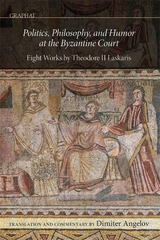 Politics, Philosophy, and Humor at the Byzantine Court: Eight Works by Theodore II Laskaris
Dimiter Angelov
Harvard University Press The thirteenth-century emperor Theodore II Laskaris, ruler of the Empire of Nicaea, is among those versatile authors of the Byzantine era who produced numerous little-known gems of literature and thought. He composed the sole theoretical work on friendship surviving from Byzantium, wrote philosophy with verve and humor, and was perhaps the most passionate advocate of the idea of a communal Hellenic identity in the Middle Ages.
Politics, Philosophy, and Humor at the Byzantine Court represents the first translation into English of eight works by Laskaris. An introduction and annotations to the translations orient the reader and contextualize these fascinating pieces. The selections themselves include a satire of his tutor, his oration on friendship and politics, his oration on Hellenism, and philosophical works and musings such as a treatise filled with Socratic irony. They represent the most prominent strands of Laskaris’s thought and provide the reader with a well-rounded portrait of this remarkable author.
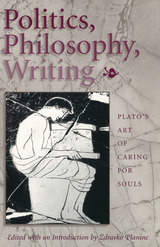 Politics, Philosophy, Writing: Plato's Art of Caring for Souls
Edited & Intro by Zdravko Planinc
University of Missouri Press, 2001
The leading scholars represented in Politics, Philosophy, Writing examine six key Platonic dialogues and the most important of the epistles, moving from Plato's most public or political writings to his most philosophical. The collection is intended to demonstrate the unity of Plato's concerns, the literary quality of his writing, and the integral relation of form and content in his work. Taken together, these essays show the consistency of Plato's understanding of the political art, the art of writing, and the philosophical life.
Studies emphasizing the unity of Plato's lifework have given way in recent scholarship to specialized and overspecialized examinations of individual dialogues. While each of the contributors to Politics, Philosophy, Writing studies one text, his or her work is oriented toward illuminating the whole of Plato's project. Each of the essays is an innovative contribution to scholarship on its topic; as a collection, they constitute a unique reading of Plato's political philosophy.
Plato scholars have generally divided themselves into two camps: those who concentrate on the analytic or logical aspects of the dialogues, and those who concentrate on the literary-critical features. In one camp are the philologists and classicists, and in the other, the writers of inventive interpretive commentaries. By avoiding distinctions between Plato the poet and Plato the philosopher, Politics, Philosophy, Writing allows a deeper exploration of the comprehensiveness of Plato's theoretical vision and illuminates the lasting challenge of his understanding of the human condition.
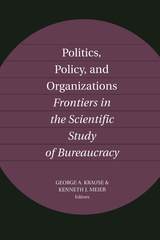 Politics, Policy, and Organizations: Frontiers in the Scientific Study of Bureaucracy
George A. Krause & Kenneth J. Meier, Editors
University of Michigan Press, 2003 The bureaucracy is the fourth branch of government, often receiving attention in times of emergency or when it is the object of criticism from the media or politicians. Less understood is how bureaucratic institutions function in a democracy, both from an organizational perspective and as institutional participants within the political arena. Drawing on rational choice approaches, computationally intensive data and modeling techniques, and systematic empirical inquiry, this original collection of essays highlights the important role bureaucracies play in shaping public policy-making. The editors of and contributors to this volume demonstrate not only the constraints political officials face in harnessing the bureaucracy but, more important, how bureaucracies function as organizational entities in diverse contexts.
George A. Krause is Associate Professor of Political Science, University of South Carolina.
Kenneth J. Meier is Charles Puryear Professor of Liberal Arts and Professor of Political Science, Texas A&M University.
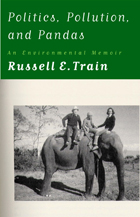 Politics, Pollution, and Pandas: An Environmental Memoir
Russell E. Train
Island Press, 2003 Russell E. Train, was chairman emeritus of the World Wildlife Fund, has led a remarkable life in conservation and environmental politics. Though many of his contributions have been unsung, Train was the catalyst for many of the nation's most important positive environmental policies that remain with us today. In the current political climate, where party divisions are so sharp and environmental concerns are so often shunted aside, Train's journey as a life-long Republican and an ardent conservationist is an inspiring story. Much of the important environmental policy Train helped to devise and implement occurred during two Republican administrations, those of Richard Nixon and Gerald Ford. Train served as undersecretary of Interior early in Nixon's administration before becoming chair of the president's Council on Environmental Quality (1970-1973). He then moved on to many accomplishments as head of the Environmental Protection Agency (EPA) from 1973 until 1978. At the end of the Ford administration, Train left government to become president of World Wildlife Fund (WWF) in the U.S. where he played a key role in developing that institution into the major conservation organization it is today. Politics, Pollution, and Pandas is a fascinating, behind-the-scenes account of the politics of the environment over much of the last half century, as told by one of its master architects.
The Politics Presidents Make: Leadership from John Adams to Bill Clinton, Revised Edition
Stephen Skowronek
Harvard University Press, 1997 Stephen Skowronek’s wholly innovative study demonstrates that presidents are persistent agents of change, continually disrupting and transforming the political landscape. In an afterword to this new edition, the author examines “third way” leadership as it has been practiced by Bill Clinton and others. These leaders are neither great repudiators nor orthodox innovators. They challenge received political categories, mix seemingly antithetical doctrines, and often take their opponents’ issues as their own.
The Politics Presidents Make: Leadership from John Adams to George Bush, First Edition
Stephen Skowronek
Harvard University Press THIS EDITION HAS BEEN REPLACED BY A NEWER EDITION.
Stephen Skowronek's wholly innovative study demonstrates that presidents are persistent agents of change, continually disrupting and transforming the political landscape. In an afterword to this new edition, the author examines "third way" leadership as it has been practiced by Bill Clinton and others. These leaders are neither great repudiators nor orthodox innovators. They challenge received political categories, mix seemingly antithetical doctrines, and often take their opponents' issues as their own. As the 1996 election confirmed, third way leadership has great electoral appeal. The question is whether Clinton in his second term will escape the convulsive end so often associated with the type.
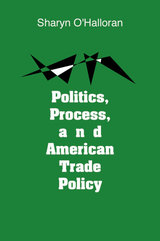 Politics, Process, and American Trade Policy
Sharyn O'Halloran
University of Michigan Press, 1994 Relying on the New Economics of Organizations (NEO), or New Institutionalism, Politics, Process, and American Trade Policy shows why conventional models do not adequately describe the formation of American trade policy. Rejecting both the pressure group model and the presidential-ascendancy model, this study's institution-based approach emphasizes the influence Congress has in setting trade policy, connecting theories of institutional design with the procedural details of regulating trade policy.To reach her conclusions, Sharyn O'Halloran uses time series data and econometric analysis to test a set of propositions concerning trade policy. She examines detailed case studies and provides a comprehensive history of the institutions that govern trade policy making. Unlike most scholars who see trade policy as disparate and ad hoc, O'Halloran is able to explain both early and contemporary American trade policy in a consistent and integrated fashion. She argues that a single set of procedures may lead to apparently different outcomes under differing initial conditions; therefore, the key is to identify the common logic, derived from constitutional imperatives, that underlies all policy outcomes.
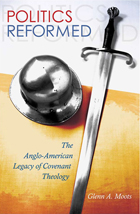 Politics Reformed: The Anglo-American Legacy of Covenant Theology
Glenn A. Moots
University of Missouri Press, 2022 Many studies have considered the Bible’s relationship to politics, but almost all have ignored the heart of its narrative and theology: the covenant. In this book, Glenn Moots explores the political meaning of covenants past and present by focusing on the theory and application of covenantal politics from the sixteenth through the eighteenth centuries. Moots demands that we revisit political theology because it served as the most important school of politics in early modern Europe and America. He describes the strengths of the covenant tradition while also presenting its limitations and dangers. Contemporary political scientists such as Eric Voegelin, Daniel Elazar, and David Novak are called on to provide insight into both the covenant’s history and its relevance today. Moots’s work chronicles and critiques the covenant tradition while warning against both political ideology and religious enthusiasm. It provides an inclusive and objective outline of covenantal politics by considering the variations of Reformed theology and their respective consequences for political practice. This includes a careful account of how covenant theology took root on the European continent in the sixteenth century and then inspired ecclesiastical and civil politics in England, Scotland, and America. Moots goes beyond the usual categories of Calvinism or Puritanism to consider the larger movement of which both were a part. By integrating philosophy, theology, and history, Moots also invites investigation of broader political traditions such as natural law and natural right. Politics Reformed demonstrates how the application of political theology over three centuries has important lessons for our own dilemmas about church and state. It makes a provocative contribution to understanding foundational questions in an era of rising fundamentalism and emboldened secularism, inspiring readers to rethink the importance of religion in political theory and practice, and the role of the covenant tradition in particular.
Politics, Religion, and Art: Hegelian Debates
Douglas Moggach
Northwestern University Press, 2011 The period from 1780 to 1850 witnessed an unprecedented explosion of philosophical creativity in the German territories. In the thinking of Kant, Schiller, Fichte, Hegel, and the Hegelian school, new theories of freedom and emancipation, new conceptions of culture, society, and politics, arose in rapid succession. The members of the Hegelian school, forming around Hegel in Berlin and most active in the 1830’s and 1840’s, are often depicted as mere epigones, whose writings are at best of historical interest. In Politics, Religion, and Art: Hegelian Debates, Douglas Moggach moves the discussion past the Cold War–era dogmas that viewed the Hegelians as proto-Marxists and establishes their importance as innovators in the fields of theology, aesthetics, and ethics and as creative contributors to foundational debates about modernity, state, and society.
 Politics, Science, and Dread Disease: A Short History of United States Medical Research Policy
Stephen P. Strickland
Harvard University Press, 1972 In 1927 the first bill to secure government support in the search for a cure for cancer was introduced to Congress. In 1971 Congress passed the Conquest of Cancer Act, which initiated a new and enlarged effort in the fight against cancer, including possible annual expenditures of up to one billion dollars. The forty-four years between these two dates have witnessed the evolution of medical research from a limited, private endeavor to a major national enterprise commanding substantial support from the federal government.
In this first historical analysis of national policy in biomedical research, Stephen Strickland examines the rise of the National Institutes for Health, tells of the recurrent struggle between elected public officials and science administrators over the pace and direction of cancer and heart disease research; analyzes the roles that key members of Congress have played in the development of medical research; and discusses the medical research lobby and its founder, Mrs. Albert D. Lasker. What emerges is a clear picture of how government officials actually formulate national policy, not only in medical research but in other areas as well.
 Politics, Self, and Society: A Theme and Variations
Heinz Eulau
Harvard University Press, 1986 How to deal with the relationship between the individual and society as it reveals itself through politics is the large theme of these erudite and stylish essays by a leading scholar whose lifelong concerns have included political behavior, decision-making by groups, and legislative deportment. Truly interdisciplinary in his approach, Heinz Eulau has drawn on all the social sciences in his thirty years of research into the political behavior of citizens in the mass and of legislative elites at the state and local levels of government.
Utilizing a variety of social and political theories—theories of reference group behavior, social role, organization, conflict, exchange functions and purposive action—he enriches the methodology of political science while tackling substantive issues such as social class behavior in elections, public policies in American cities, the structures of city councils, and the convergence of politics and the legal system. Eulau is ranked among the few scholars who have shaped the agenda of political science, and his latest work should also prove valuable for sociologists, social psychologists, and theorists of the social sciences.
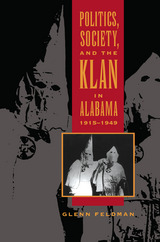 Politics, Society, and the Klan in Alabama, 1915-1949
Glenn Feldman
University of Alabama Press, 1999 This first book-length examination of the Klan in Alabama represents exhaustive research that challenges traditional interpretations. The Ku Klux Klan has wielded considerable power both as
a terrorist group and as a political force. Usually viewed as appearing
in distinct incarnations, the Klans of the 20th century are now shown by
Glenn Feldman to have a greater degree of continuity than has been previously
suspected. Victims of Klan terrorism continued to be aliens, foreigners,
or outsiders in Alabama: the freed slave during Reconstruction, the 1920s
Catholic or Jew, the 1930s labor organizer or Communist, and the returning
black veteran of World War II were all considered a threat to the dominant
white culture.
Feldman offers new insights into this "qualified continuity"
among Klans of different eras, showing that the group remained active during
the 1930s and 1940s when it was presumed dormant, with elements of the
"Reconstruction syndrome" carrying over to the smaller Klan of the civil
rights era.
In addition, Feldman takes a critical look at opposition to
Klan activities by southern elites. He particularly shows how opponents
during the Great Depression and war years saw the Klan as an impediment
to attracting outside capital and federal relief or as a magnet for federal
action that would jeopardize traditional forms of racial and social control.
Other critics voiced concerns about negative national publicity, and others
deplored the violence and terrorism.
This in-depth examination of the Klan
in a single state, which features rare photographs, provides a means of
understanding the order's development throughout the South. Feldman's book
represents definitive research into the history of the Klan and makes a
major contribution to our understanding of both that organization and the
history of Alabama.
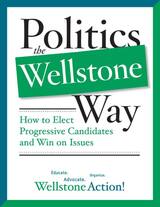 Politics the Wellstone Way: How to Elect Progressive Candidates and Win on Issues
Wellstone Action Wellstone Action Wellstone Action
University of Minnesota Press, 2005 During the past four years, political activism has grown to a level that has not been seen in the United States since the Vietnam War. Tensions over the war in Iraq and the presidential election motivated hundreds of thousands of people on both sides of the political fence to take to the streets. Politics the Wellstone Way offers a comprehensive set of strategies to help progressives channel that energy into winning issue-based and electoral campaigns.
Wellstone Action is a nonprofit organization dedicated to continuing Paul and Sheila Wellstone’s fight for progressive change and economic justice by teaching effective political action skills to people across the country. Politics the Wellstone Way is a workshop in book form, providing the detailed framework needed to jump-start a new generation of activists plus plenty of helpful tools for old pros, including articulating a strong message, base building, field organizing, budgeting, fundraising, scheduling, getting out the vote, and grassroots advocacy and lobbying, illustrated by practical and inspirational examples.
From the school board all the way to the White House, Politics the Wellstone Way instructs people on becoming better organizers, candidates, campaign workers, and citizen activists, empowering them to make their voices heard.
Wellstone Action was established by the Wellstones’ two surviving sons, David and Mark. The main vehicle for this ongoing work is Camp Wellstone, a weekend training program that Wellstone Action leads regularly in locations across the country. Jeff Blodgett, Paul Wellstone’s longtime campaign manager, is the executive director of Wellstone Action. For more information visit www.wellstoneaction.org.
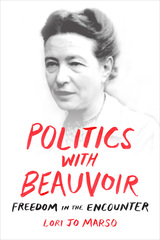 Politics with Beauvoir: Freedom in the Encounter
Lori Jo Marso
Duke University Press, 2017 In Politics with Beauvoir Lori Jo Marso treats Simone de Beauvoir's feminist theory and practice as part of her political theory, arguing that freedom is Beauvoir's central concern and that this is best apprehended through Marso's notion of the encounter. Starting with Beauvoir's political encounters with several of her key contemporaries including Hannah Arendt, Robert Brasillach, Richard Wright, Frantz Fanon, and Violette Leduc, Marso also moves beyond historical context to stage encounters between Beauvoir and others such as Chantal Akerman, Lars von Trier, Rahel Varnhagen, Alison Bechdel, the Marquis de Sade, and Margarethe von Trotta. From intimate to historical, always affective though often fraught and divisive, Beauvoir's encounters, Marso shows, exemplify freedom as a shared, relational, collective practice. Politics with Beauvoir gives us a new Beauvoir and a new way of thinking about politics—as embodied and coalitional.
Politics within the State: Elite Bureaucrats and Industrial Policy in Authoritarian Brazil
Ben Ross Schneider
University of Pittsburgh Press, 1991 Brazil was one of the most successful examples of state-led industrialization in the post-1945 era. Yet, on the surface, the Brazilian bureaucracy appears highly fragmented, personalized, and ad-hoc. Ben Ross Schneider looks behind this façade to explain how the Brazilian bureaucracy contributes to industrialization by analyzing career patterns and appointments which structure incentives and power more than formal organizations or institutions. Politics and personalism, of the right sort, Schneider argues, can in fact enhance policy effectiveness and state capacity.
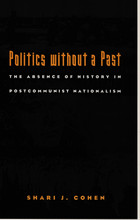 Politics without a Past: The Absence of History in Postcommunist Nationalism
Shari J. Cohen
Duke University Press, 1999 In Politics without a Past Shari J. Cohen offers a powerful challenge to
common characterizations of postcommunist politics as either a resurgence of
aggressive nationalism or an evolution toward Western-style democracy. Cohen
draws upon extensive field research to paint a picture of postcommunist
political life in which ideological labels are meaningless and exchangeable
at will, political parties appear and disappear regularly, and citizens
remain unengaged in the political process.
In contrast to the conventional wisdom, which locates the roots of widespread intranational strife in deeply rooted national identities from the past, Cohen argues that a profound ideological vacuum has fueled destructive tension throughout postcommunist Europe and the former Soviet Union. She uses Slovakia as a case study to reveal that communist regimes bequeathed an insidious form of historical amnesia to the majority of the political elite and the societies they govern. Slovakia was particularly vulnerable to communist intervention since its precommunist national consciousness was so weak and its only period of statehood prior to 1993 was as a Nazi puppet-state. To demonstrate her argument, Cohen focuses on Slovakia’s failure to forge a collective memory of the World War II experience. She shows how communist socialization prevented Slovaks from tying their individual family stories—of the Jewish deportations, of the anti-Nazi resistance, or of serving in the wartime government—to a larger historical narrative shared with others, leaving them bereft of historical or moral bearings.
Politics without a Past develops an analytical framework that will be important for future research in Eastern Europe, the former Soviet Union, and beyond. Scholars in political science, history, East European and post-Soviet studies will find Cohen’s methodology and conclusions enlightening. For policymakers, diplomats, and journalists who deal with the region, she offers valuable insights into the elusive nature of postcommunist societies.
Politics Without Parties: Massachusetts, 1780–1791
Van Beck Hall
University of Pittsburgh Press, 1972 In this book, Van Hall Beck demonstrates that prior to the development of American political parties in the 1790s, political conflicts reflected differences in the values of the entire society. They were rooted in human circumstances-social, economic, cultural-of all sectors of society, and they displayed an ordered, patterned and persistent quality. To illustrate his assessment, Hall sifts through extensive archival data on 343 towns and plantations in Massachusetts. By comparing rural to urban settings, agricultural to market economies, and differing levels of political and social networking, he effectively ties voting patterns to human circumstances at the town level, and then relates these to the overall social and political order of the Commonwealth.
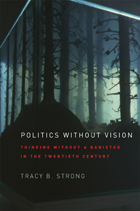 Politics without Vision: Thinking without a Banister in the Twentieth Century
Tracy B. Strong
University of Chicago Press, 2012 From Plato through the nineteenth century, the West could draw on comprehensive political visions to guide government and society. Now, for the first time in more than two thousand years, Tracy B. Strong contends, we have lost our foundational supports. In the words of Hannah Arendt, the state of political thought in the twentieth and twenty-first centuries has left us effectively “thinking without a banister.” Politics without Vision takes up the thought of seven influential thinkers, each of whom attempted to construct a political solution to this problem: Nietzsche, Weber, Freud, Lenin, Schmitt, Heidegger, and Arendt. None of these theorists were liberals nor, excepting possibly Arendt, were they democrats—and some might even be said to have served as handmaidens to totalitarianism. And all to a greater or lesser extent shared the common conviction that the institutions and practices of liberalism are inadequate to the demands and stresses of the present times. In examining their thought, Strong acknowledges the political evil that some of their ideas served to foster but argues that these were not necessarily the only paths their explorations could have taken. By uncovering the turning points in their thought—and the paths not taken—Strong strives to develop a political theory that can avoid, and perhaps help explain, the mistakes of the past while furthering the democratic impulse. Confronting the widespread belief that political thought is on the decline, Strong puts forth a brilliant and provocative counterargument that in fact it has endured—without the benefit of outside support. A compelling rendering of contemporary political theory, Politics without Vision is sure to provoke discussion among scholars in many fields.
 Politics, Writing, Mutilation: The Cases of Bataille, Blanchot, Roussel, Leiris, and Ponge
Allan Stoekl
University of Minnesota Press, 1985 Politics, Writing, Mutilation was first published in 1985. Minnesota Archive Editions uses digital technology to make long-unavailable books once again accessible, and are published unaltered from the original University of Minnesota Press editions. Five twentieth-century French writers played, and continue to play, a pivotal role in the development of literary-philosophical thinking that has come to be known in the United States as post-structuralism. The work of Georges Bataille, Maurice Blanchot, Raymond Roussel, Michel Leiris, and Francis Ponge in the 1930s and 1940s amounts to a prehistory of today's theoretical debates; the writings of Foucault and Derrida in particular would have been unthinkable outside the context provided by these writers. In Politics, Writing, Mutilation,Allan Stoekl emphasizes their role as precursors, but he also makes clear that they created a distinctive body of work that must be read and evaluated on its own terms. Stoekl's critical readings of their work—selected novels, poems, and autobiographical fragments—reveal them to be battlegrounds not only of disruptive language practices, but of conflicting political drives as well. These irreconcilable tendencies can be defined as progressive political revolution, on the one hand with its emphasis on utility, conservation, and labor; and, on the other hand, a notion of dangerous and sinister production that stresses orgiastic sexuality and delirious expenditure. Caught between these forces is the intellectual of Bataille's time (and indeed of ours), locked in impotence, self-betrayal, and automutilation. Stoekl develops his critique through dual readings of each writer's central work—the first reading deconstructive, the second a search for the political meaning excluded by a deconstructive approach. Repeating this process on a larger scale, he shows how Derrida and Foucault are indebted to their precursors even while they have betrayed them by stripping their work of political conflict and historical specificity. And he acknowledges that one of the most painful questions faced in prewar and Occupied France—that of the unthinkable guilt and duplicity of the intellectual—may not be as remote from contemporary theoretical concerns as some would have us believe.
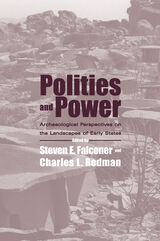 Polities and Power: Archaeological Perspectives on the Landscapes of Early States
Edited by Steven E. Falconer and Charles L. Redman
University of Arizona Press, 2009 This distinctive book is the first to address the topic of landscape archaeology in early states from a truly global perspective. It provides an excellent introduction to—and overview of—the discipline today. The volume grew out of the Fifth Biennial Meeting of the Complex Societies Group, whose theme, States and the Landscape, paid tribute to the work of Robert McC. Adams. When Adams began publishing in the 1960s, the interdependence of cities and their countrysides, and the information revealed through the spatial patterning of communities, went largely unrecognized. Today, as this useful collection makes clear, these interpretive insights are fundamental to all archaeologists who investigate the roles of complex polities in their landscapes.
Polities and Power features detailed studies from an intentionally disparate array of regions, including Mesoamerica, Andean South America, southwestern Asia, East Africa, and the Indian subcontinent. Each chapter or pair of chapters is followed by a critical commentary. In concert, these studies strive to infer social, political, and economic meaning from archaeologically discerned landscapes associated with societies that incorporate some expression of state authority. The contributions engage a variety of themes, including the significance of landscapes as they condition and reflect complex polities; the interplay of natural and cultural elements in defining landscapes of state; archaeological landscapes as ever-dynamic entities; and archaeological landscapes as recursive structures, reflected in palimpsests of human activity.
Individually, many of these contributions are provocative, even controversial. Taken together, they reveal the contours of landscape archaeology at this particular evolutionary moment.
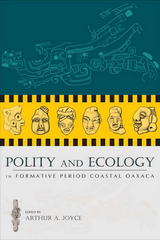 Polity and Ecology in Formative Period Coastal Oaxaca
Arthur A. Joyce
University Press of Colorado, 2012 Encapsulating two decades of research, Polity and Ecology in Formative Period Coastal Oaxaca is the first major treatment of the lower Río Verde region of Oaxaca, investigating its social, political, and ecological history. Tracing Formative period developments from the earliest known evidence of human presence to the collapse of Río Viejo (the region's first centralized polity), the volume synthesizes the archaeological and paleoecological evidence from the valley. This period saw the earliest agricultural settlements in the region as well as the origins of sedentism and social complexity, and witnessed major changes in floodplain and coastal environments that expanded the productivity of subsistence resources. The book addresses theoretically significant questions of broad relevance such as the origins and spread of agriculture, the social negotiation of complex political formations, the effects of long-distance trade and interaction, the macroregional effects of landscape change, and prehispanic ideology and political power. Focusing on questions of interregional interaction, environmental change, and political centralization, Polity and Ecology in Formative Period Coastal Oaxaca provides a comprehensive understanding of the Formative period archaeology of this important and long neglected region of Oaxaca.
Polity, volume 53 number 4 (October 2021)
The University of Chicago Press
University of Chicago Press Journals, 2021 This is volume 53 issue 4 of Polity. Polity, the journal of the Northeastern Political Science Association, has been published quarterly since 1968. Among the leading general-interest journals in political science, Polity is guided by the premise that political knowledge advances through scholarly exchange across subfield boundaries and even beyond disciplinary borders. Polity publishes original research on all aspects of political life, especially those that converge around questions of race, gender, class, colonialism, and empire.
Polity, volume 54 number 1 (January 2022)
The University of Chicago Press
University of Chicago Press Journals, 2022 This is volume 54 issue 1 of Polity. Polity, the journal of the Northeastern Political Science Association, has been published quarterly since 1968. Among the leading general-interest journals in political science, Polity is guided by the premise that political knowledge advances through scholarly exchange across subfield boundaries and even beyond disciplinary borders. Polity publishes original research on all aspects of political life, especially those that converge around questions of race, gender, class, colonialism, and empire.
Polity, volume 54 number 2 (April 2022)
The University of Chicago Press
University of Chicago Press Journals, 2022 This is volume 54 issue 2 of Polity. Polity, the journal of the Northeastern Political Science Association, has been published quarterly since 1968. Among the leading general-interest journals in political science, Polity is guided by the premise that political knowledge advances through scholarly exchange across subfield boundaries and even beyond disciplinary borders. Polity publishes original research on all aspects of political life, especially those that converge around questions of race, gender, class, colonialism, and empire.
Polity, volume 54 number 3 (July 2022)
The University of Chicago Press
University of Chicago Press Journals, 2022 This is volume 54 issue 3 of Polity. Polity, the journal of the Northeastern Political Science Association, has been published quarterly since 1968. Among the leading general-interest journals in political science, Polity is guided by the premise that political knowledge advances through scholarly exchange across subfield boundaries and even beyond disciplinary borders. Polity publishes original research on all aspects of political life, especially those that converge around questions of race, gender, class, colonialism, and empire.
Polity, volume 54 number 4 (October 2022)
The University of Chicago Press
University of Chicago Press Journals, 2022 This is volume 54 issue 4 of Polity. Polity, the journal of the Northeastern Political Science Association, has been published quarterly since 1968. Among the leading general-interest journals in political science, Polity is guided by the premise that political knowledge advances through scholarly exchange across subfield boundaries and even beyond disciplinary borders. Polity publishes original research on all aspects of political life, especially those that converge around questions of race, gender, class, colonialism, and empire.
Polity, volume 55 number 1 (January 2023)
The University of Chicago Press
University of Chicago Press Journals, 2023 This is volume 55 issue 1 of Polity. Polity, the journal of the Northeastern Political Science Association, has been published quarterly since 1968. Among the leading general-interest journals in political science, Polity is guided by the premise that political knowledge advances through scholarly exchange across subfield boundaries and even beyond disciplinary borders. Polity publishes original research on all aspects of political life, especially those that converge around questions of race, gender, class, colonialism, and empire.
Polity, volume 55 number 2 (April 2023)
The University of Chicago Press
University of Chicago Press Journals, 2023 This is volume 55 issue 2 of Polity. Polity, the journal of the Northeastern Political Science Association, has been published quarterly since 1968. Among the leading general-interest journals in political science, Polity is guided by the premise that political knowledge advances through scholarly exchange across subfield boundaries and even beyond disciplinary borders. Polity publishes original research on all aspects of political life, especially those that converge around questions of race, gender, class, colonialism, and empire.
Polity, volume 55 number 3 (July 2023)
The University of Chicago Press
University of Chicago Press Journals, 2023 This is volume 55 issue 3 of Polity. Polity, the journal of the Northeastern Political Science Association, has been published quarterly since 1968. Among the leading general-interest journals in political science, Polity is guided by the premise that political knowledge advances through scholarly exchange across subfield boundaries and even beyond disciplinary borders. Polity publishes original research on all aspects of political life, especially those that converge around questions of race, gender, class, colonialism, and empire.
Polity, volume 55 number 4 (October 2023)
The University of Chicago Press
University of Chicago Press Journals, 2023 This is volume 55 issue 4 of Polity. Polity, the journal of the Northeastern Political Science Association, has been published quarterly since 1968. Among the leading general-interest journals in political science, Polity is guided by the premise that political knowledge advances through scholarly exchange across subfield boundaries and even beyond disciplinary borders. Polity publishes original research on all aspects of political life, especially those that converge around questions of race, gender, class, colonialism, and empire.
Polity, volume 56 number 1 (January 2024)
The University of Chicago Press
University of Chicago Press Journals, 2024 This is volume 56 issue 1 of Polity. Polity, the journal of the Northeastern Political Science Association, has been published quarterly since 1968. Among the leading general-interest journals in political science, Polity is guided by the premise that political knowledge advances through scholarly exchange across subfield boundaries and even beyond disciplinary borders. Polity publishes original research on all aspects of political life, especially those that converge around questions of race, gender, class, colonialism, and empire.
Polity, volume 56 number 2 (April 2024)
The University of Chicago Press
University of Chicago Press Journals, 2024 This is volume 56 issue 2 of Polity. Polity, the journal of the Northeastern Political Science Association, has been published quarterly since 1968. Among the leading general-interest journals in political science, Polity is guided by the premise that political knowledge advances through scholarly exchange across subfield boundaries and even beyond disciplinary borders. Polity publishes original research on all aspects of political life, especially those that converge around questions of race, gender, class, colonialism, and empire.
Polity, volume 56 number 3 (July 2024)
The University of Chicago Press
University of Chicago Press Journals, 2024 This is volume 56 issue 3 of Polity. Polity, the journal of the Northeastern Political Science Association, has been published quarterly since 1968. Among the leading general-interest journals in political science, Polity is guided by the premise that political knowledge advances through scholarly exchange across subfield boundaries and even beyond disciplinary borders. Polity publishes original research on all aspects of political life, especially those that converge around questions of race, gender, class, colonialism, and empire.
Polity, volume 56 number 4 (October 2024)
The University of Chicago Press
University of Chicago Press Journals, 2024 This is volume 56 issue 4 of Polity. Polity, the journal of the Northeastern Political Science Association, has been published quarterly since 1968. Among the leading general-interest journals in political science, Polity is guided by the premise that political knowledge advances through scholarly exchange across subfield boundaries and even beyond disciplinary borders. Polity publishes original research on all aspects of political life, especially those that converge around questions of race, gender, class, colonialism, and empire.
Polity, volume 57 number 1 (January 2025)
The University of Chicago Press
University of Chicago Press Journals, 2025 This is volume 57 issue 1 of Polity. Polity, the journal of the Northeastern Political Science Association, has been published quarterly since 1968. Among the leading general-interest journals in political science, Polity is guided by the premise that political knowledge advances through scholarly exchange across subfield boundaries and even beyond disciplinary borders. Polity publishes original research on all aspects of political life, especially those that converge around questions of race, gender, class, colonialism, and empire.
Polity, volume 57 number 2 (April 2025)
The University of Chicago Press
University of Chicago Press Journals, 2025 This is volume 57 issue 2 of Polity. Polity, the journal of the Northeastern Political Science Association, has been published quarterly since 1968. Among the leading general-interest journals in political science, Polity is guided by the premise that political knowledge advances through scholarly exchange across subfield boundaries and even beyond disciplinary borders. Polity publishes original research on all aspects of political life, especially those that converge around questions of race, gender, class, colonialism, and empire.
Polity, volume 57 number 3 (July 2025)
The University of Chicago Press
University of Chicago Press Journals, 2025 This is volume 57 issue 3 of Polity. Polity, the journal of the Northeastern Political Science Association, has been published quarterly since 1968. Among the leading general-interest journals in political science, Polity is guided by the premise that political knowledge advances through scholarly exchange across subfield boundaries and even beyond disciplinary borders. Polity publishes original research on all aspects of political life, especially those that converge around questions of race, gender, class, colonialism, and empire.
Polity, volume 57 number 4 (October 2025)
The University of Chicago Press
University of Chicago Press Journals, 2025 This is volume 57 issue 4 of Polity. Polity, the journal of the Northeastern Political Science Association, has been published quarterly since 1968. Among the leading general-interest journals in political science, Polity is guided by the premise that political knowledge advances through scholarly exchange across subfield boundaries and even beyond disciplinary borders. Polity publishes original research on all aspects of political life, especially those that converge around questions of race, gender, class, colonialism, and empire.
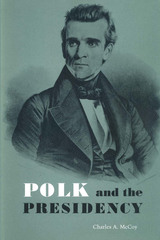 Polk and the Presidency
By Charles A. McCoy
University of Texas Press, 1960 “Who is James K. Polk?” was a rallying cry of the Whigs during the campaign of 1844. Polk answered that question adequately by winning the election against his Whig opponent, Henry Clay. Today the question might be recast—respectfully, not derisively—“Who was James K. Polk?” Few persons could give more than a perfunctory answer, even though when he left office the United States was half again larger than it was when he became president. Polk, unlike his close friend Andrew Jackson, has been the subject of but few books. Stern and serious-minded, intent upon his work, he never caught the public’s imagination as did some of the more magnetic personalities who filled the office of president. His lack of personal charm, however, should not hide from generations of Americans the great benefit he brought their country and his key role in developing the powers of the presidency. This book will be a revelation to readers who might be confounded, even momentarily, by the question “Who was James K. Polk?” It is based on the assumption that the presidential power-role, though expressed in the Constitution and prescribed by law, is not a static role but a dynamic one, shaped and developed by a president’s personal reaction to the crises and circumstances of the times during which he serves. And Polk faced many crises, among them the Mexican War, the Oregon boundary dispute, the tariff question, Texas’s admission to the Union, and the establishment by the United States of a more stable and respected position in the world of nations. Based on the dynamic power-role theory, the book analyzes its theme of how and why James K. Polk, the eleventh president of the United States, responded to the challenges of his times and thereby increased the authority and importance of the presidential role for future incumbents. Charles McCoy became interested in writing this book after two of his friends, both informed historians, pointed out to him that James K. Polk was a neglected figure in American history. Preliminary research showed this to be true, but without reason—for, as the eminent historian George Bancroft said, “viewed from the standpoint of results, [Polk’s administration] was perhaps the greatest in our national history, certainly one of the greatest.” For his own astute appraisal of the Polk administration, McCoy emphasized the use of firsthand sources of information: the Polk Diary; newspapers of the period; the unpublished papers of Polk, Jackson, Trist, Marcy, and Van Buren; and congressional documents and reports.
Polka Heartland: Why the Midwest Loves to Polka
Rick March
Wisconsin Historical Society Press, 2015 "Polka Heartland" captures the beat that pulses in the heart of Midwestern culture--the polka--and offers up the fascinating history of how "oompah-pah" came to be the sound of middle America. From the crowded dance tent at Pulaski Polka Days to an off-the-grid Mexican polka dance in small-town Wisconsin, "Polka Heartland" explores the people, places, and history behind the Midwest's favorite music. From polka's surprising origin story as a cutting-edge European fad to an exploration of the modern-day polka scene, author Rick March and photographer Dick Blau take readers on a joyful romp through this beloved, unique, and richly storied genre. "Polka Heartland" describes the artists, venues, instruments, and music-makers who have been pivotal to polka's popularity across the Midwest and offers six full-color photo galleries to immerse readers in today's vibrant polka scene.
The Polkinghorne Reader: Science, Faith, and the Search for Meaning
John C. Polkinghorne
Templeton Press, 2010 The Revd. Dr. John Polkinghorne is a world-renowned authority in the field of science and religion. His numerous books in this area, written over the past three decades, have been hugely influential. The Polkinghorne Reader brings together key extracts from his writings on core issues such as the nature of science, the physical world, human nature, love, theology, creation, providence, prayer and miracle, time, evil, Jesus, the resurrection, the Trinity, eschatology, and world faiths.
Ideal for readers who are new to Polkinghorne or who are just beginning to explore the interplay between science and religion, this collection will also be welcomed by all who have read his earlier works but would like one handy resource that presents the major facets of his thought in an accessible and systematic fashion.
The Pollen Wasps: Ecology and Natural History of the Masarinae
Sarah Gess
Harvard University Press, 1996 The 25 color plates and 60 black-and-white illustrations offer readers a rare close look at this little-known and endangered group of insects. Three appendixes list all known flower-visiting records, all hymenopteran visitors to the flowers included in the pollination chapter, and all published species names for Masarinae. Pollen wasps are of interest to a wide range of scholars (including entomologists, ethologists, ecologists, and evolutionary biologists) because of their close associations with flowering plants and because of the ability of certain species to produce silk for nest building--an intriguing case of convergent evolution. For these readers, and for students of natural history and proponents of species preservation, The Pollen Wasps will prove an invaluable resource.
 Pollination Power
Heather Angel
University of Chicago Press, 2016 From the wings of moths to the feet of hoverflies and the head feathers of nectar-seeking birds, the process of pollination is a natural marvel. How do the many annuals and perennials and shrubs and trees that populate the globe manage to lure the aid of bees and butterflies and other creatures at exactly the appropriate time? Pollination Power offers a unique, truly bird’s-eye view of the wonders of pollination at work.
In stunning full-color images, employing the latest photographic techniques, esteemed photographer Heather Angel has captures the intimate interactions of plants with their floral pollinators. The plants come not only from Angel’s Surrey backyard and the Royal Botanic Garden at Kew, but from twenty countries where Angel has travelled—from the rich floral kingdoms of the Cape of South Africa to the diversity of China and the Americas. The photos illustrate the varied techniques that flowers use to communicate with their pollinators. Some, for example, change color when the flower no longer has rewards to offer. Others control precisely when pollinators enter or leave by timing when they open and close their petals or when they emit a scent. This fascinating array of pollination repertoires crossfertilizes Angel’s photos with a descriptive text.
Featuring both common and exotic plants and temperate and tropical floral, Pollination Power will entice anyone with a passion for botanicals, from gardeners to botanists alike.
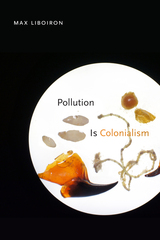 Pollution Is Colonialism
Max Liboiron
Duke University Press, 2021 In Pollution Is Colonialism Max Liboiron presents a framework for understanding scientific research methods as practices that can align with or against colonialism. They point out that even when researchers are working toward benevolent goals, environmental science and activism are often premised on a colonial worldview and access to land. Focusing on plastic pollution, the book models an anticolonial scientific practice aligned with Indigenous, particularly Métis, concepts of land, ethics, and relations. Liboiron draws on their work in the Civic Laboratory for Environmental Action Research (CLEAR)—an anticolonial science laboratory in Newfoundland, Canada—to illuminate how pollution is not a symptom of capitalism but a violent enactment of colonial land relations that claim access to Indigenous land. Liboiron's creative, lively, and passionate text refuses theories of pollution that make Indigenous land available for settler and colonial goals. In this way, their methodology demonstrates that anticolonial science is not only possible but is currently being practiced in ways that enact more ethical modes of being in the world.
 Pollution, Politics, and Power: The Struggle for Sustainable Electricity
Thomas O. McGarity
Harvard University Press, 2019 The electric power industry has been transformed over the past forty years, becoming more reliable and resilient while meeting environmental goals. A big question now is how to prevent backsliding.
Pollution, Politics, and Power tells the story of the remarkable transformation of the electric power industry over the last four decades. Electric power companies have morphed from highly polluting regulated monopolies into competitive, deregulated businesses that generate, transmit, and distribute cleaner electricity. Power companies are investing heavily in natural gas and utility-scale renewable resources and have stopped building new coal-fired plants. They facilitate end-use efficiency and purchase excess electricity produced by rooftop solar panels and backyard wind turbines, helping to reduce greenhouse-gas emissions.
But these beneficial changes have come with costs. The once-powerful coal industry is on the edge of ruin, with existing coal-fired plants closing and coal mines shutting down. As a result, communities throughout Appalachia suffer from high unemployment and reduced resources, which have exacerbated a spiraling opioid epidemic. The Trump administration’s efforts to revive the coal industry by scaling back environmental controls and reregulating electricity prices have had little effect on the coal industry’s decline.
Major advances therefore come with warning signs, which we must heed in charting the continuing course of sustainable electricity. In Pollution, Politics, and Power, Thomas O. McGarity examines the progress made, details lessons learned, and looks to the future with suggestions for building a more sustainable grid while easing the economic downsides of coal’s demise.
|
|
